
THE REGIMENTAL MAGAZINE OF THE LIFE GUARDS
Colonel-in-Chief:
Colonel



THE REGIMENTAL MAGAZINE OF THE LIFE GUARDS
Colonel-in-Chief:
Colonel

By THE COMMANDING OFFICER
Lt. Col
1983, our last year in Germany on this present tour, has been interesting and varied. Band D Squadrons training in Canada, attached to The Royal Hussars and The Worcester and Sherwood Foresters respectively. The Regimental annual outing to Soltau in January included troop tests. A most creditable performance by the shooting team, who are to be congratulated on bringing home the Cambridge Shield from Bisley. Two weeks of gunnery on Hohne Ranges, where a new fire and movement exercise was successfully tried out. Three weeks of umpiring on the 1st Division FTX, and all the normal day-to-day events that a year in the British Army of the Rhine brings, such as special site guards, call outs, inspections and lastly a 100% REME inspection prior to handover to The Blues and Royals. Visitors to the Regiment have included The Gold Stick, The Secretary of State for Defence, The Commander in Chief, the new Corps Commander, The Major General and a host of other Senior and Junior Officers.
On the sporting front, Headquarters Squadron put up a very creditable performance in the Corps First Aid Competition, the Connaught Shield. The Pentathlon, Tetrathlon and Triathlon teams all did well. Individuals such as LCoH Margan at fencing and Tpr Gregory at swimming, continued to achieve good results. The stables had another satisfactory year in the BAOR round of Hunter Trials and events. The Polo Team were unluckily beaten in the InterRegimental by the 14th/20th Kings Hussars, but won the Captains' and Subalterns' Cup by defeating the Scots Dragoon Guards. The Weser Vale bloodhounds under the expert hand of Lt John Sunnucks have flourished.
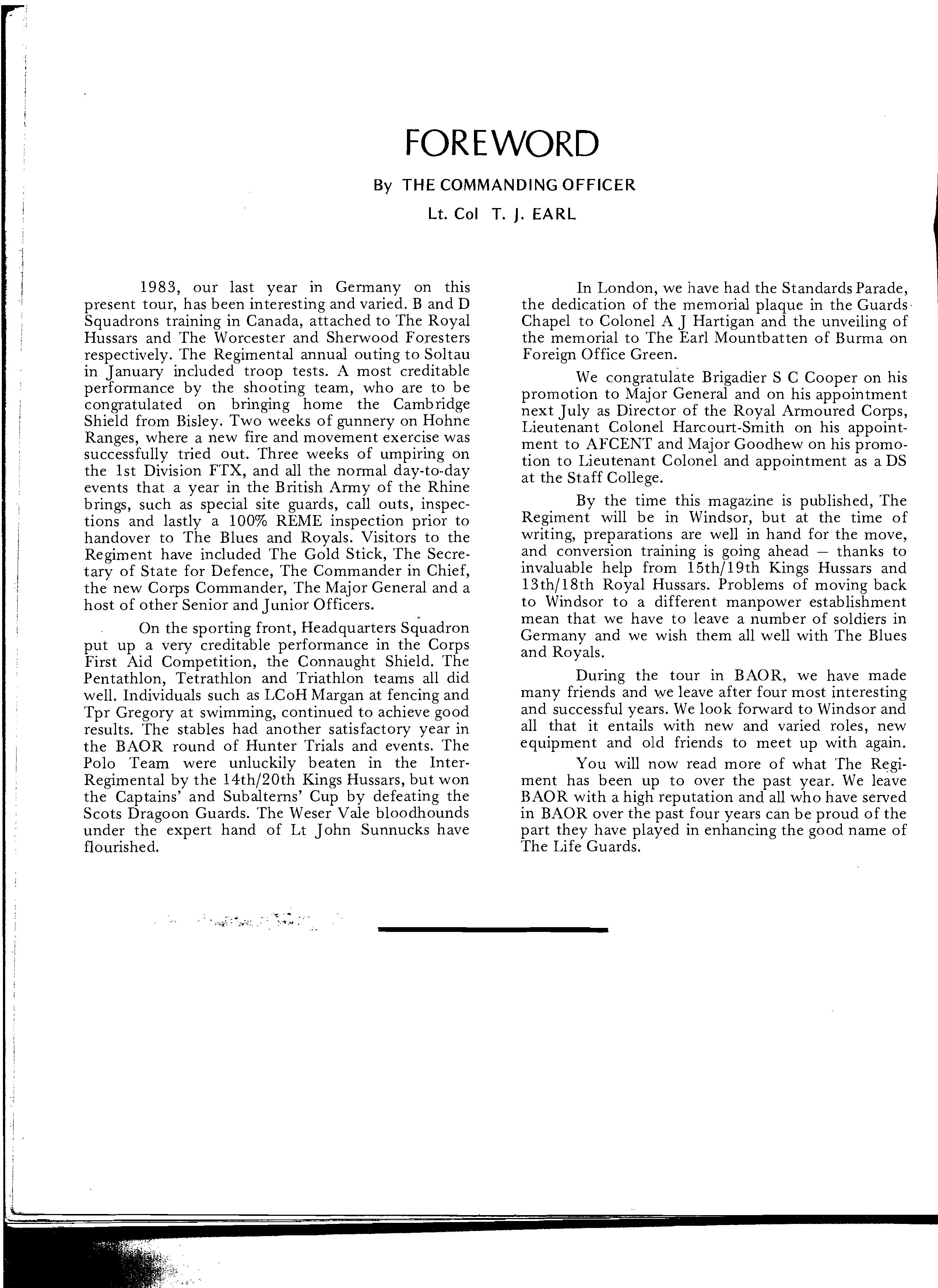
In London, we have had the Standards Parade, the dedication of the memorial plaque in the Guards· Chapel to Colonel A J Hartigan and the unveiling of the memorial to The Earl Mountbatten of Burma on Foreign Office Green.
We congratulate Brigadier S C Cooper on his promotion to Major General and on his appointment next July as Director of the Royal Armoured Corps, Lieutenant Colonel Harcourt-Smith on his appointment to AFCENT and Major Goodhew on his promotion to Lieutenant Colonel and appointment as aDS at the Staff College.
By the time this magazine is published, The Regiment will be in Windsor, but at the time of writing, preparations are well in hand for the move, and conversion training is going ahead - thanks to invaluable help from 15th/19th Kings Hussars and 13th/18th Royal Hussars. Problems of moving back to Windsor to a different manpower establishment mean that we have to leave a number of soldiers in Germany and we wish them all well with The Blues and Royals.
During the tour in BAOR, we have made many friends and we leave after four most interesting and successful years. We look forward to Windsor and all that it entails with new and varied roles, new equipment and old friends to meet up with again.
You will now read more of what The Regiment has been up to over the past year. We leave BAOR with a high reputation and all who have served in BAOR over the past four years can be proud of the part they have played in enhancing the good name of The Life Guards.
In December we welcomed SCM Alien from Knightsbridge and SQMC Belza from C Squadron. Captain Graham forsook Two Troop for C Squadron and "'as replaced by 2 Lt Ley.
The year got off to a good start with troop training on Soltau. The weather was poor but the squad.ron spirit prevailed and each troop produced its O\':n brand of humour for the various demonsua iOl s. T le culmination of the fortnight was a hour Troop Test Exercise, involving all l. l: had bee 1 practiced.
C, -ain \\'aterhouse left us for JDSC in March ana .,5 replaced by Captain Hewitt who arrived :' e to help us paint the tanks white for a hour snow camouflage exercise. It was d in.;r :his exercise that the Squadron achieved .::... e by appearing on television during the 0: De:-ence, Mr Heseltine's visit to BAOR.
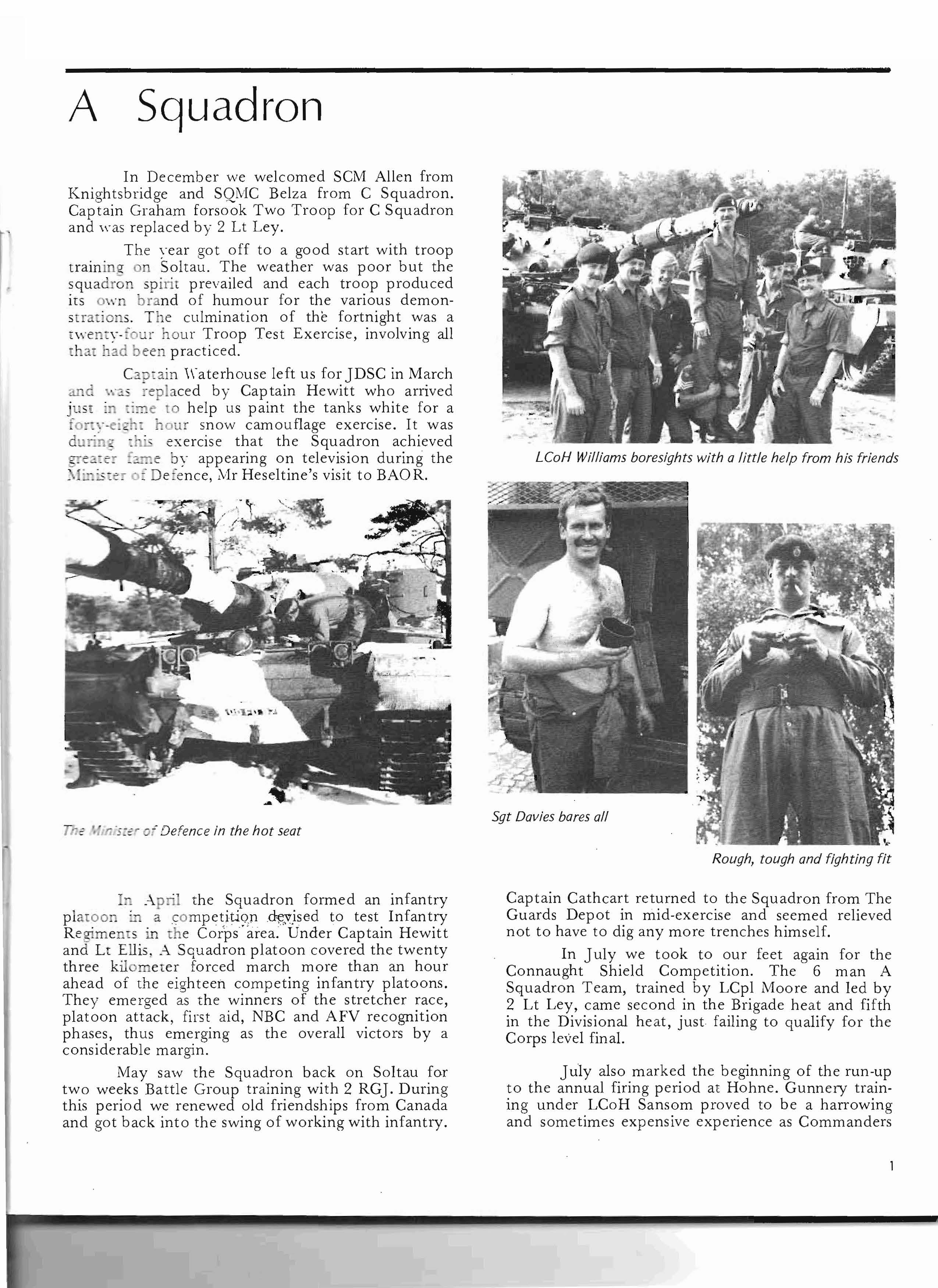
_\pril the Squadron formed an infantry plawol1 :... a to test Infantry Regime s in The Corps 'area. Under Captain Hewitt and LT Ellis, A. Squadron platoon covered the twenty three kil meter forced march more than an hour ahead of the eighteen competing infantry platoons. They emerged as the winners of the stretcher race, platoon attack, first aid, NBC and AFV recognition phases, thus emerging as the overall victors by a considerable margin.
May saw the Squadron back on Soltau for two weeks Battle Group training with 2 RGJ. During this period we renewed old friendships from Canada and got back into the swing of working with infantry.
Captain Cathcart returned to the Squadron from The Guards Depot in mid-exercise and seemed relieved not to have to dig any more trenches himself.
In July we took to our feet again for the Connaught Shield Competition. The 6 man A Squadron Team, trained by LCpl Moore and led by 2 Lt Ley, came second in the Brigade heat and fifth in the Divisional heat, just failing to qualify for the Corps level final.
July also marked the beginning of the run-up to the annual firing period at Hohne. Gunnery training under LCoH Sansom proved to be a harrowing and sometimes expensive experience as Commanders
-: contributing bottles of beer for gng the flags' or other minor misdemean__ (fd a very thorough job however and this _ :. once on the firing points. The recruit l P an excellent performance and gained "l 'ence .
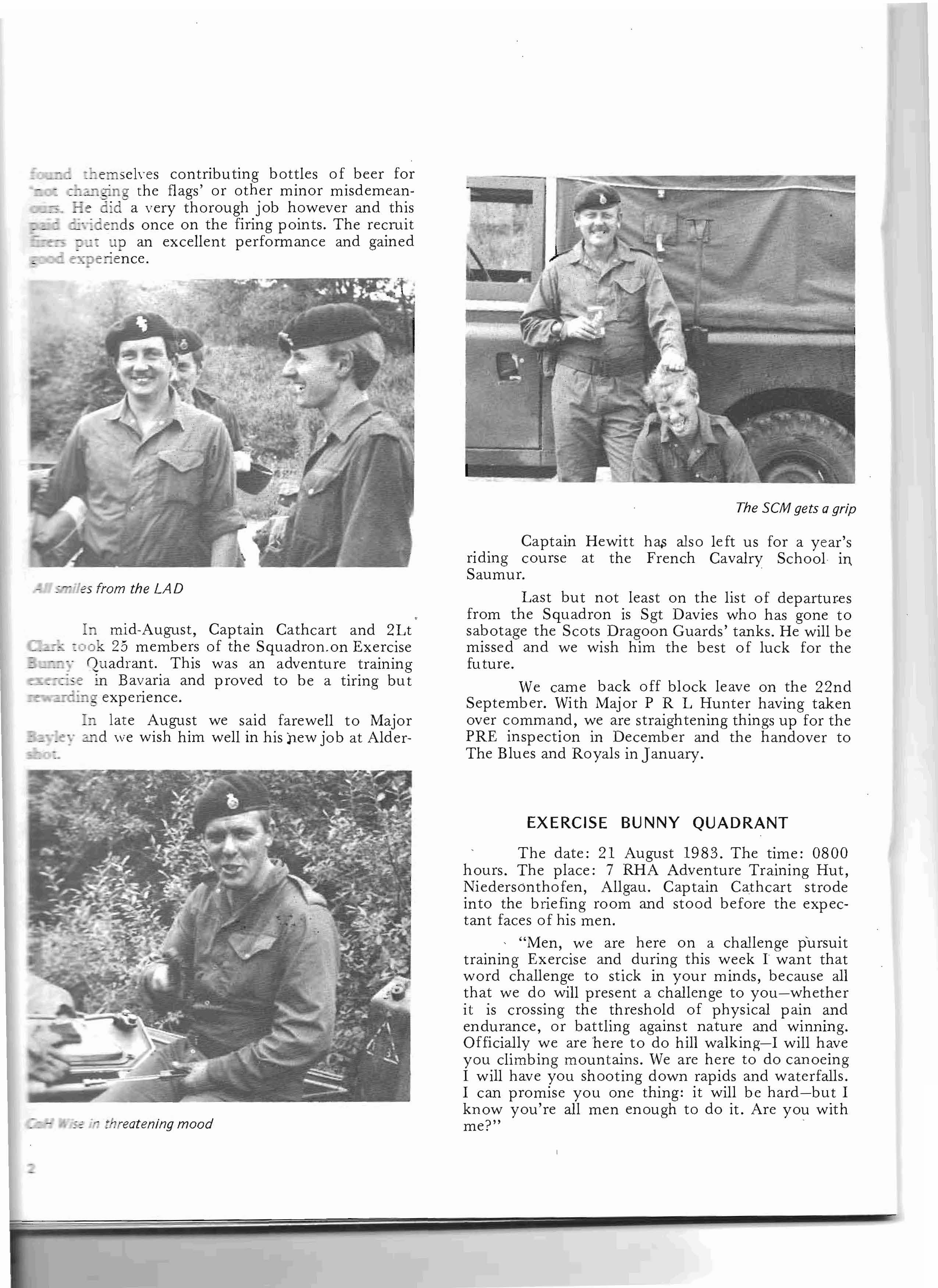
iles from the LA D
In mid-August, Captain Cathcart and 2Lt --.::-'0>. :ook 25 members of the Squadron,on Exercise r"2uadrant. This was an adventure training
• __ L:.oe in Bavaria and proved to be a tiring but g experience.
L late August we said farewell to Major . 2....1d we wish him well in his jiew job at Alder-
The SCM gets a grip
Captain Hewitt has also left us for a year's riding course at the French Cavalry School in. Saumur.
Last but not least on the list of departures from the Squadron is Sgt Davies who has gone to sabotage the Scots Dragoon Guards' tanks. He will be missed and we wish him the best of luck for the future .
We came back off block leave on the 22nd September. With Major P R L Hunter having taken over command, we are straightening things up for the PRE inspection in December and the handover to The Blues and Royals in January.
The date: 21 August 1983. The time: 0800 hours. The place: 7 RHA Adventure Training Hut, Niedersonthofen, Allgau. Captain Cathcart strode into the briefing room and stood before the expectant faces of his men.
. "Men, we are here on a challenge pursuit training Exercise and during this week 1 want that word challenge to stick in your minds, because all that we do will present a challenge to you-whether it is crossing the threshold of physical pain and endurance, or battling against nature and winning. Officially we are here to do hill walking-I will have you climbing mountains. We are here to do canoeing I will have you shooting down rapids and waterfalls. I can promise you one thing: it will be hard-but I know you're all men enough to do it. Are you with me?" :.; " threatening mood
spoke, nobody smiled, quite clearly nobod was with him. "Okay then, if you don't \ ant to do that, let's go down to the topless beach, catch some rays, cruise some chicks and get some of this local hooch down our throats". Thus it began.
Exercise Bunny Quadrant involved 24 members of A, Squadron and one frollf C Squadron in a wee' 0 arduous Adventure Training. They were based in a spacious and comfortable 'hut' overlookina the a picturesque lake no able or i . topless beach and the easily-accessible beer supply. Captain Cathcart led the expedition and 2Lt CarT was the 21/C. Instructors were as follows: Hill walking-SCpl Belza, Caneoing-Tpr Cobb (C Sqn), E te ainment (liquid)-CoH Stephenson. app :ed themselves more diligently to their -as'· . 2Jl CoH Stephenson!
Ha\ing arrived on the evening of the 20th A g-- unday the 21st was the first day of Adven l. .-\cr\ity. The men paddled about in the lake, J:::2C. so e beer, canoed, had some beer, sunbathed, . ac some beer, swam in the beer, had some water-all da.- o' The day was voted a great success, particu.y . ended at the Kempten Bierfest. Smithers disgT2c 'himself by making improper suggestions to a:e e member of the 'oompah' band, which she seemeci. '0 enjoy. Corporal Farrell did the same, s.e didn't enjoy. Douglas danced all night long \ 'r' a ten year old girl who thought he was John T \'ol-a. Ire returned her white stick and guide nog oe"ore ,,-e departed.
.105' of the party were suffering from selfinllic:eci. ,'ounds on Monday morning. However, it ,,'as nec:deci -hat an energetic day was in order. .-\rme6 ".-:.' ,,'ind surfers and canoes everyone desce den OD The .-\lpsee, where they wrought havoc amo .g": .' e peaceful topless ladies of the area. Tpr P' :'p was so successful at windsurfing that he
sailed across to the opposite side of the lake-but couldn't get back. Tpr Carey had to tow him back with a canoe.
Throughout the day, CoH Stephenson gave instruction in his particular field and ensured that everyone was well qualified by the evening. The only exceptions were LCpl Stillwell and Smithers who, as drivel's, were excluded and had to carry CoH Stephenson back to the 4 tonner.
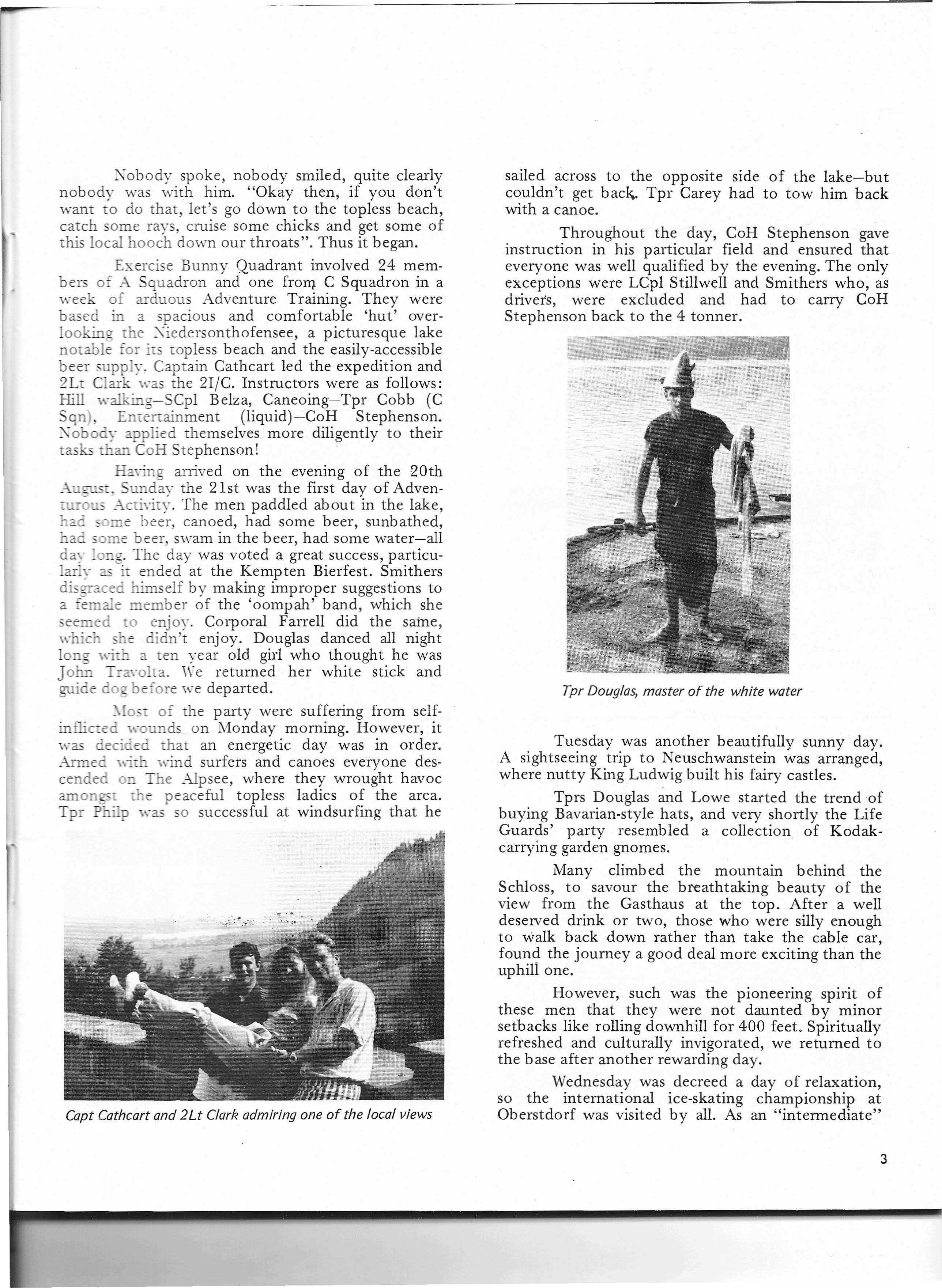
Tuesday was another beautifully sunny day. A sightseeing trip to Neuschwanstein was arranged, where nutty King Ludwig built his fairy castles.
Tprs Douglas and Lowe started the trend of buying Bavarian-style hats, and very shortly the Life Guards' party resembled a collection of Kodakcarrying garden gnomes.
Many climbed the mountain behind the Schloss, to savour the breathtaking beauty of the view from the Gasthaus at the top. After a well deserved drink or two, those who were silly enough to walk back down rather than take the cable car, found the journey a good deal more exciting than the uphill one.
However, such was the pioneering spmt of these men that they were not daunted by minor setbacks like rolling downhill for 400 feet. Spiritually refreshed and culturally invigorated, we returned to the base after another rewarding day.
Wednesday was decreed a day of relaxation, so the international ice-skating championship at Oberstd orf was visited by all. As an "intermediate"
competition the contestants were aged from 15-22 years old, although J ayne Torville and Christopher Dean made a guest appearance. Tpr Leafe found out that the average age of the skaters was sixteen, and he soon became an enthusiastic spectator and expert on the sport. The boys gave strong vocal support to the British Team, while the orc and the 2I/C indulged in social intercourse with the American, Finnish and Australian girls-much to the displeasure of their trainers who suspected that their interest was not purely social!
Thursday was "hill-walking" day, although under SCpl Belza's instruction the "short walk - across the hills to Austria" became a mountaineering expedition. Despite the overcast day, the view from the top across the Austrian border was marvellous and made the long, sweaty trek up mountain paths worthwhile. At the Gasthaus near the border, a very determined donkey ambled around eating everyone's picnics, whether they liked it or not. As soon as any food appeared, so did the donkey. He would grin at you, and then taking advantage of your momentary surprise, he would remove the cheese sandwich from your plate. One gulp and it was gone-along with the donkey in search of fresh victims.
On Friday, we all went to see Lake Konstanz. It was still there so we came back. On Saturday we had to leave for sunny Detmold, but not before one last relaxing morning catching the rays on yet another
B Squadron has again had a full year, our last for this tour in Germany, taking us from the ruts and slush of Soltau to the heat and dust of BATUS.
The year started, as it did for the whole : S.0 1tau for troop. tests. The trammg was conducted wIth the usual flaIr and panache that one always associates with B Squadron, added to which the "Leader" entertained us with one or two of his small parties. This recipe must have had a good effect on us all, as 4 Troop, under the leadership of Lt Stibbe and CoHJordan, came out on top when all the scores were added up.
There now followed a couple of months in Detmold before we had to think about BATUS with the RH Battle Group. During this time, members of the Squadron got out and about with a Snow Queen, a trip to Berlin and a very welcome visit to a VW factory to name but a few of our extra-curricular
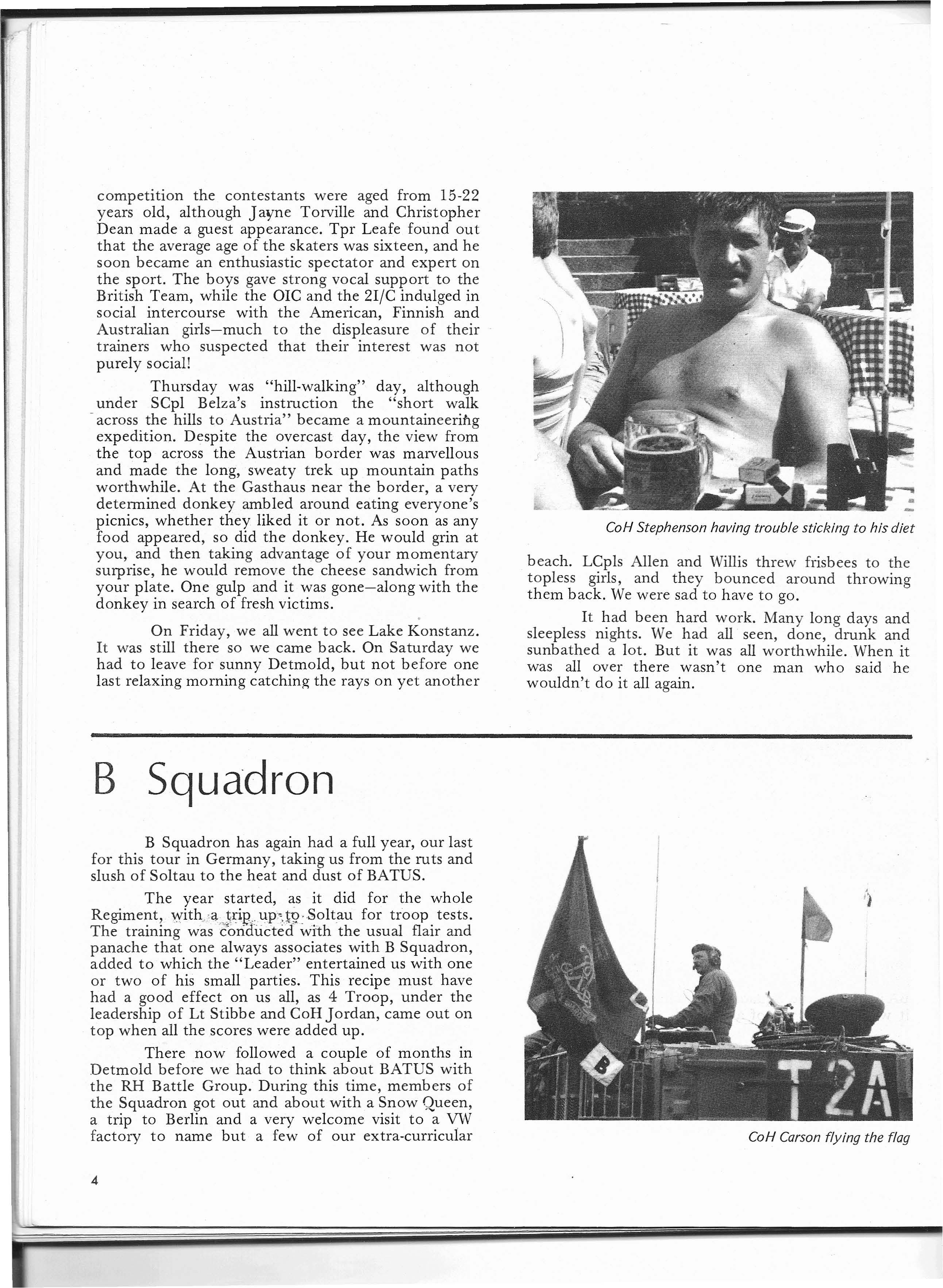
beach. LCpls AlIen and Willis threw frisbees to the topless girls, and they bounced around throwing them back. We were sad to have to go.
It had been hard work. Many long days and sleepless nights. We had all seen, done, drunk and sunbathed a lot. But it was all worthwhile. When it was all over there wasn't one man who said he wouldn't do it all again.
activitIes. Our peaceful time was soon over and our two weeks on Soltau for pre-BATUS training came round all too quickly. The Battle Group was made up of a \'ery mixed bunch - Life Guards, Royal Hussars, Coldstream Guards and Greenjackets. Due to the new idea of splitting up Battle Groups, and with the Squadron \\'Ql'king almost full time with the RGJ Coy, our Sqn/Coy Group soon became known as The Life J acke 5,
Our uaining programme was split up by a two-daY demo for the NATO Council. This was a day's and then the demo itself. The Squadron had 0 do a Bridge Crossing, followed by a BG attac - on the strip wood. After the crossing we picked u? a \ 'IP per tank, took them to our fire base, and ::' er. 0 0 the re-org for a cup of tea and a chat \\. - -' e quadron. It seems that we impressed the powe;s mat be, who came in force, with the man· oe \ces; cnd the VIPs, headed by Dr Lunns, seemed ° eD'o.- .. ei· tea.
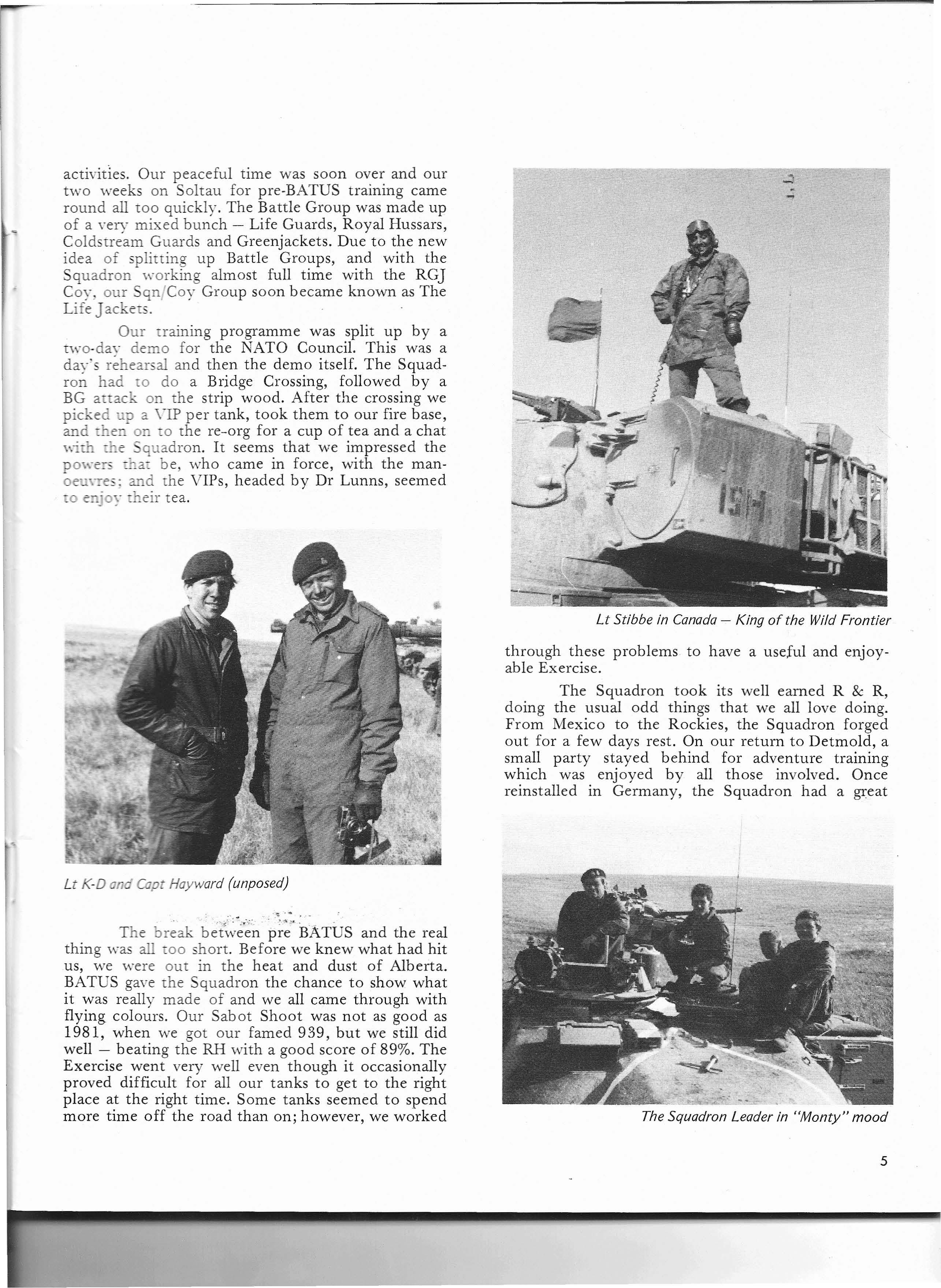
The break pre BATUS and the real thing \\'as all 00 short. Before we knew what had hit us, we were out in the heat and dust of Alberta. BATUS gave the Squadron the chance to show what it was really made of and we all came through with flying colours. Our Sabot Shoot was not as good as 1981, when we got our famed 939, but we still did well - beating the RH with a good score of 89%. The Exercise went very well even though it occasionally proved difficult for all our tanks to get to the right place at the right time. Some tanks seemed to spend more time off the road than on; however, we worked
through these problems to have a useful and enjoy· able Exercise.
The Squadron took its well earned R & R, doing the usual odd things that we all love doing. From Mexico to the Rockies, the Squadron forged out for a few days rest. On our return to Detmold, a small party stayed behind for adventure training which was enjoyed by all those involved. Once reinstalled in Germany, the Squadron had a great
The year started with Regimental Troop Tests on Soltau, and as years have a habit of starting in January, this proved to be an uncomfortably cold affair. None of us were under any illusions when we were greeted by a force eight blizzard as we climbed out of the buses, apart from SQMC Cusick who proceeded to erect a -palatial base camp with the assistance of his 'Merry Band of Men'. Anybody who ever grudges time spent on good administration in the field should take note that the SOMC's Palace not only kept people warm and dry (and therefore happy), it also provided a valuable training complex for the troops working into the early hours, and must have contributed to C Squadron's excellent results. One Troop under Mr Sunnucks, Two Troop under CoH Carter, and Four Troop under CoH Coffey, secured 2nd, 3rd and 4th places in the Regiment respectively, a rewal;drp-g healthy start to our last year in Germany.
The rigours of a snowy Soltau in January gave way to a Spring when time could be devoted to those pursuits that more commonly feature in the glossy recruiting literature, and all too seldom seem to come our way. Some of the Squadron stole some quick leave, and eight people joined the rzueen's Own Hussars on their Exercise Snow Queen in Bavaria, to discover that snow isn't used solely by Senior Officers as a way of giving us a hard time. There were a number of sporting adventurers at this time, with Tpr Sandor representing the Regiment in Berlin with his
feeling of anti climax, after the bustle of Canada. We had some difficulty getting back into the swing of things, with only Ex Eternal Triangle and the PRE to look forward to before our return to Windsor.
On the personality front, we have had many changes. Major Sullivan has left us to become 2IC, and SCM Lloyd for RQMC; in their places we welcome Major Adderley and SCM Rennie. Lt SmythOsbourne joined us for a 9 month commission and has now left us for St Andrews University, and we wish him the best of luck there. We welcome CoH Bagnall to 2 Troop and say goodbye to CoH Frazer who is off to Sandhurst as Provo SCpl.
The B 5qn Tug-of-War team - too much brain, not enough brawn!
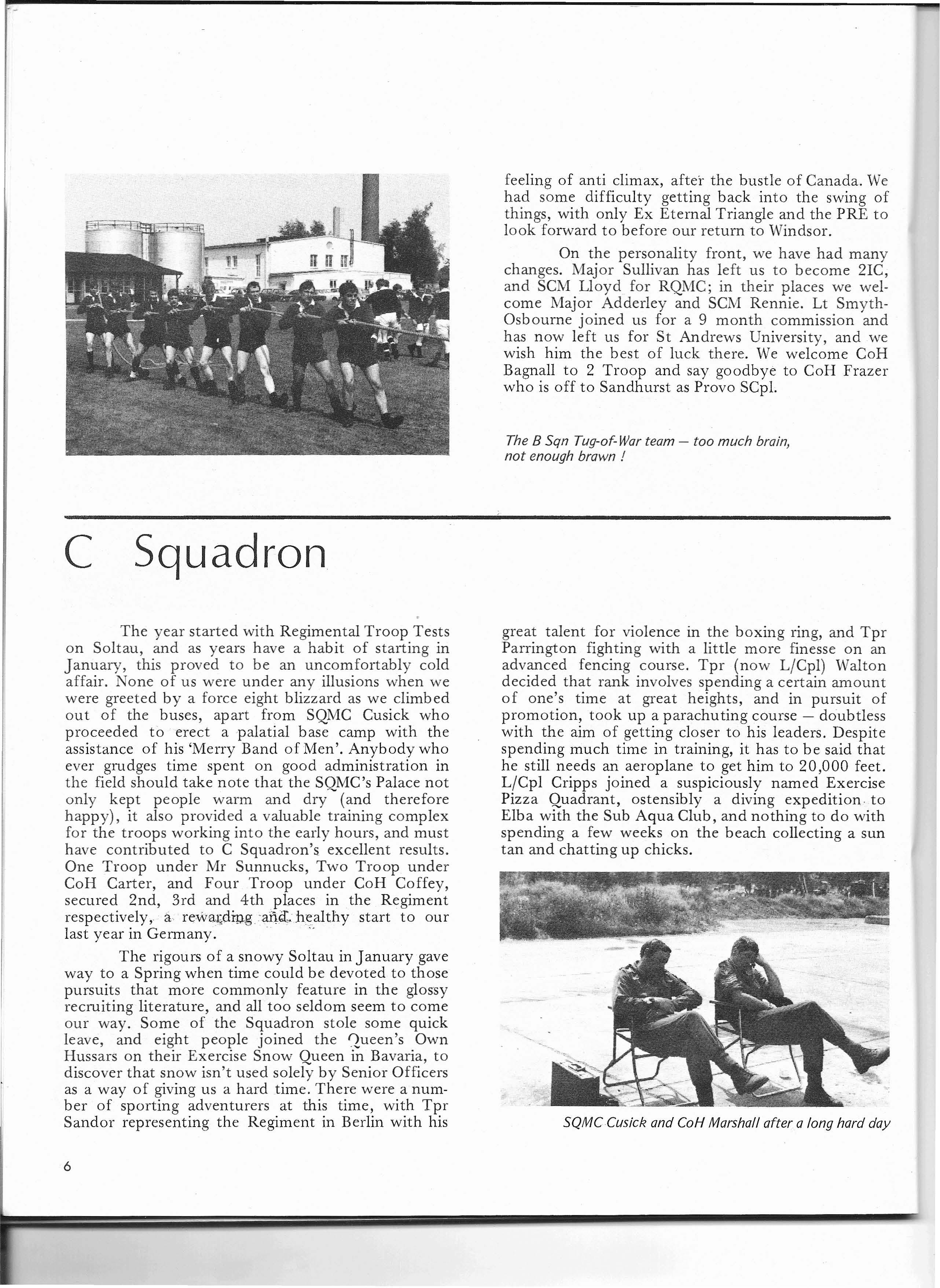
great talent for violence in the boxing ring, and Tpr Parrington fighting with a little more finesse on an advanced fencing course. Tpr (now LjCpl) Walton decided that rank involves spending a certain amount of one's time at great heights, and in pursuit of promotion, took up a parachuting course - doubtless with the aim of getting closer to his leaders. Despite spending much time in training, it has to be said that he still needs an aeroplane to get him to 20,000 feet. LjCpl Cripps joined a suspiciously named Exercise Pizza Quadrant, ostensibly a diving expedition to Elba with the Sub Aqua Club, and nothing to do with spending a few weeks on the beach collecting a sun tan and chatting up chicks.
B2.IT.e
2.!"ec
Group
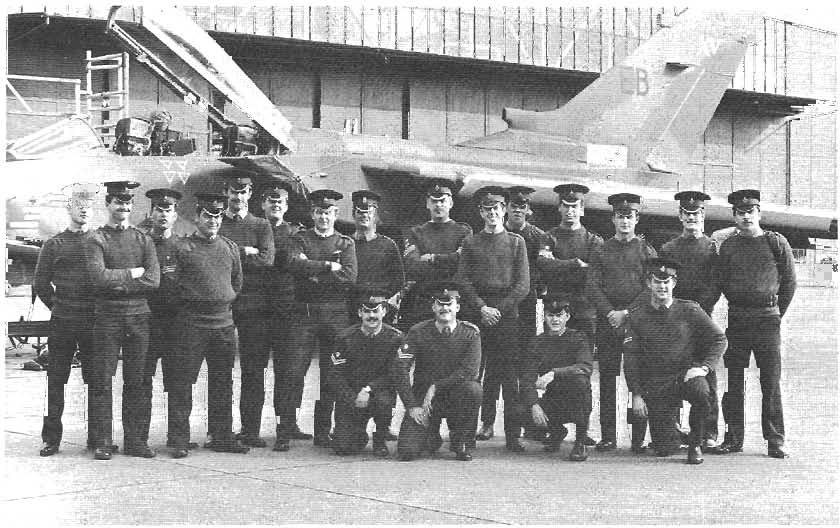
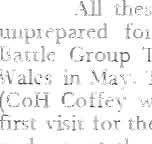
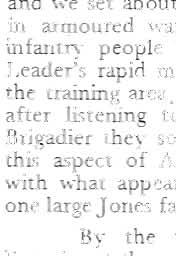
\ \" ales: :\Ia Y. This was to be our last visit to Soltau (CoH Co::e,;:- ,,-as seen to shed a few tears), and the fi t 3:-:or the RRW on their new tour of Germany, 2.bout the task of passing on the expertise oL:red ,,-arfare that we have learnt to these people not used to tanks. The Squadron r2pid manoeuvering of the Squadron across g area. took the Welshmen by surprise, but -:,-eling to the enthusiastic noises from the Br:g2.C2er e.- soon acquired a good appreciation of Armour, and we too learnt to work appeared to be a Regiment comprised of es amily.
-t e time we reached the Brigadier's -e end of the second week, we had a lot playing aoainst. A _&qn, _who provided the ,;<. ;,

June, most of the Squadron managed to least a fe\,- days at the Adventure Training Camp which ,,'e set up in the Harz Mountains. Enthu· organisation by Cap tain Graham meant that activity never stopped; windsurfing, canoeing, skating and hill walking occupied us during the day, and in case we still had some energy left in the evenings, adventurous activity continued on the dance floor of the local disGO all night. For some, and it would be unfair to mention any names (LjCpl Willis), adventurous night activity hasn't stopped
posting to Cyprus next year. At least LjCpl Miller will not have to spend another week discovering that the technique is to stand up on the board and then sail somewhere, instead of leaping off again with a manIC scream.
Next on the programme was that hardy annual event - the Site Guard. It is always a challenge to inject some interest to these affairs, and on top of that, it has to be enjoyed as well. As a Squadron, weare fortunate in having experienced Infantry Instructors from the Guards Depot, and this led to friend
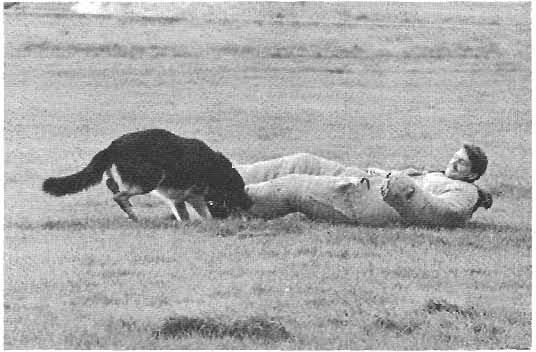
enthusiastic training which made an interesting and enjoyable change from the Tank Park for two weeks. Keeping a section motivated on a diet of sleep and stag for a week demands' good leadership and energy from the section Commander, and for running a good Guard L/CsoH Saddler, Hawkins and Stanworth deserve a special mention. The week eventually passed, which is the best thing one can say for any Site Guard, and it was back to Detmold for gunnery training.
Annual Firing at Hohne was unusual this year, as it was a two week affair ending up in a two day field firing exercise. Apart from the odd ARU added in by the Brigadier in September, this was to be our last time with the tanks out of barracks, and we chose to live behind the ranges rather than in barracks. This proved a successful move, with much more time being available for servicing as time was not wasted on having to maintain a barrack block instead. Sgt Ball and his LAD put in a great deal of hard work, and as a result kept the Squadron up to its full strength for the whole period, laying the basis for some good firing. Conditions were appalling to start with - dust led to bad obscuration, and fires on the ranges cause,d irritating delays. fittingly enough, the most outstanding gunnery came from S/Cpl Cusick, the Squadron Gunnery Instructor, who produced kill times that would be interesting to see many IFCS crews trying to match.
Exercise Famous Grouse was the climax to the firing, and some excellent performances from all the Troops on this exercise served as a good note on which to end the year's training. Again we cannot remember Hohne without giving full credit to the SQMC, S/Cpl Redford, and his Echelon for setting up the bar at every conceivable stop, leading to many good evenings' entertainment behind the ranges and also to L/CoH Hardacre for breaking the world record
number of hamburgers sold without ever breaking into a smile.
With the training season behind us, there was just time to relax a little before the work-up to PRE, and the intensified conversion training that will keep us occupied until we get to Windsor. One of the most memorable diversions was a visit from, and a visit to, RAF Laarbruch. SCM Willis BEM, arranged the visit of twenty members of D Flight in August, and they were well entertained both in the barracks and on Stapel Training Area. Hard work put into making their visit enjoyable led to an invitation back to Laarbruch in October. Tprs Cobb and Keilty were served up to the RAF Police Dogs as part of a demonstration, but the rest of the C Squadron representatives survived to become most impressed with this section of the Forces, about which they had been hitherto rather ignorant.
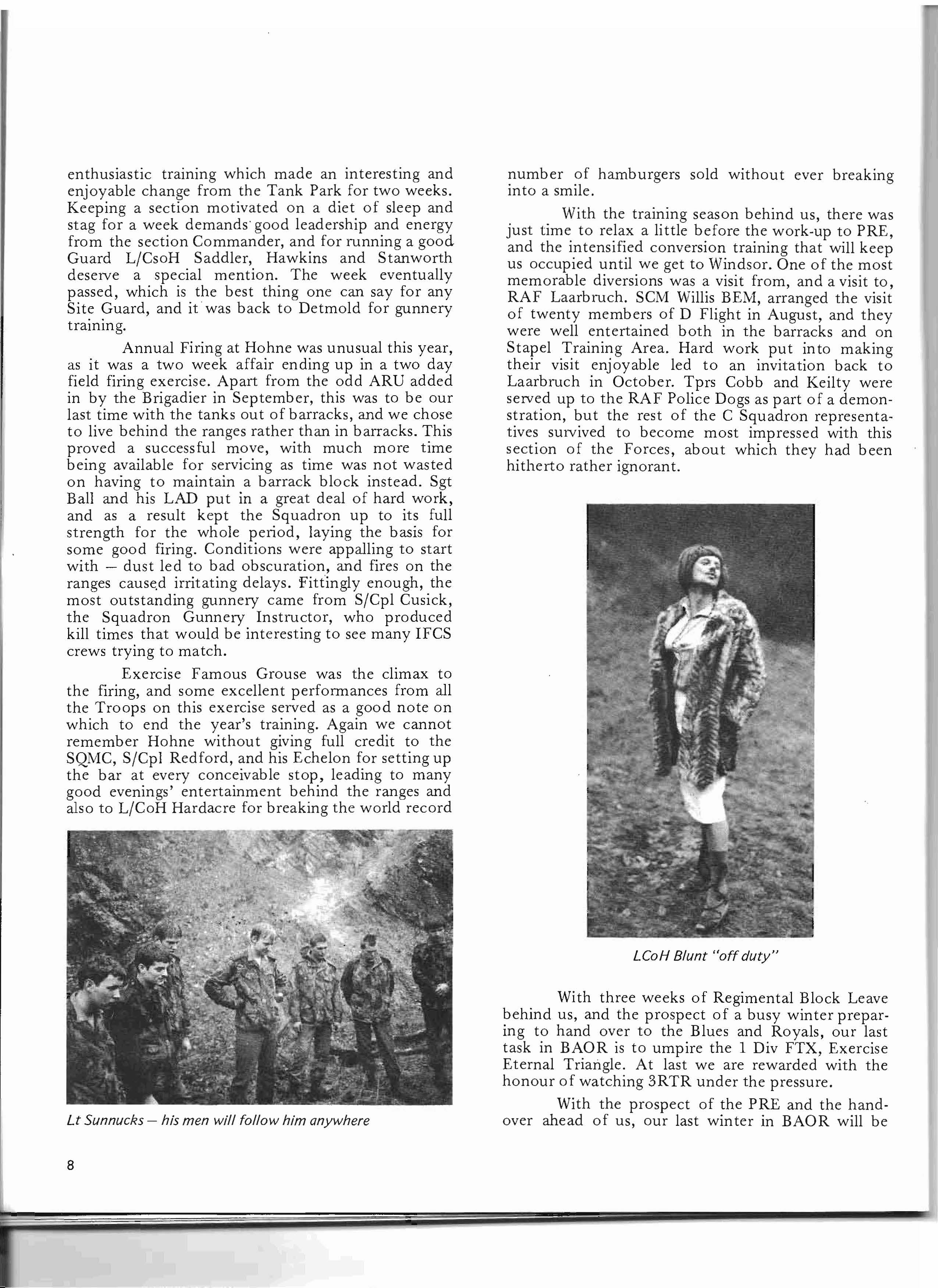
With three weeks of Regimental Block Leave behind us, and the prospect of a busy winter preparing to hand over to the Blues and Royals, our last task in BAOR is to umpire the 1 Div FTX, Exercise Eternal Triangle. At last we are rewarded with the honour of watching 3RTR under the pressure.
With the prospect of the PRE and the handover ahead of us, our last winter in BAOR will be
busy. Conversion trammg is now in full swing, and the Advance Party (forty strong) leaves for Windsor in January. All our commitments taken into consideration, it will be a relief when we eventually settle down to being the wheeled Squadron in Windsor in the Spling.
We bid farewell at Christmas to Major Anderson, and wish him and his family well in Portugal where he is to be attached to an armoured regiment before attending Staff College in Lisbon. 1983 has also seen a succession of Second in Commands: Captain Darley left in February for civilian life, and Captain Graham is now training Cadets at Sandhurst. We wish them both the best of luck in their
It is always said about life in Germany, that nothing ever changes. It is also said that one tends to lurch from crisis to crisis, and whilst 1983 has not been entirely made up of crises, it has certainly had variety and the potential for the odd crisis has been ever present.
The year began quietly, with the Regimental training period at Sol tau which culminated in Troop tests being carried out in appalling weather conditions which were better suited to a Snow Queen Exercise. The weather clearly did not suit the Squadron. In the best performance we could produce, One Troop, under SCpl Lowry, came third overall.
The training period had its lighter moments and perhaps the most unusual Troop demonstration was given by 3 Troop, who were demonstrating Troop recovery. Mr Cape and CoH Fry were thwarted in their efforts to produce the perfect "Schools Solution", when Tpr his tank into that of Tpr Brown givhig ad'declrealism and amusement to the event.
Easter brought with it the inevitable Site Guard and for several days SCM Kelly was seen working out the "ideal roster", whilst the rest of the Squadron carried out dismounted training around the camp, and completed the Annual Personal Weapons Test on every small arms range we could lay our hands on.
Whilst we prepared for the Site Guard, we were also preparing for the Presentation of Standards. This is well documented elsewhere in the magazine,
new jobs. In their place, we welcome Captain PerryWarnes, whose job it will be to take the Squadron back to Windsor. Captain Hewitt has gone to Saumur in France, and Lt Eastwood finds himself at the Guards Depot; SCpl Belza has gone to A Squadron, SQMC Lee to the QM and SQMC Cusick to the Gunnery Wing. Other farewells are to CsoH Mayo, Swallow, Frape, Coffey, J ones and Powell. Arrivals have been less in number and we welcome Lt Stewart, SQMC Redford, CoH George and L/CoH Stanworth. We look forward to settling down in Windsor, where Major Vetch will take command and take the Squadron to Cyprus in July for a six month tour with the United Nations.
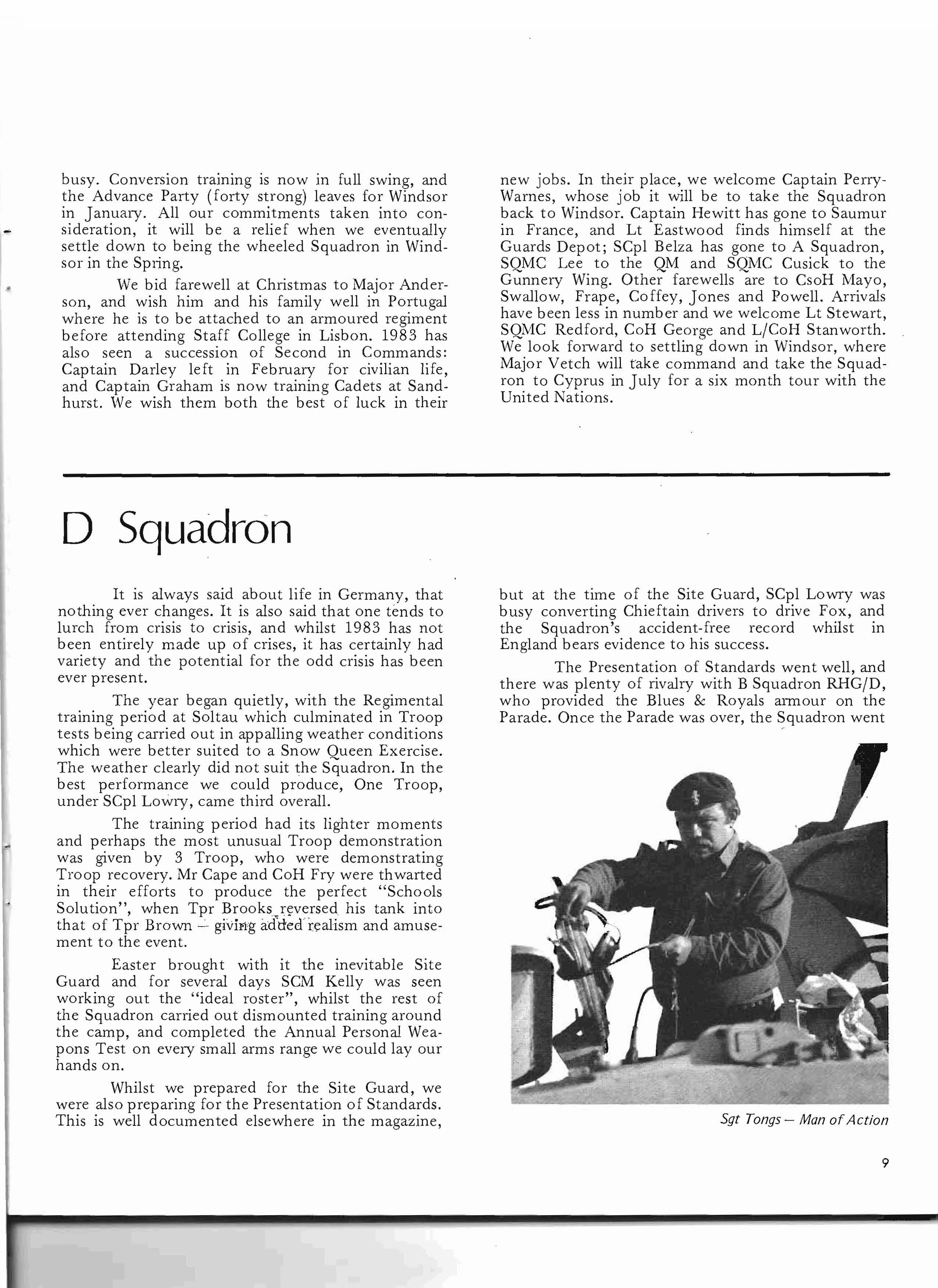
but at the time of the Site Guard, SCpl Lowry was busy converting Chieftain drivers to drive Fox, and the Squadron's accident-free record whilst in England bears evidence to his success.
The Presentation of Standards went well, and there was plenty of rivalry with B Squadron RHG/D, who provided the Blues & Royals armour on the Parade. Once the Parade was over, the Squadron went
on Block Leave prior to returning for pre-BATUS training and this was the moment for SCM Kelly to hand over to SCM Land.
We were to go to BATUS as part of the 1 WFR Battle Group with A Squadron, the Scots Dragoon Guards, providing the other armoured Squadron. We were lucky in that B Squadron, The Life Guards, had just returned from :BATUS with the Royal Hussars Battle Group and were able to offer us helpful advice. The work-up training, initially held at Soltau, proved to be a killer. fo·( th.€ .tanks which suffered badly from extrerYie ·fih'!: and dust. However, the period did provide an excellent training ground for SSgt Wickett and his fitters, who were later to find that the maintenance problems of Soltau were nothing compared to those they were to encounter in Canada. The training period finished with a Brigade test Exercise held at Hohne, and whilst the scenery made a change, there were many who would have preferred to spend the weekend elsewhere. Perhaps the most memorable occasion during the Soltau period was the Battle Group tug of war, when the maxim "handsome is what handsome does" proved true. The scratch team from D Sqn, led b)
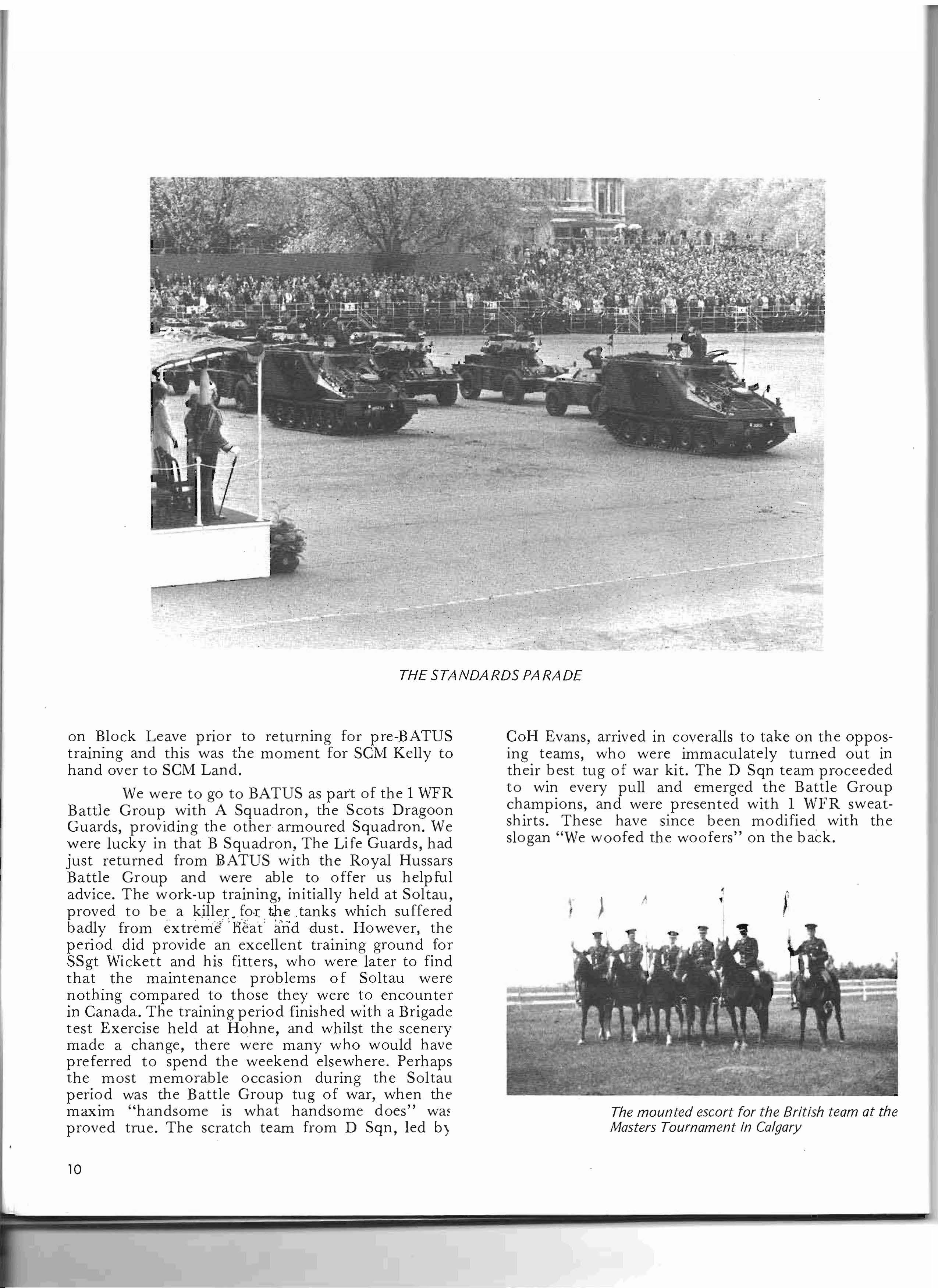
CoH Evans, arrived in coveralls to take on the opposing teams, who were immaculately turned out in their best tug of war kit. The D Sqn team proceeded to win every pull and emerged the Battle Group champions, and were presented with 1 WFR sweatshirts. These have since been modified with the slogan "We woofed the woofers" on the back.
The Squadron then spent a few days in Detmold, before setting off by Tri-Star to Canada. It was agreed by everyone that the training period had been extremely good, and the standard of gunnery and tactical movement improved all the time. There were many favourable comments - particularly on the HESH shooting. LCoH Keech's crew of Tprs Dixon, Davidson and Curtis, did exceptionally·well on Ex Osprey, when they were singled out for praise as having achieved the best results on that exercise of any crew to date. To celebrate, they broke down and were unable to finish the Exercise.
With the advent of the Rand R period, the. Squadron accepted a commitment to provide a
mounted escort for the British Show Jumping Team which was competing in the Masters' Tournament at Spruce Meadows, just outside Calgary. The escort comprised the Squadron Leader, Mr Hopkins, Mr Oswald, CoH Douglas, LCoH Bums and LCoH Hearn. The party were very well looked after by Lord Strathcona's Horse and the duty was carried out on 15.2 Chestnuts, which made an intersting change from 16.2 Blacks. It was perhaps as well that the Riding Master was five or six thousand miles away.
The rest of the Squadron was well spread ou t for the Rand R period with Calgary proving as popular as ever. The Water Chute at Medicine Hat was a local attraction which proved a useful provider of business to the Squadron Medic, LCoH Doyle, who dealt with endless self-inflicted sprains, bruises and bumps. With the arrival of the next Battle Group, the Irish Guards, came rumours that the Chute had to be closed because attempts were being made to go up the Chute; the rumours proved to be unfounded.
The Adventure Training Party was led by Mr Cape, and all concerned thoroughly enjoyed themselves.
The return from BATUS brought with it an almost instant turn out for ORT which even stretched the resources of SQMC Saunders. Once again, the Squadron proved if could overcome an instant crisis!
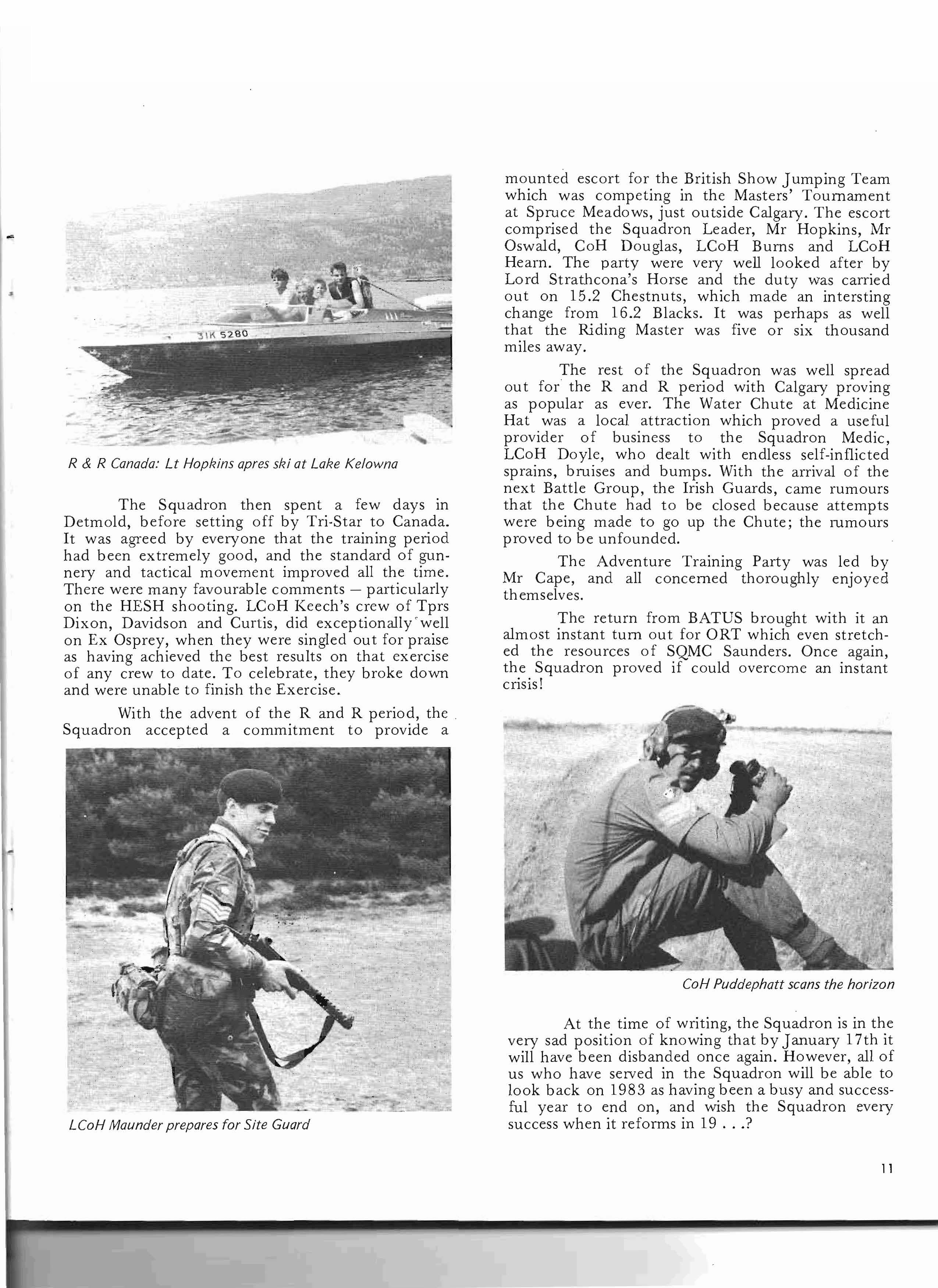
At the time of writing, the Squadron is in the very sad position of knowing that by January 17th it will have been disbanded once again. However, all of us who have served in the Squadron will be able to look back on 1983 as having been a busy and successful year to end on, and wish the Squadron every success when it reforms in 19 ?
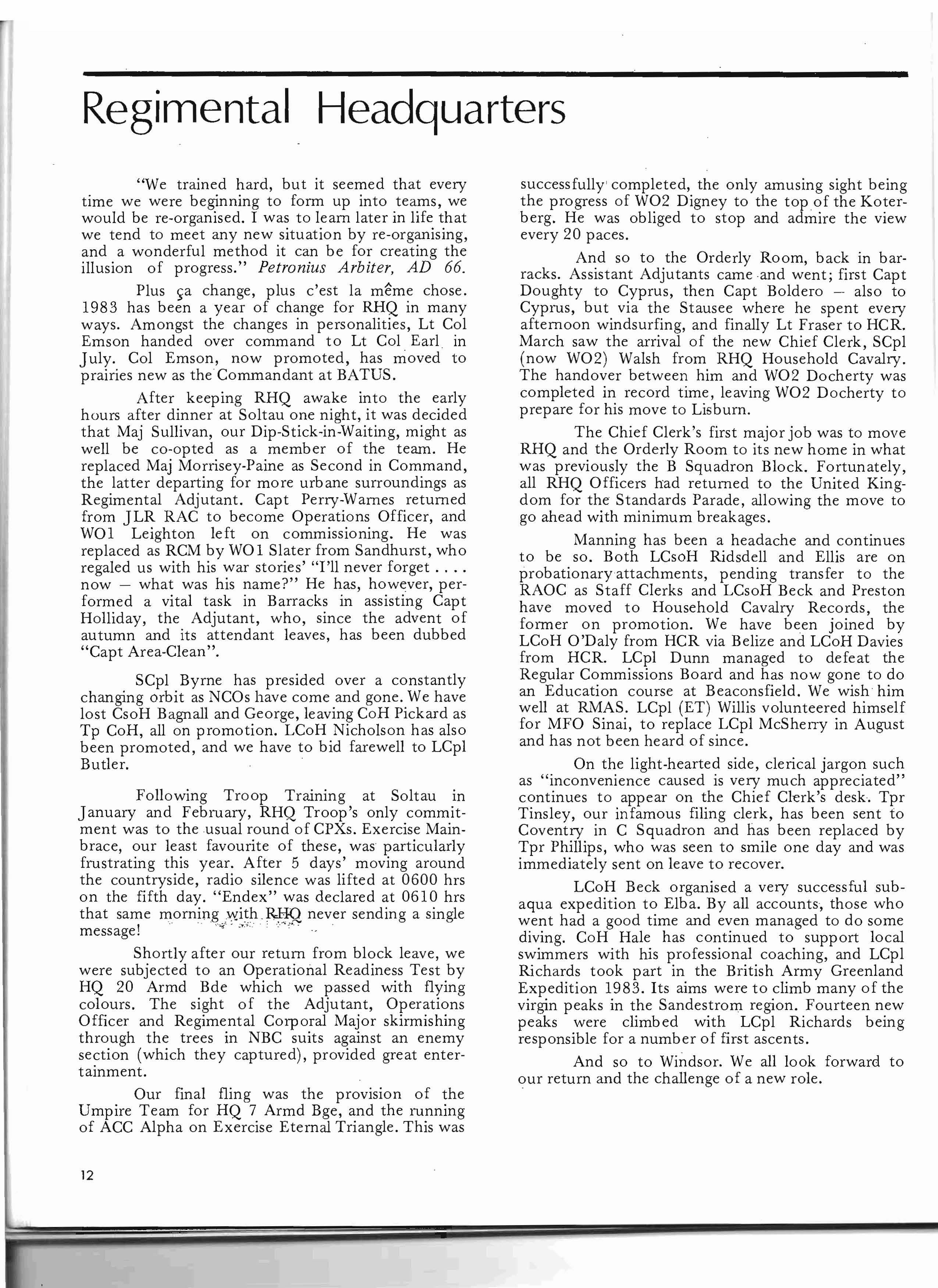
"We trained hard, but it seemed that every time we were beginning to form up into teams, we would be re-organised. I was to learn later in life that we tend to meet any new situation by re-organising, and a wonderful method it can be for creating the illusion of progress." Petronius Arbiter, AD 66.
Plus change, plus c'est la meme chose. 1983 has been a year of change for RHQ in many ways. Amongst the changes in personalities, Lt Col Emson handed over command to Lt Col Earl in July. Col Emson, now promoted, has moved to prairies new as the Commandant at BATUS.
After keeping RHQ awake into the early hours after dinner at Soltau one night, it was decided that Maj Sullivan, our Dip-Stick-in-Waiting, might as well be co-opted as a member of the team. He replaced Maj Morrisey-Paine as Second in Command, the latter departing for more urbane surroundings as Regimental Adjutant. Capt Perry-Warnes returned from JLR RAC to become Operations Officer, and W01 Leighton left on commissioning. He was replaced as RCM by WO 1 Slater from Sandhurst, who regaled us with his war stories' "I'll never forget now - what was his name?" He has, however, performed a vital task in Barracks in assisting Capt Holliday, the Adjutant, who, since the advent of autumn and its attendant leaves, has been dubbed "Capt Area-Clean".
SCpl Byrne has presided over a constantly changing orbit as NCOs have come and gone. We have lost CsoH Bagnall and George, leaving CoH Pickard as Tp CoH, all on promotion. LCoH Nicholson has also been promoted, and we have to bid farewell to LCpl Butler.
Following Troop Training at Soltau in January and February, RHQ Troop's only commitment was to the usual round of CPXs. Exercise Mainbrace, our least favourite of these, was particularly frustrating this year. After 5 days' moving around the countryside, radio silence was lifted at 0600 hrs on the fifth day. "Endex" was declared at 0610 hrs that same never sending a single , .' ,•... : : ... message. "
Shortly after our return from block leave, we were subjected to an Operational Readiness Test by HQ 20 Armd Bde which we passed with flying colours. The sight of the Adjutant, Operations Officer and Regimental Corporal Major skirmishing through the trees in NBC suits against an enemy section (which they captured), provided great entertainment.
Our final fling was the provision of the Umpire Team for HQ 7 Armd Bge, and the running of ACC Alpha on Exercise Eternal Triangle. This was
successfully' completed, the only amusing sight being the progress of W02 Digney to the top of the Koterberg. He was obliged to stop and admire the view every 20 paces.
And so to the Orderly Room, back in barracks. Assistant Adjutants came and went; first Capt Doughty to Cyprus, then Capt Boldero - also to Cyprus, but via the Stausee where he spent every afternoon windsurfing, and finally Lt Fraser to HCR. March saw the arrival of the new Chief Clerk, SCpl (now W02) Walsh from RHQ Household Cavalry. The hand over between him and W02 Docherty was completed in record time, leaving W02 Docherty to prepare for his move to Lisburn.
The Chief Clerk's first major job was to move RHQ and the Orderly Room to its new home in what was previously the B Squadron Block. Fortunately, all RHQ Officers had returned to the United Kingdom for the Standards Parade, allowing the move to go ahead with minimum breakages.
Manning has been a headache and continues to be so. Both LCsoH Ridsdell and Ellis are on probationary attachments, pending transfer to the RAOC as Staff Clerks and LCsoH Beck and Preston have moved to Household Cavalry Records, the former on promotion. We have been joined by LCoH O'Daly from HCR via Belize and LCoH Davies from HCR. LCpl Dunn managed to defeat the Regular Commissions Board and has now gone to do an Education course at Beaconsfield. We wish him well at RMAS. LCpl (ET) Willis volunteered himself for MFO Sinai, to replace LCpl McSherry in August and has not been heard of since.
On the light-hearted side, clerical jargon such as "inconvenience caused is very much appreciated" continues to appear on the Chief Clerk's desk. Tpr Tinsley, our infamous filing clerk, has been sent to Coventry in C Squadron and has been replaced by Tpr Phillips, who was seen to smile one day and was immediately sent on leave to recover.
LCoH Beck organised a very successful subaqua expedition to Elba. By all accounts, those who went had a good time and even managed to do some diving. CoH Hale has continued to support local swimmers with his professional coaching, and LCpl Richards took part in the British Army Greenland Expedition 1983. Its aims were to climb many of the virgin peaks in the Sandestrom region. Fourteen new peaks were climbed with LCpl Richards being responsible for a number of first ascents.
And so to Windsor. We all look forward to our return and the challenge of a new role.
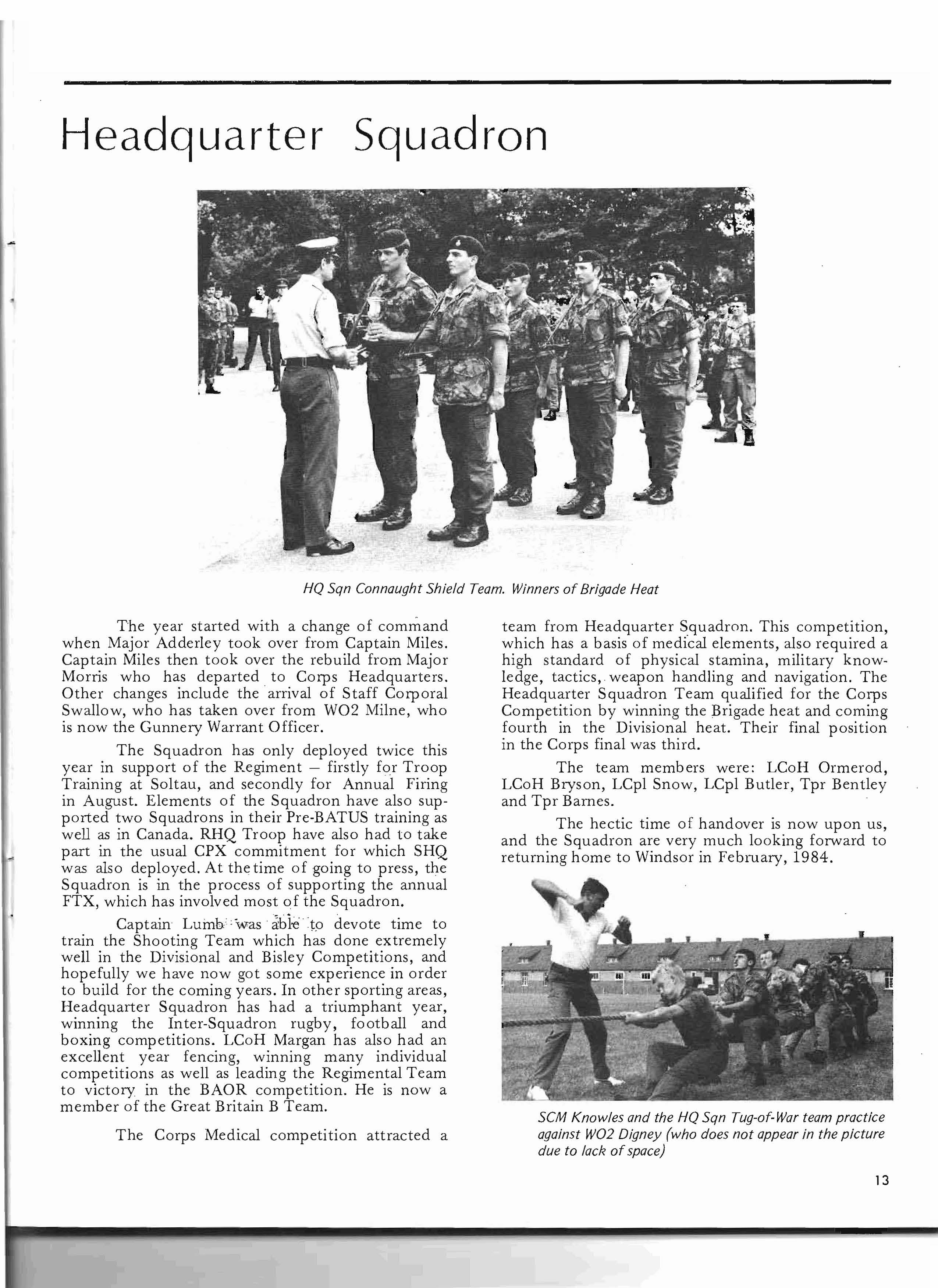
The year started with a change of command when Major Adderley took over from Captain Miles. Captain Miles then took over the rebuild from Major Morris who has departed to Corps Headquarters. Other changes include the arrival of Staff Corporal Swallow, who has taken over from W02 Milne, who is now the Gunnery Warrant Officer.
The Squadron has only deployed twice this year in support of the Regiment - firstly for Troop Training at Soltau, and secondly for Annual Firing in August. Elements of the Squadron have also supported two Squadrons in their Pre-BATUS training as well as in Canada. RHQ Troop have also had to take part in the usual CPX commitment for which SHQ was also deployed. At the time of going to press, the Squadron is in the process of supporting the annual FTX, which has involved most of the Squadron.
Captain Luinhwas .rbi.et9 devote time to train the Shooting Team which has done extremely well in the Divisional and Bisley Competitions, and hopefully we have now got some experience in order to build for the coming years. In other sporting areas, Headquarter Squadron has had a triumphant year, winning the Inter-Squadron rugby, football and boxing competitions. LCoH Margan has also had an excellent year fencing, winning many individual competitions as well as leading the Regimental Team to victory in the BAOR competition. He is now a member of the Great Britain B Team.
The Corps Medical competition attracted a
team from Headquarter Squadron. This competltlOn, which has a basis of medical elements, also required a high standard of physical stamina, military knowledge, tactics, weapon handling and navigation. The Headquarter Squadron Team qualified for the Corps Competition by winning the Brigade heat and coming fourth in the Divisional heat. Their final position in the Corps final was third.
The team members were: LCoH Ormerod, LCoH Bryson, LCpl Snow, LCpl Butler, Tpr Bentley and Tpr Barnes.
The hectic time of handover is now upon us, and the Squadron are very much looking forward to returning home to Windsor in February, 1984.
1983 has been a year of change for the LAD, leading up to 1984 which will see our greatest change in recent memory.
During the year, many of the LAD have changed - with a new EME, Artificer Weapons, two new Sqn Artificers, and numerous others.
All four Squadrons were supported by the LAD sections on SLT A, with two ending up in BATUS. HQ LAD got a chance to play in the FTX this year, looking after the umpires. .
Our great change? . . . , as well as being handed over to The Blues and Royals next year, we also get IFCS on to the tanks and set up a new section to look after Swingfire and CVR(T).
So what happened in '83?
January
The start of the year saw the Regiment on Soltau and we were there too. The highlight for the LAD being a Bedford Barbeque at 0230, one morning. No one hurt - but we know that fitters can bite their way through canvas.
February
Troop training ended with a couple of unplanned recovery tasks to wake up the fitters before our return to Detmold. SSgt Eagles then went on holiday to Belize for six months.
March
This was one of those 'visit' months, and most notable for the LAD was that of the new 4 Div Commander Maintenance, Lt Col JKA'C Osman, MBE.
During April, we had a visit with a difference - 10 female PAs (Personal Assistants) to senior REME officers in UK and BAOR visited us to find out, at first hand, how an LAD in the front line operated. They didn't seem to find us. We were'lost somewhere between the hounds and the stables, and the highlight of their visit, was a. talk by Lt Dunbar in the Officers' Mess and W02 Knowles m the WO & NCOs Mess, on the history, traditions and stories associated with the various objets d'art in the messes. At last W02 Knowles had a captive audience! Late April, SSgt Wicket took over the fitters in D Sqn (what are those - 15 tracked Bedfords?)
The summer hurried by with all four Sabre Squadrons on SLTA (not at the same time, that would be far too easy!). Then B Sqn went off to BATUS with The Royal Hussars Battle Group. Plenty of work for the fitter sections, when they could find the tankshiding in dry lakes, (and recover them!). June saw a change of Tiffy with SSgt McFarlane taking the reins in A Sqn fitter section. Later in the summer, we saw D Sqn off to BATUS with 1 WFR. We counted them all out but couldn't count them all back. Sgt Tongs stayed behind to get married! There's something about 17 days on the prairie that does something to a man.
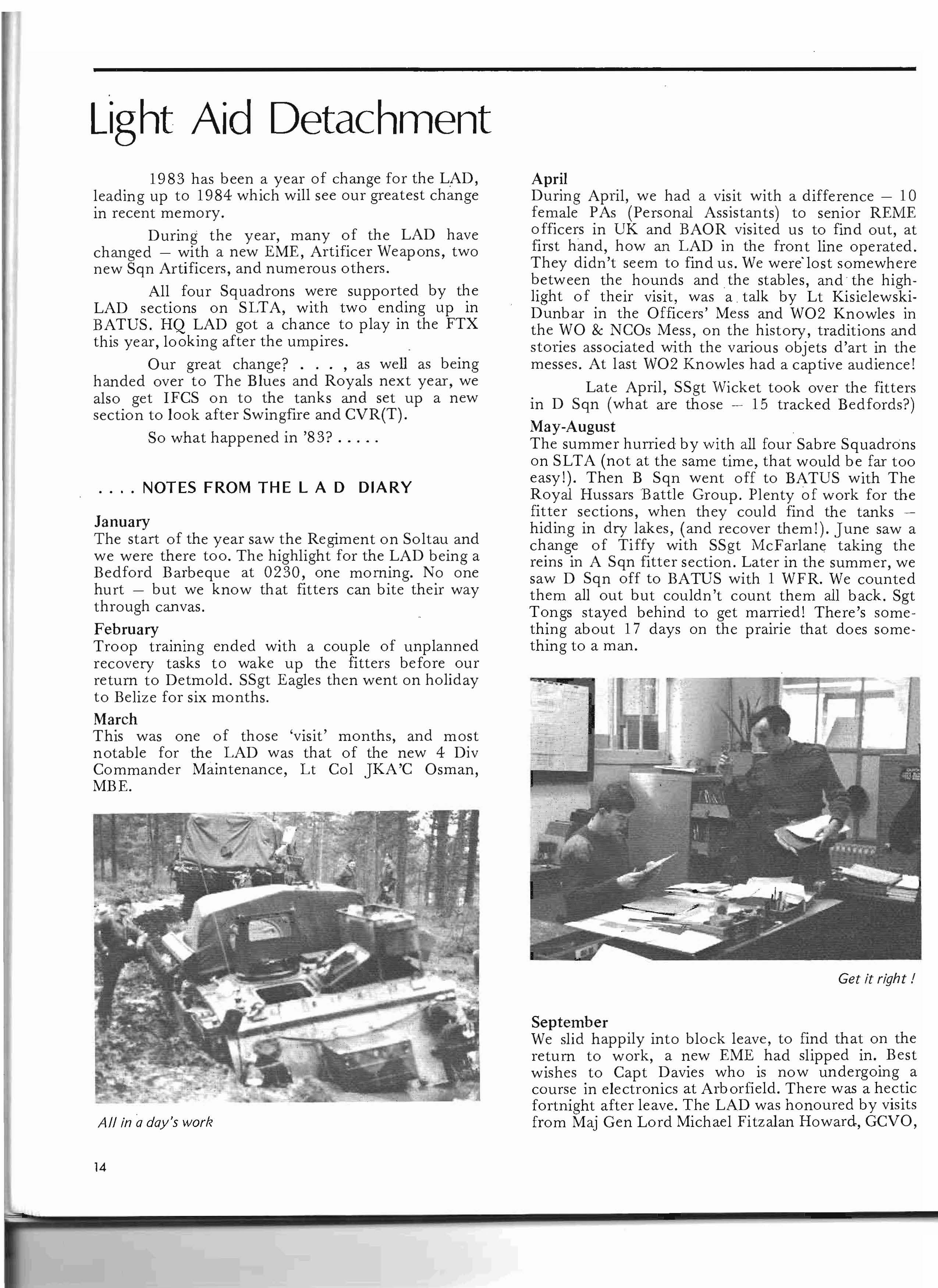
Get it right!
We slid happily into block leave, to find that on the return to work , a new EME had slipped in. . Best wishes to Capt Davies who is now undergomg. a course in electronics at Arborfield. There was a hectIc fortnight after leave. The LAD was honoured by visits from Maj Gen Lord Michael Fitzalan Howard, GCVO,
CB, CBE, MC, Gold Stick and Colonel of The Life Guards, and then later in the month, by our DGEME, Maj Gen T B Palmer. The visit of DGEME took place the day after the Regiment had been 'crashed out' on Active Edge. We had finished preparing the LAD late that night and next morning it was amazing how some of the fitters stayed awake. (Some didn't!)
October-December
The FTX rears its ugly head just in front of our 100% PRE in December and the pace of life begins to hot up. (Too much so for HQ Sqn 434 which had a 'quick
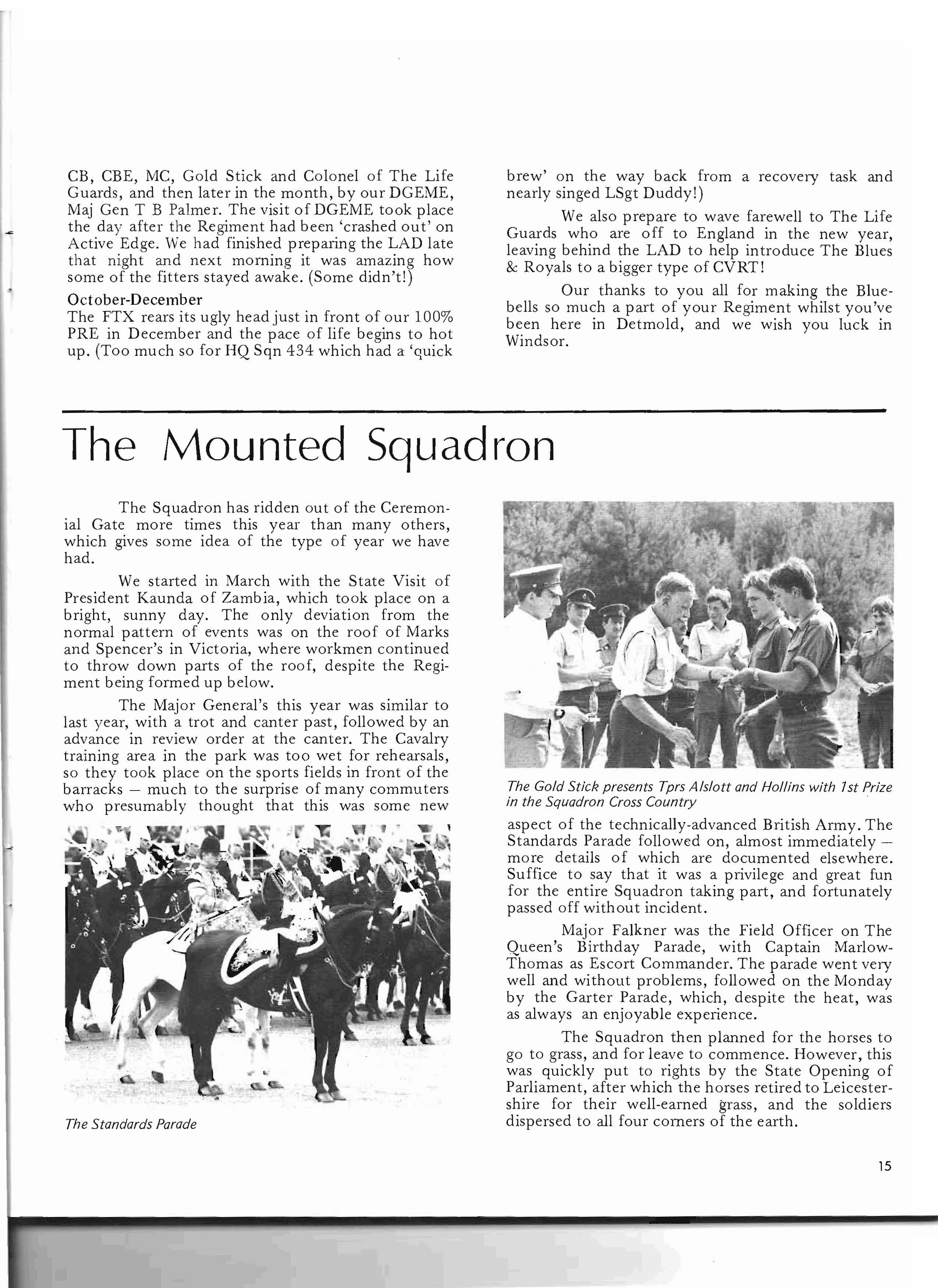
brew' on the way back from a recovery task and nearly singed LSgt Duddy!)
We also prepare to wave farewell to The Life Guards who are off to England in the new year, leaving behind the LAD to help introduce The Blues & Royals to a bigger type of CVRT!
Our thanks to you all for making the Bluebells so much a part of your Regiment whilst you've been here in Detmold, and we wish you luck in Windsor.
The Squadron has ridden out of the Ceremonial Gate more times this year than many others, which gives some idea of the type of year we have had.
We started in March with the State Visit of President Kaunda of Zambia, which took place on a bright, sunny day. The only deviation from the normal pattern of events was on the roof of Marks and Spencer's in Victoria, where workmen continued to throw down parts of the roof, despite the Regiment being formed up below.
The Major General's this year was similar to last year, with a trot and canter past, followed by an advance in review order at the canter. The Cavalry training area in the park was too wet for rehearsals, so they took place on the sports fields in front of the barracks - much to the surprise of many commuters
The Go/d Stick presents Tprs A Is/ott and Ho//ins with 7st Prize in the Squadron Cross Country who presumably thought that this was some new aspect of the technically-advanced British Army. The Standards Parade followed on, almost immediately more details of which are documented elsewhere. Suffice to say that it was a privilege and great fun for the entire Squadron taking part, and fortunately passed off without incident.
Major Falkner was the Field Officer on The Queen's Birthday Parade, with Captain MarlowThomas as Escort Commander. The parade went very well and without problems, followed on the Monday by the Garter Parade, which, despite the heat, was as always an enjoyable experience.
The Squadron then planned for the horses to go to grass, and for leave to commence. However, this was quickly put to rights by the State Opening of Parliament, after which the horses retired to Leicestershire for their well-earned grass, and the soldiers dispersed to all four corners of the earth.
The final and most moving ceremony of the year was the Dismounted Parade, held on 28th June in Hyde Park, for the Dedication of the Memorial to those killed in Hyde Park last year. This was a private service, the dedication being made by HRH Queen Elizabeth the Queen Mother, and was attended by many families from the Regiment.
The Squadron moved to Summer Camp in August, and was blessed throughout with good weather. The horizontal driving rain on Open Day moming even abated, and that was the only threat during all three weeks. We were fortunate enough to be visited by the Colonel of The Life Guards on the day of our Squadron Cross Country. He walked the course with the Squadron Leader and presented first prizes to Tprs Thomas and Avison, followed by lunch in the "ulu" with the Officers and SNCOs of the Squadron.
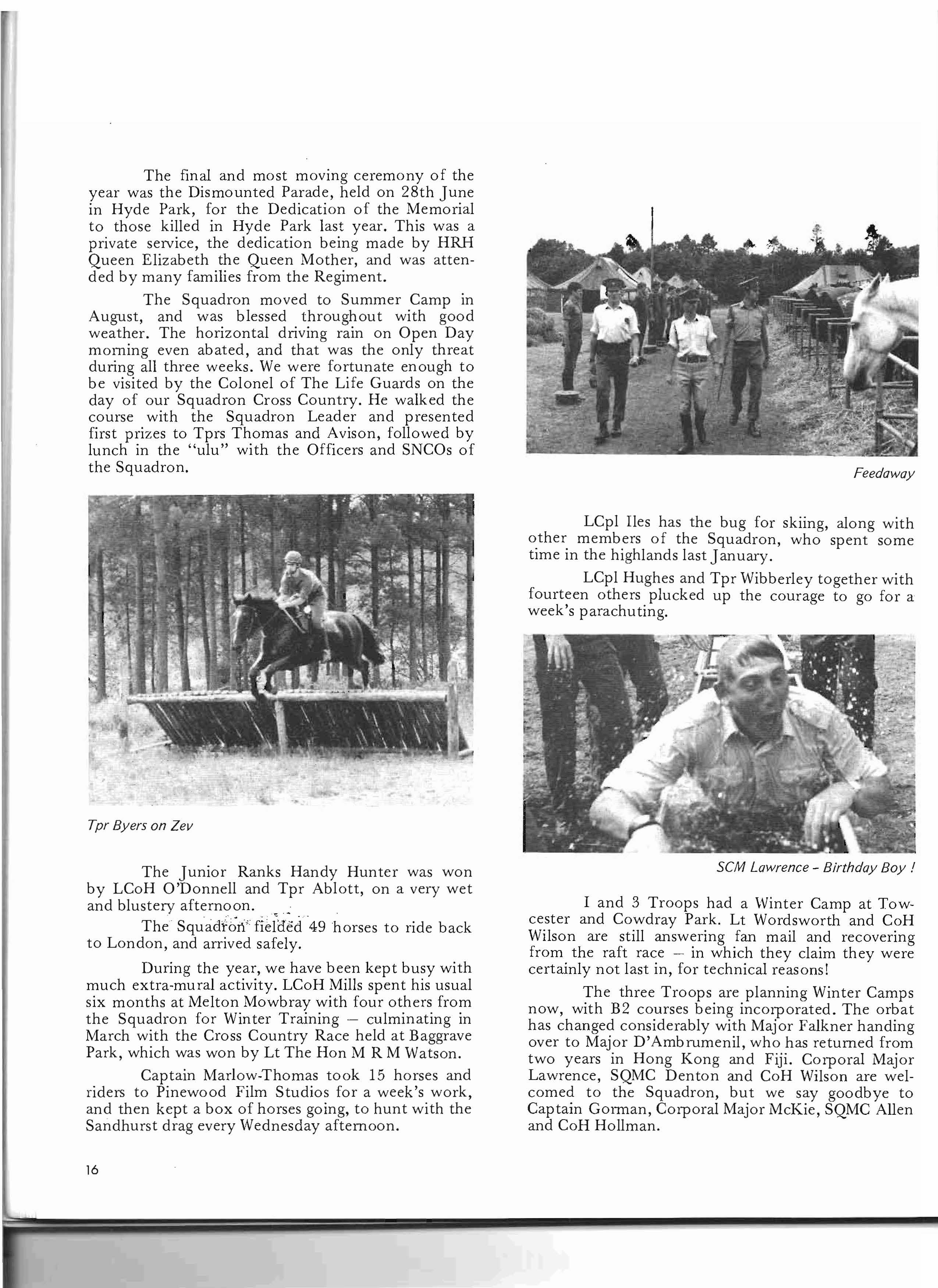
The Junior Ranks Handy Hunter was won by LCoH O'Donnell and Tpr Ablott, on a very wet and blustery afternoon.
The Squadfb"n:' 49 horses to ride back to London, and arrived safely.
During the year, we have been kept busy with much extra-mural activity. LCoH Mills spent his usual six months at Melton Mowbray with four others from the Squadron for Winter Training - culminating in March with the Cross Country Race held at Baggrave Park, which was won by Lt The Hon M R M Watson.
Captain Marlow-Thomas took 15 horses and riders to Pinewood Film Studios for a week's work, and then kept a box of horses going, to hunt with the Sandhurst drag every Wednesday afternoon.
LCpl Iles has the bug for skiing, along with other members of the Squadron, who spent some time in the highlands last January.
LCpl Hughes and Tpr Wibberley together with fourteen others plucked up the courage to go for a week's parachuting.
I and 3 Troops had a Winter Camp at Towcester and Cowdray Park. Lt Wordsworth and CoH Wilson are still answering fan mail and recovering from the raft race - in which they claim they were certainly not last in, for technical reasons!
The three Troops are planning Winter Camps now, with B2 courses being incorporated. The orbat has changed considerably with Major Falkner handing over to Major D'Ambrumenil, who has returned from two years in Hong Kong and Fiji. Corporal Major Lawrence, SQMC Denton and CoH Wilson are welcomed to the Squadron, but we say goodbye to Captain Gorman, Corporal Major McKie, SQMC Alien and CoH Hollman.
The make up of the Quadrille this year was similar to others, with eight men in Mounted Review Order, eight men in 1890's Stable Dress, six trumpeters and two Drum Horses. However, after the first two engagements, we were reduced to one Drum Horse - Claudius, and four trumpeters. Again we had a heavy Life Guard bias, with Captain P J D MarlowThomas (Quadrille Officer) and CoH Ritchie (Quadrille NCO) assisting the Riding Master, Lt Col A J ackson.
The season got off to an early start,· with training in January and a continental trip to the Dortmund International Horse Show. This was enjoyed immensely by all ranks. The German drinking hours impressed all those who had not visited Germany before, but then as we were rarely finished before midnight, the relaxed hours became a necessity.
The next engagement was at The Royal Windsor Horse Show in May, where we shared the stables at Windsor with the Royal Horse Artillery. We were plagued with rain, resulting in the cancellation of two afternoons' performances, but the final performance on the Sunday was watched by Her Majesty the Queen in glorious sunshine. During the floodlit performance, a spectacular fall by an unnamed rider was righted so quickly, that the spectators applauded it as a natural part of the act.
Vle had a break until after the Trooping, and then travelled to Cambridge to perform for the Burma Star Association, at a one-day show. With the horses being accommodated like the men in single panel marquees, much amusement was experienced by the passers by as the sides on both quarters were rolled up.
1983 with W02 Harman taking over the Band Corporal Major's chair from W02 Fletcher, who retired in January after 22 years' service with The Life Guards. He was greeted with the shock of preparing for the inspection of the Band by the Royal Military School of Music, Kneller Hall, without the Director of Music who was confined to his bed with a severe spinal ailment. The Band received an "excellent" on their report from the Inspectorate of Army Bands: not bad considering that the Director was still unable to participate. All praise to BCM Harman who did a marvellous job
We then moved to Chichester on July 1st, when we performed for the Chichester Combined Charities, and were lucky enough to be stabled and accommodated in Goodwood House. From there we moved directly to The Royal Horse Show, from 4th to 7th July which, though hard work, was enjoyed by everyone. Tpr Ablott nearly caused a breach of the peace with an obstructive member of the public when he aske.d "Sir, permission to get off and fill his head in!". Fortunately, the incident was resolved by a helpful polceman, and Tpr Ablott stayed mounted.
This was immediately followed by a move to Bexleyheath Show for the weekend, where we were accompanied during one performance by not only the Band, but a gyrocopter which treated us like moving targets.
The last and longest period away was the Cardiff Searchlight Tattoo for two weeks in August. There, we performed a reduced ride in the grounds of Cardiff Castle, which made an impressive sighttaking rapturous applause each night. The ride was televised one evening and is to be shown on two occasions in the coming year. Tprs Howatson-J ones and Jenkins organised a visit to Cardiff Arms Park, and have been looking critically at every piece of turf since.
The Quadrille dispersed before camp, but did not miss the chance of a reunion at camp, where LCpl Kearns earned his bread with a presentation to the Riding Master, and Tpr Scott, as ever, had a few extra words on the subject.
Many of the horses have now gone to grass, after a hard and successful summer and even now, as plans for next year are put together, hardened Quadrille members are talking of Paris - and who knows what that could lead to?
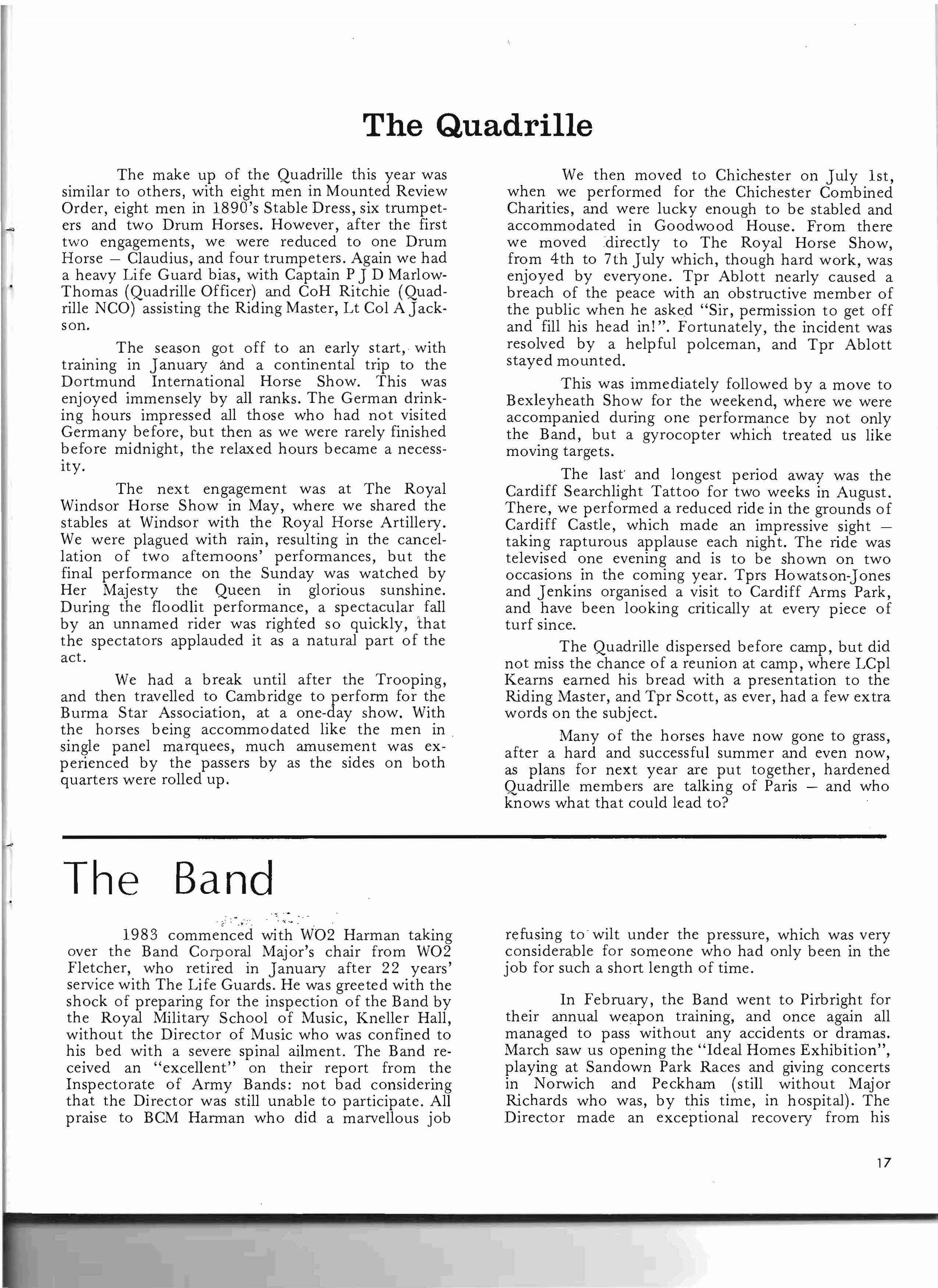
refusing to wilt under the pressure, which was very considerable for someone who had only been in the job for such a short length of time.
In February, the Band went to Pirbright for their annual weapon training, and once again all managed to pass without any accidents or dramas. March saw us opening the "Ideal Homes Exhibition", playing at Sandown Park Races and giving concerts in Norwich and Peckham (still without Major Richards who was, by this time, in hospital). The Director made an exceptional recovery from his
The Band in St. james' Park auditioning their new Director of Music
, eration, which was a complete success, and we elcomed him back to the Band in April, just in time :'- r the "silly season". We were then inspected by the' :"'ieutenant·Colonel Commanding in four different _.:odes of dress in one morning (bet the Regiment It beat that!)
April continued with the Band cutting a new "A Soldier's Chorus", together with the Penn _. oir. Then the mQunted season began in earnest '. "h endless rehearsals for the Major General's >.spection. May saw us at the Cavalry Sunday Parade Hyde Park, which was memorable if only for the :.:.::- that it poured with rain! The mounted season _;; the busiest that any of us could remember-;:' g composed of Major General's, Guard Mounting _: Horse Guards, The Standards Parade, Beating : [reat, Trooping the Colour and Wembley Military Pageant - to mention but a few (or should it " e 'Phew'?) Even with all the rehearsals which went ':h them, we still manag<:;d to.:"sandwich a Garter C.:::-emony in the middle! ' "'; • c,;",· , "
We then performed a very sad duty playing at -: e Dedication of the Memorial in Hyde Park to last - :::u's bomb victims. There wasn't a member of the "-J.d who remained untouched by the sadness and e2. ,felt grief of the brief service.
Two weeks at Eastbourne on the bandstand :':. . 0 \'ed in some of the best weather for many a during which we managed to upset a number of I followers of the Band when we were forced the route of our march on the second week :::- security reasons. In July we also played at a
Garden Party in Buckingham Palace and gave concerts in St James' Park and at Ascot. August arrived, and with it the news that Major Richards would be retiring in early 1984. He was guest conductor at Kneller Hall where he conducted the Kneller Hall Band whilst mounted on his charger! (The things people do to get noticed!) The Band played at various other venues in August and, after leave, returned to play at Stoney Castle Camp for a church service and at Open Day the following week. Soon after this, the Trumpet Major took three of his Trumpeters to Spain to sample the sherry at Jerez. It seems that it took them five days to sound one fanfare! The rest of the year was taken up with
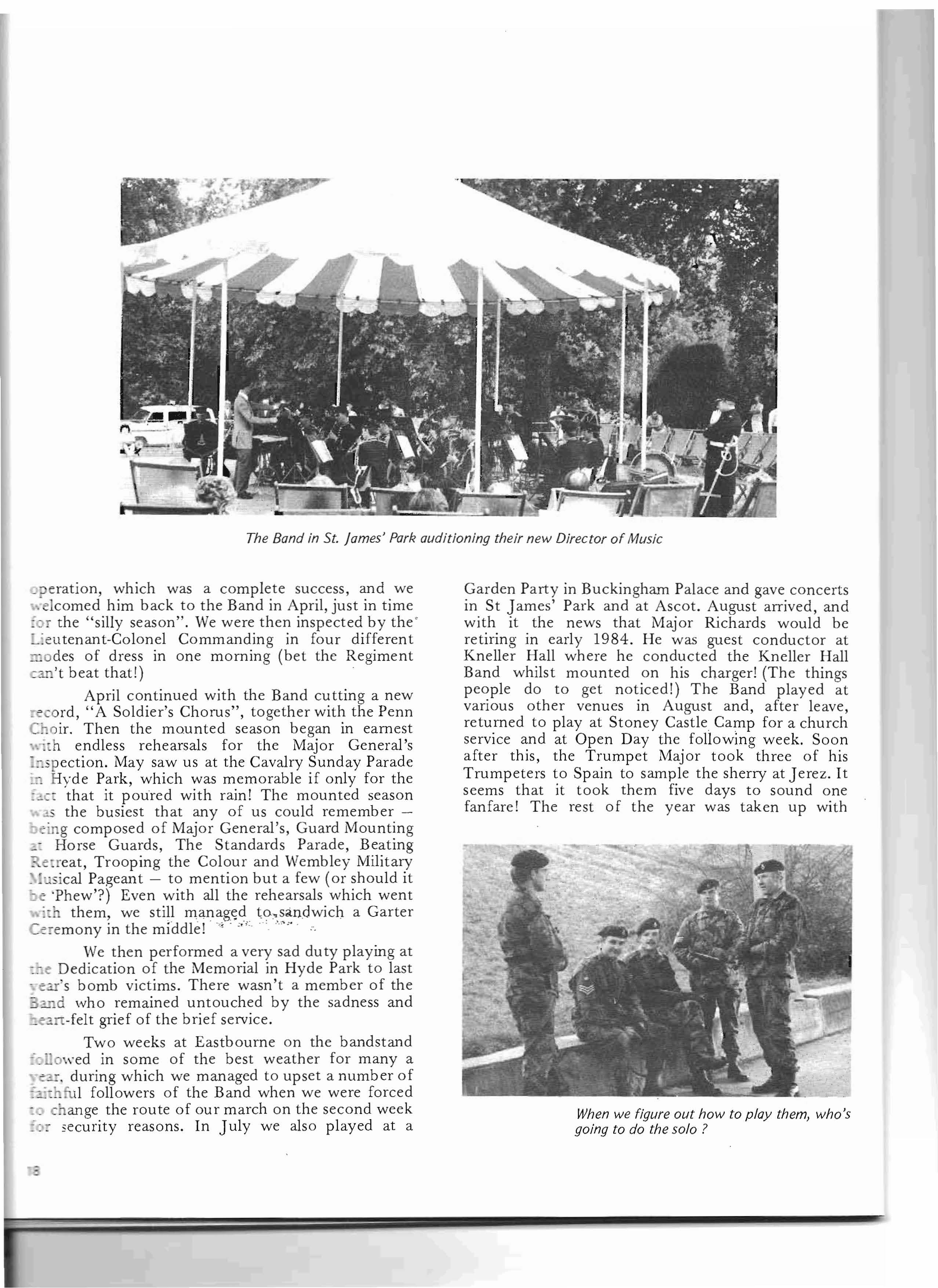
When we figure out how to play them, who's going to do the solo?
various concerts, mounted band in the Lord Mayor's Show and our annual trip to the Regiment in Germany, where we also performed at the Munster Show. This was, of course, our last trip to BAOR for some time as we return to Windsor in February.
We are indebted to SCpl Whitworth and his enthusiasm for computers. The music library, Band accounts and all personal records are available at the touch of a button. Life is a little easier for everyone, but we have the feeling that Big Brother is watching us-even before the dawn of 1984!
The past year has seen quite a few changes in personnel, with SCpls Marsden and J olley and Trumpet Major Close all leaving not far behind BCM Fletcher. We wish them all well in civilian life and thank them tSlr all their loyal service to the Band over the years. ';
Not more than 20 yards from the nerve ce'ntre of the Regiment, toils a keen' and willing bunch of lads-the Pay Staff. They have weathered the ravages of several cuts in LOA and a dive in the value of the pound, which wiped the smile off the face of all but the most insensitive.
Happily the pound has recovered, and although LOA news is not heartening, most of our 'customers' have started talking to us again.
SSgt Stammer took over the Pay Office only to lose his Paymaster, Capt Keating, and have him replaced by Maj Howarth. At about the same time, Sgt Derbyshire and family arrived and by mid April the posting plot seemed frozen. SSgt Stammer delighted us all by marrying during the Summer Block Leave and, judging by the speed of his departure on Fridays, the union is an unqualified success.
SSgt Davies and-c'famiiy have arrived recently and he is setting up the new, and busy, post of Service Funds Accountant. His office is littered with ABs 397 and rugby fixture lists. We are told that, as becomes a Welshman, he has a fine voice. He is almost too busy for any chanting, as with the latest audit in full swing, he is assuming partial responsibility for most of the Regiment's Service Funds.
LSgt Parsons and LCpl Harris have both accompanied a Squadron to Canada for Battle Group Pay Duties. They returned with the tired, contented look of men who have done what a man's got to do.
We would like to welcome to the Band Musns Morrish, Pearson and Baily.
Finally we would like to say farewell to Major Richards who has been Director of Music of The Life Guards since 1970. He will be carrying on as Director of Music of the Oman Police Band; we wish him every success and happiness in his new career. A very warm welcome is extended to our new Director of Music, Captain JG McColl ARCM psm, who will arrive early next year from the Band of the Brigade of Gurkhas in Hong Kong. It seems that while Major Richards is learning Arabic, Captain McColl will be trying to forget Nepalese! We hope that the new Director's stay with us will be as happy and fruitful as our previous "Guv'nor's". Congratulations on your appointment, Sir!
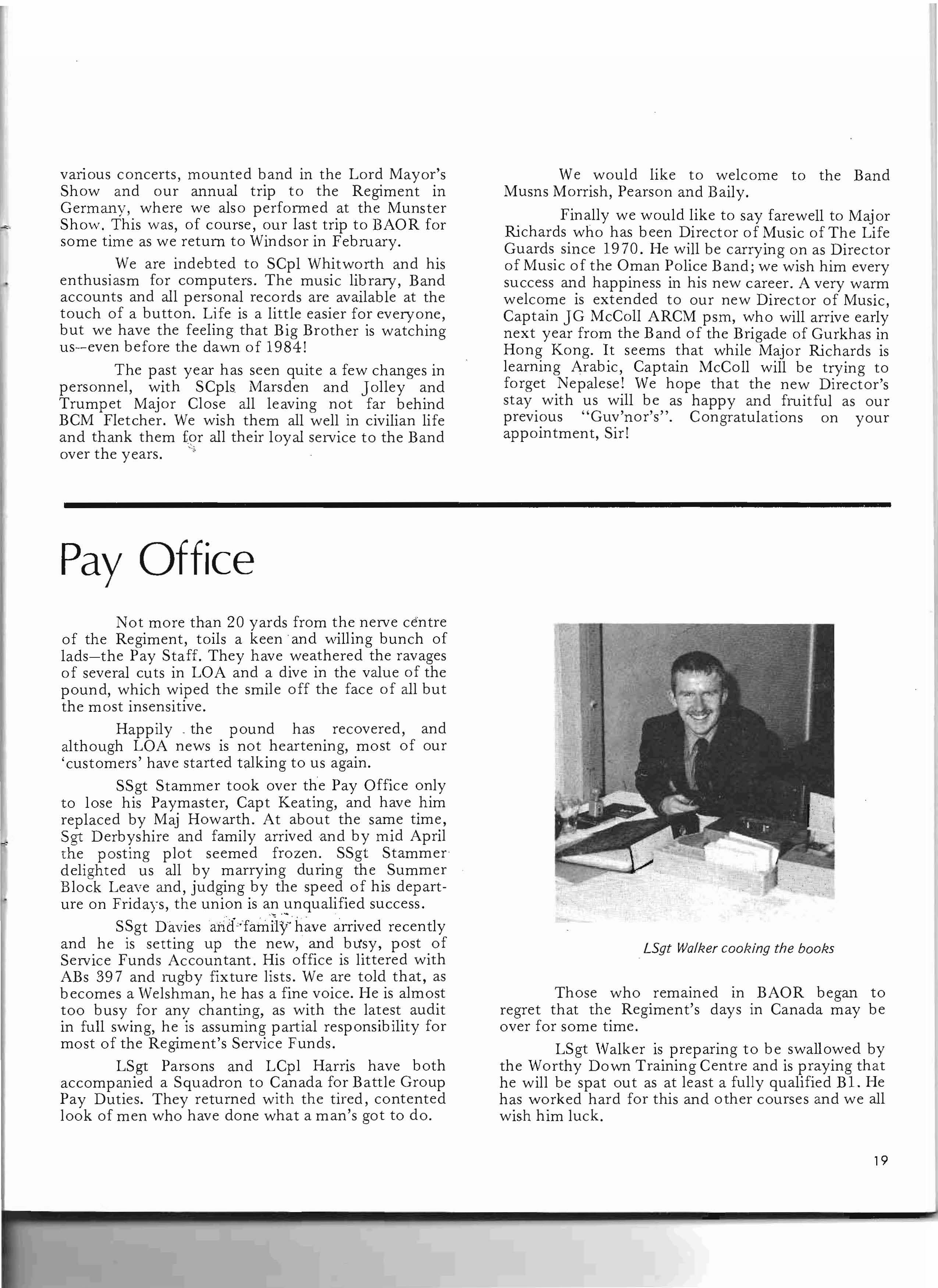
LSgt Walker cooking the books
Those who remained in BAOR began to regret that the Regiment's days in Canada may be over for some time.
LSgt Walker is preparing to be swallowed by the Worthy Down Training Centre and is praying that he will be spat out as at least a fully qualified B 1. He has worked hard for this and other courses and we all wish him luck.
Sgt Derbyshire is looking for the screws for his MFO boxes, discarded only seven months ago. He is our advance party to Windsor and doesn't seem to mind at all. More postings are in the wind and LSgt Parsons will be getting married and going to Hong Kong in the time it takes to say "Why him, lucky devil".
Meanwhile, the new Paymaster has trouble with these foreign Pfennig things and is looking forward to serving in Windsor, where there are at least 12 pennies to the shilling-aren't there?
Once again, it has been a busy year with two Squadrons joining Battle Groups in Canada.
The main event of the year was the Presentation of New Standards. All the Senior NonCommissioned Officers of D Squadron returned to England with their Squadron to take part in the parade. Several other Mess Members attended the parade and the garden party. RCM J Leighton commanded the Drum and Standard Party and the RCM designate WOI C R Slater carried the Sovereign Standard.
At the end of May, the Mess dined out Regimental Corporal Major J Leighton and we congratulated him on his promotion to the other Mess.
Colonel Emson was also dined out at the beginning of July, during which occassion the Commanding Officer made a presentation to the Mess of a painting of 'Cairo'.
During annual firing at Hohne, the WOs and NCOs challenged the Officers to a game of cricket. This was an excellent match conducted in an extremely gentlemanly manner. However, it did become necessary for there to be a loss of conduct on behalf of the NCOs. To avoid a possible disaster, the opposition's demon bowler, namely Lt (Fiery Fred) This manoeuvre was carried out in style by bundling the said Officer into the boot of a convenient Rolls Royce. Unfortunately the RQMC, who had agreed to score, failed to ensure the WOs and NCOs had the highest total, and the Officers won by three runs.
In addition to the garden which is now at the rear of the Mess, we have been able to build a brick barbecue. This was presented by 35 Engr Regt RE who were staying in barracks and building new kennels for the Weser Vale Hunt. This has been given maximum use and the excellent summer has led to its success.
The Colonel of the Regiment honoured the Mess with a visit and in doing so, presented Long Service and Good Conduct Medals to the following members-SQMC Swallow, SCpl Mills, CoH Boots and LSgt Farnen.
Unfortunately this year we are unable to accommodate the large group of ex members on their annual brick-hanging pilgrimage. Due to barrack modernisation and the imminent return to UK, accommodation is extremely tight. However, some of the old hands will no doubt still make their own arrangements.
The ladies of the Mess have recently enjoyed a formal dinner arranged by the PMC, SCM Rennie, and his Committee. This gave the ladies an opportunity to enjoy a super meal while the husbands were left waiting in the bar.
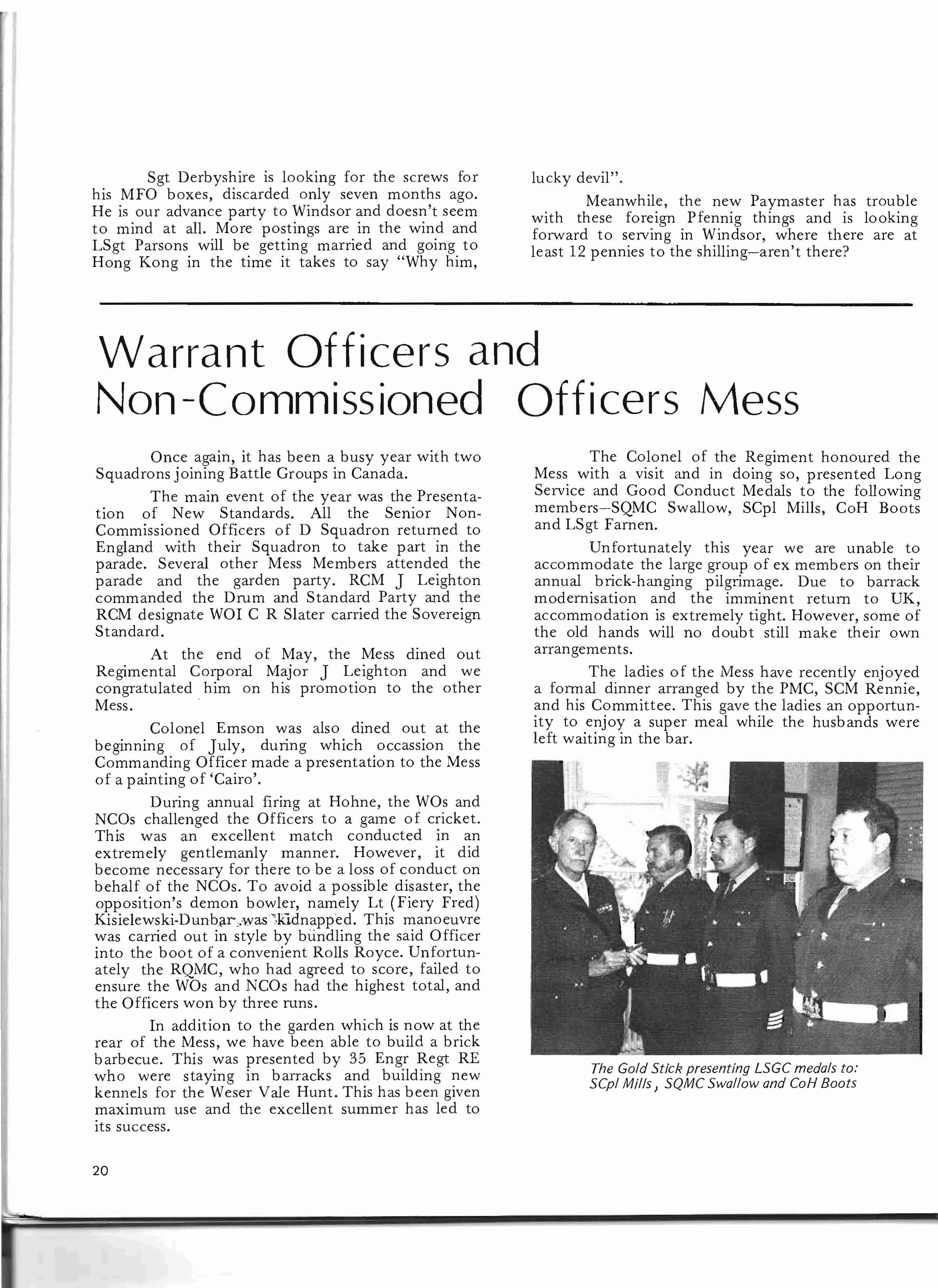
The Mess Football Team are to be congratulated for their excellent performance last season in winning the Detmold Garrison Sergeants' Mess Football Trophy.
We have said farewell to the following Mess Members: WOI Leighton, W02s Townsend, Whyte, Docherty, and KelIy, CsoH Wright, Theakston, McDermott, Cavin, Hickman and Co ffey.
The Senior Members of the Mess are RCM C R Slater, ASM P Williams, RQMC J Lloyd, RQMC (E) Daysmith, SCMs Knowles, Willis, Rennie, Allen and Land; W02s Milne, Digney, Richards, ORQMC Walsh, AQMS Lyon and Dutton and W02 Collins (ACC).
D Sqn were asked to represent the Regiment on Horse Guards in May 1983, when Her Majesty The Queen would present new Standards to her Household Cavalry. The previous occasion had been 30th May 1973 when the Regiment had been represented by C Sqn who were mounted in Ferret Scout Cars. As tank regiments in those days had their own recce troops equipped with Ferrets, there was little problem training the required number of drivers. Since those days, tank regiments have lost their recce troops, although they are to be reintroduced in 1984. D Sqn were to use the Fox, the wheeled CVR series vehicle with a turret mounted Rarden gun.
a few Fox for driver training, SCpl Lowry eagerly set about his task of converting drivers used to tanks into the more delicate mode of driving a wheeled recce vehicle. CoH Evans handled the gunnery familiarisation with his usual high standard, while SCpl (SQMC) Bishop was proudly staridi:1g in his office which had temporarily been transformed into bespoke tailors. However, the only suit he issued was made in a strange, disruptive pattern of green brown and black, more normally referred to as combat kit. Yes-everyone was issued a new combat kit, beret, KF shirt, puttees and DMS boots.
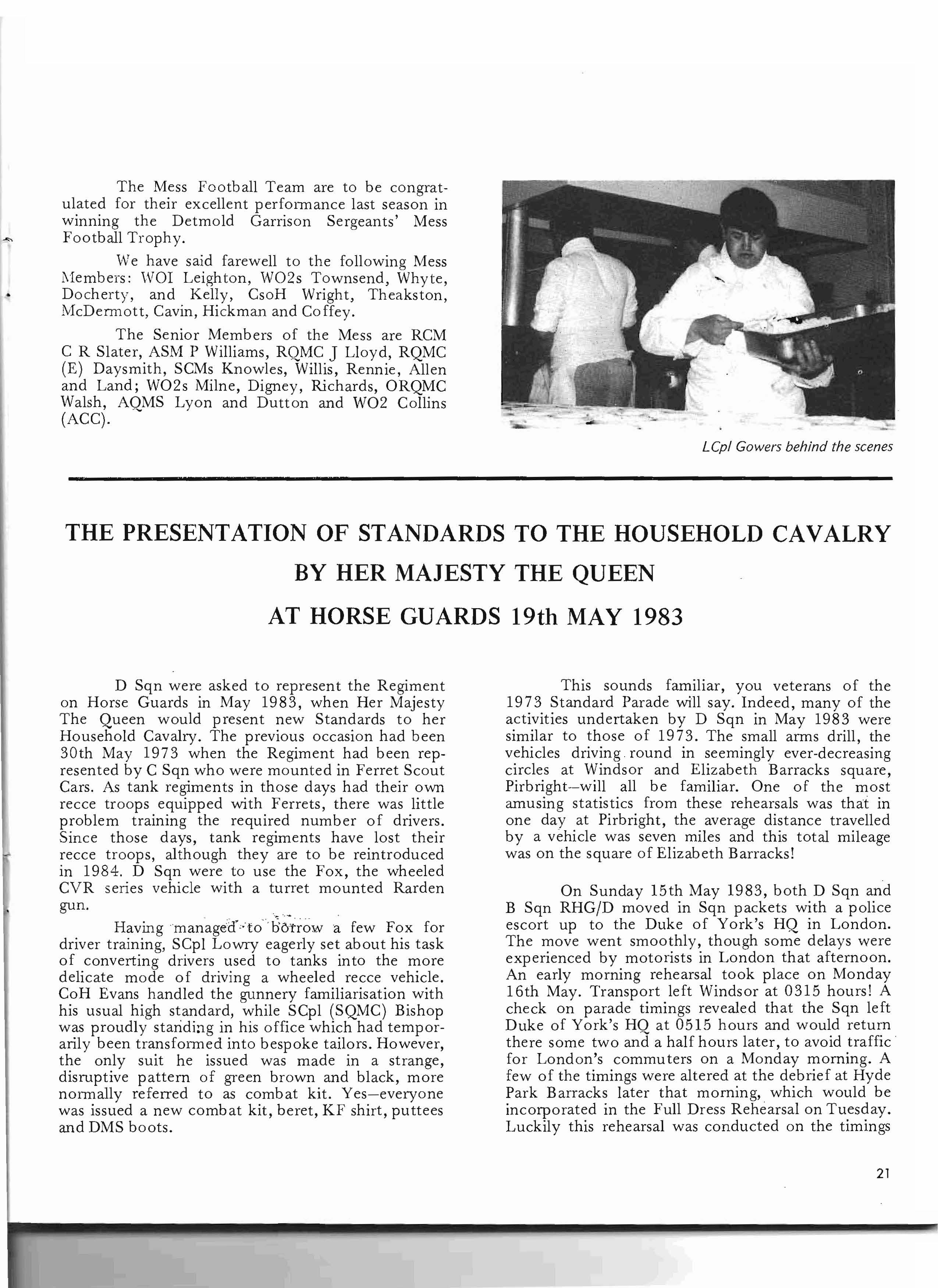
This sounds familiar, you veterans of the 1973 Standard Parade will say. Indeed, many of the activities undertaken by D Sqn in May 1983 were similar to those of 1973. The small arms drill, the vehicles driving round in seemingly ever-decreasing circles at Windsor and Elizabeth Barracks square, Pirbright-will all be familiar. One of the most amusing statistics from these rehearsals was that in one day at Pirbright, the average distance travelled by a vehicle was seven miles and this total mileage was on the square of Elizabeth Barracks!
On Sunday 15th May 1983, both D Sqn and B Sqn RHG/D moved in Sqn packets with a police escort up to the Duke of York's HQ in London. The move went smoothly, though some delays were experienced by motorists in London that afternoon. An early morning rehearsal took place on Monday 16th May. Transport left Windsor at 0315 hours! A check on parade timings revealed that the Sqn left Duke of York's HO at 0515 hours and would return there some two and a half hours later, to avoid traffic for London's commu ters on a Monday morning. A few of the timings were altered at the debrief at Hyde Park Barracks later that morning, which would be incorporated in the Full Dress Rehearsal on Tuesday. Luckily this rehearsal was conducted on the timings
to be used on Thursday 19th May on the Standards Parade itself. We left Duke of York's HQ at 1015 hours and were back there at about 1230. The debrief that afternoon confirmed that the timings altered as a result of the early morning rehearsal, were a success and they would be used for the Standards Parade on the Thursday. Wednesday was spent on final cleaning and inspection of both vehicles and uniforms.
At last the day of the Parade arrived. We were lucky with the weather (as a lot of important parades are not) and everyone was present, immaculate and detennined to have a good parade. Fingers crossed, drivers started the vehicles and all were working. Well, that was one problem which didn't occurbut what about the worst of all-a vehicle not starting when on Parade? We would have to wait. We drove onto Horse Guards and formed up in two ranks of vehicles against the curb of the road, by Horse Guards Memorial. Crews dismounted. We waited for the Household Cavalry Regiment in their magnificent uniforms to appear. A quick glance at the clock above Horse Guards Arch showed that it was 1045 hours and the Mounted Sqns were forming up. The Lieutenant Colonel Commanding Household Cavalry took over the Parade and the Old Standards were received on Parade with a Royal Salute. Her Majesty The Queen arrived on Parade at 1100 hours precisely, escorted by the Queen's Life Guard, and was received by the two Goldsticks and conducted to the Dais'.
The format of the Parade closely resembled that of 1973. The Old Standards were trooped, an event which only happens with the Household Cavalry, and then left the Parade. The Silver Kettle Drums were brought to the centre of the Parade and the New Standards placed upon them. A service of consecration took place and was immediately followed by Her Majesty presenting the New Standards, brought forward by Capt B P Payne and Capt L A Lumb, to the Commanding Officer, Lt Col J B Emson, who in turn handed them to the Corporal Majors. One Spyereign's Standard and three Squadron (or Union) Standards were presented. Her Majesty then addressed the Parade, highlighting the changing roles and locations that the Household Cavalry had experienced since 1973. In particular, Her Majesty mentioned the outrage of the bomb attack on the Queen's Life Guard in July 1982. The Silver Stick-in-Waiting replied to Her Majesty on behalf of the Household Cavalry. The Standard Parties rejoined the Mounted Squadrons who then walked and trotted past.
As soon as the band started playing for the walk past, the two Armoured Sqns started up their vehicles. Luckily the music disguised the noise and no horses reacted violently. All the vehicles started-to
our great relief. Once the Mounted Regiment had trotted past the front of D Sqn, Maj V A L Goodhew, in his Sultan Command vehicle, quickly followed on its heels and led the Armoured Sqns March Past. Behind the Sqn Ldr were his 2IC Capt I S Forbes Cockell, also in a Sultan and SCM Kelly in his Ferret. Behind SHQ were four troops of four Fox each. The Fox troop leaders were Lt J C Hopkins, 2Lt J R Cape, 2Lt W A M Oswald and SCpl Lowry. Last, but by no means least, was the Spartan troop led by Capt J D Boldero. The days of rehearsing the controlled wheding moves paid off and the drivers must be congratulated on a superb job. They had to position their vehicles precisely at all times without the aid of the vehicle Commanders' advice on the radio. All who watched the Parade witnessed a top class performance from D Sqn and the video of the Parnde will prove just that. The Armoured Sqns followed Her Majesty and the Mounted Regiment off Horse Guards and up the Mall to Buckingham Palace. This was also conducted without the Commanders or drivers using their radios. When the Armoured Sqns reached Birdcage Walk, they were allowed to don headsets and move back to Duke of Yorks HQ with a police escort.
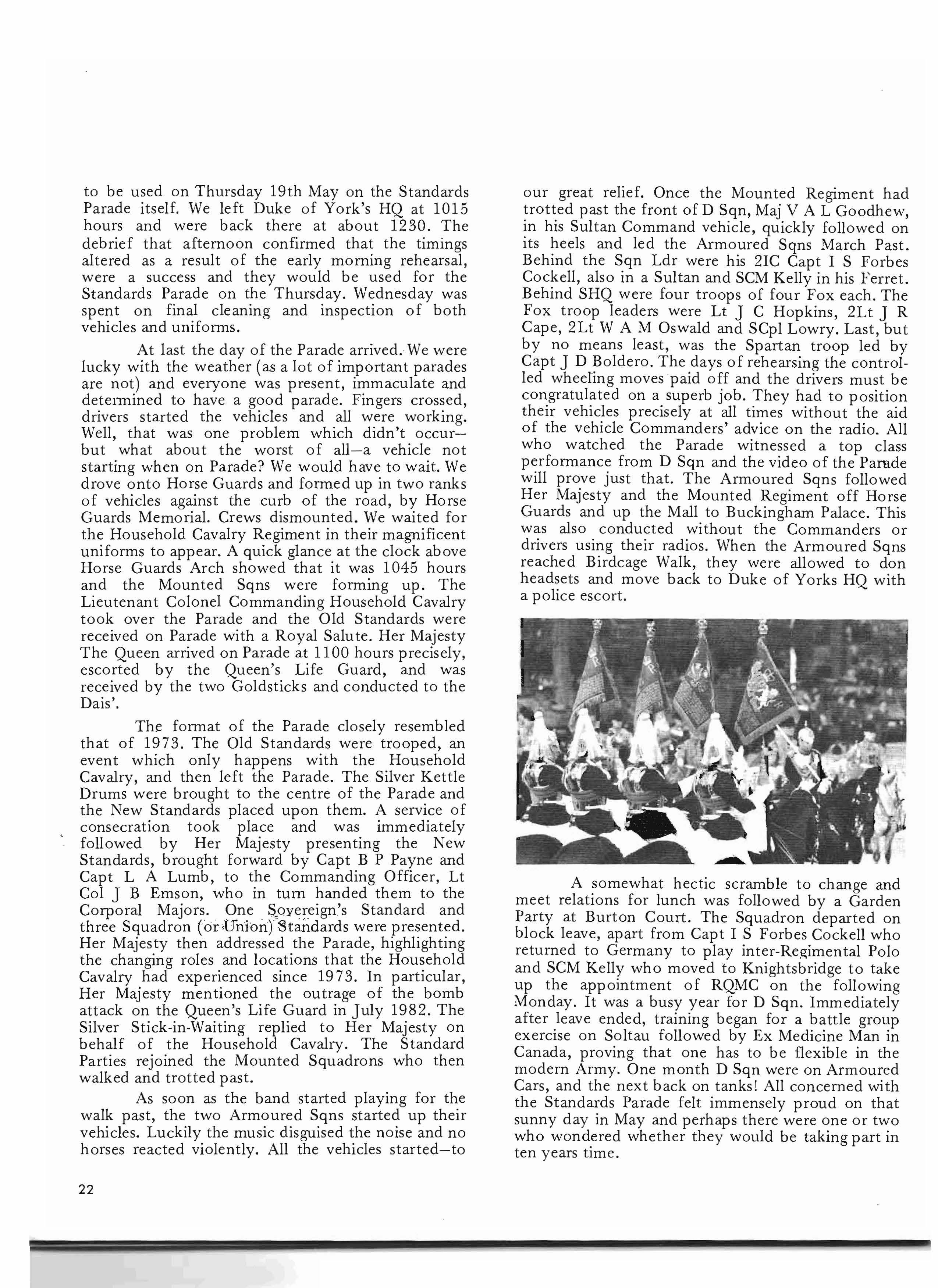
A somewhat hectic scramble to change and meet relations for lunch was followed by a Garden Party at Burton Court. The Squadron departed on block leave, apart from Capt I S Forbes Cockell who returned to Germany to play inter-Regimental Polo and SCM Kelly who moved to Knightsbridge to take up the appointment of RQMC on the following Monday. It was a busy year for D Sqn. Immediately after leave ended, training began for a battle group exercise on Soltau followed by Ex Medicine Man in Canada, proving that one has to be flexible in the modem Army. One month D Sqn were on Armoured Cars, and the next back on tanks! All concerned with the Standards Parade felt immensely proud on that sunny day in May and perhaps there were one or two who wondered whether they would be taking part in ten years time.
Not only does the author have to support the Regimental team in all weathers, sometimes having to watch them play very much better teams; always trying but never quite making it, but he has to look at Chelsea's results after each match, only to find the results are no better at Stamford Bridge.
Such is the state of the game that only a gigantic transfusion of cash from the CO's fund to buy new players can save us.
But really, it's not that bad. The truth is that towards the end of the season the Regimental team played very well indeed. So well that they only lost one game from the last ten played. Admittedly we left our form too late to make any impression on the various competitions entered, but the signs were there for next year.
We reached the semi finals of the 4 Div Cup and beat 25 Regt RA by 4 goals to 2. At last some success for a lot of hard running and the chance to play in the final! But it was not to be. We were informed that owing to an Administrative error we would have to play another semi final against yet another team. This time we were not so lucky and although we played well, we were beaten by 22 Sig Regt 2-1. The Signals incidently had 6 Corp players in the team, but they were lucky to win by the odd goal.
It was a particularly annoying result as the team played well and secretly fancied their chances against 28 Amph Regt, the eventual winners-who were also Army Champions. We had played them in a League game earlier in the season and had given them a good hard game. We had obviously risen to the occasion and had for a long time outplayed them in most departments of the game.
Our run in the Cavalry Cup fared better until \\'e were beaten by the 13/18 Hussars in the quarter final. 'The Lillywhite's' caught us cold and scored in the very first minute. They quickly followed up with another goal. It was this second goal that brought some life to our team. a,pd froIP then on there really was only onete'ain' hi"it'. We dominated the game from that moment, quickly scoring a goal and although we had all the play, could not get the ball into the net again. It doesn't matter how many times the ball hits the crossbar or post-it's goals that count! The whole team gave everything-a typical Cavalry Cup Match, which had the spectators shaking their heads about what might have been.
Although the team are three or four regular team members' short, it is difficult to get new talent to come forward. Perhaps we could find the volunteers if we had more success. However it is only
the constant introduction of new talent that will provide that success. Perhaps having read this plea, it will encourage some new players to come forward. If nothing else it will save the CO's fund the purchase. As for Chelsea, well-their problems are even greater than ours!
The members of the team have been:Goal Keepers: Smithers, Cairncross. Back Fours: Fitpatrick, Nutt, Harvey, Godson, Stillwell. Midfield: Ingram, McKielty. Front: McCance, Bellringer, Lowe.
This year has proved to be our most successful in the Club's history. As hoped last year we took the 3-man team event at the BAOR championships, proving that The Life Guards are a successful fencing regiment again.
The team, consisting of LCoH Margan (Epee), LCpl Evans (Foil) and TPR Smith (Sabre) produced an excellent eHort against very strong opposition, including a strong 25 Eng Regt team who, for so long now, have dominated Army fencing.
Our team was placed third at the Army championships in May, only being beaten by a strong Air Corps and Depot REME team. Depot REME boasted both Jim Fox and Pete Twine who were World Class Pentathletes until recently. With hard work and training our team has every chance of next year. Mention must be made of LCpl Evans who has improved so much this year, he reached the direct elimination stage at the Army championships at foil and sabre. He also qualified, along with LCoH Margan, for the Royal Tournament at Earls Court. Both fencers have now represented BAOR at the RAF Germany International match in September 1983.
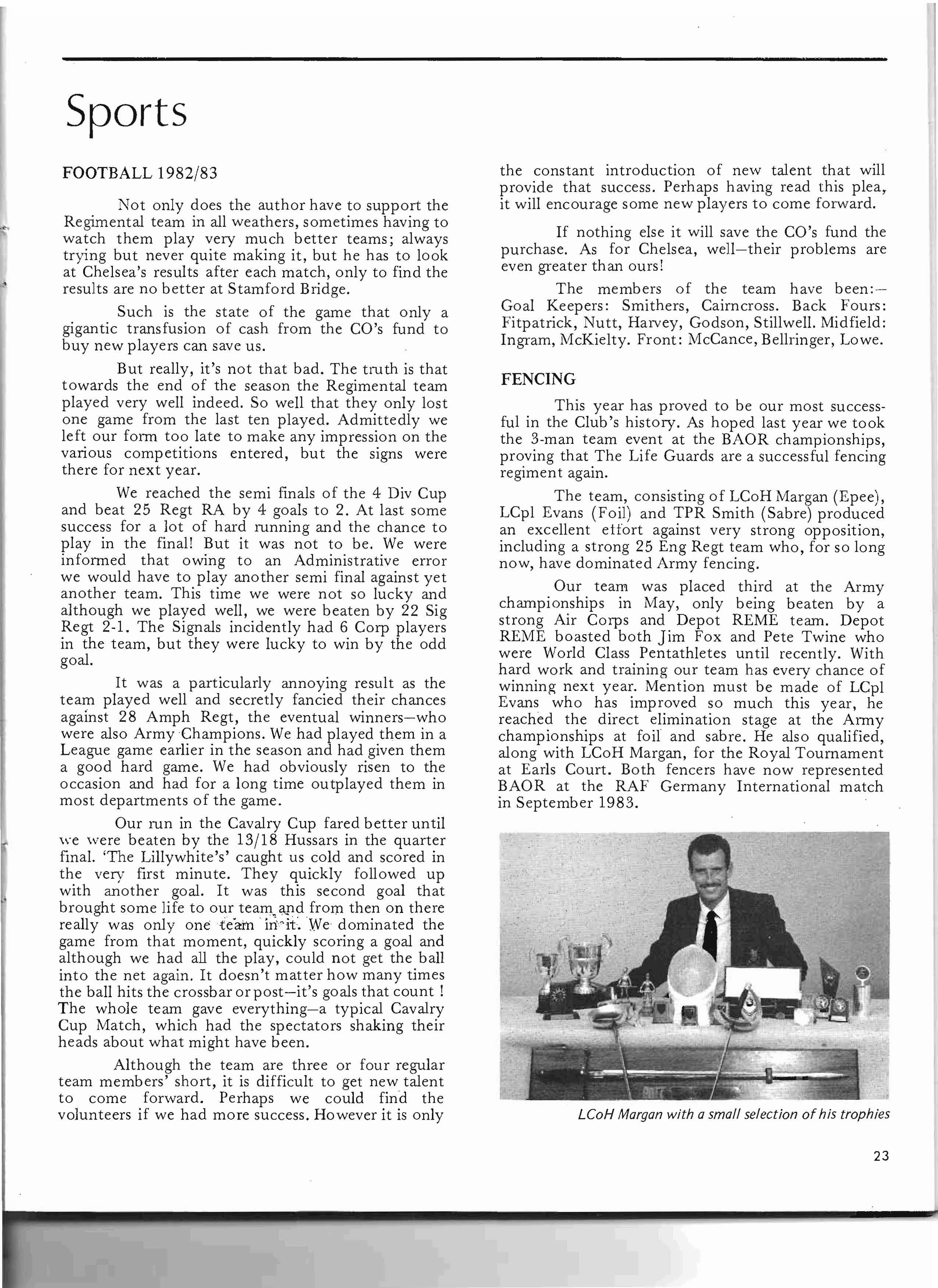
LCoH Margan with a small selection of his trophies
LCoH Margan has had an excellent season which started in March 1983 with him being selected to fence for Great Britain against Canada and Finland. His best results were as follows for 1983:
1st Norfolk Open, 1st Royal Tournament Senior Epee, 1st London Section Senior Epee, 1st Pelling Sword one hit open, 2nd Meadowbank (Scotland) open, 2nd BAOR championships and finally 4th in the Army championships.
He represented combined services against All England club, and also represented London against the Rest of Great Britain. An excellent string of results due in no small measure to support and time afforded him by the Regiment.
Sennelager Ranges in the middle of winter is perhaps one of the most inhospitable areas of Germany. Certainly this year we had more than our fair share of bad weather, which was hardly conducive to good shooting.
However, shooting is treated the same as all other sports in today's Modern Army; and the team had to continue, knowing that other teams would be hard at it in order to produce the desired results at the Divisional Skill At Arms Meeting.
We had started training this year as early as November, with the shooting Officer, Capt Lumb, entering two teams in the Rhine Army Small Bore Competition. It is appreciated that there is not a lot of compatibility between Small Bore and Full Bore, but it seemed to be an ideal filter for soldiers who had professed an interest in shooting. As they were expected to train in their own time, only the keenest continued to attend!
The team practised long and hard, and it was with some consternation that the team captain discovered that the actual competition match for two teams would take a total of 36 hours of continuous shooting. A command decision reduced our participation to '
, Considering it was the' first attemp t at such a competition, the author was pleased for the team to be placed second in 4 Armd Div and eighth in BAOR. Two individuals, LCoH Rodwell and LCpl Homer were placed tenth and eleventh respectively in the BAOR individual competition.
Our next priority was to qualify for the big one: Bisley. For the uninitiated, Bisley is a Full Bore competition.
, A quick selection procedure produced a squad of twelve soldiers who would be reduced to the final
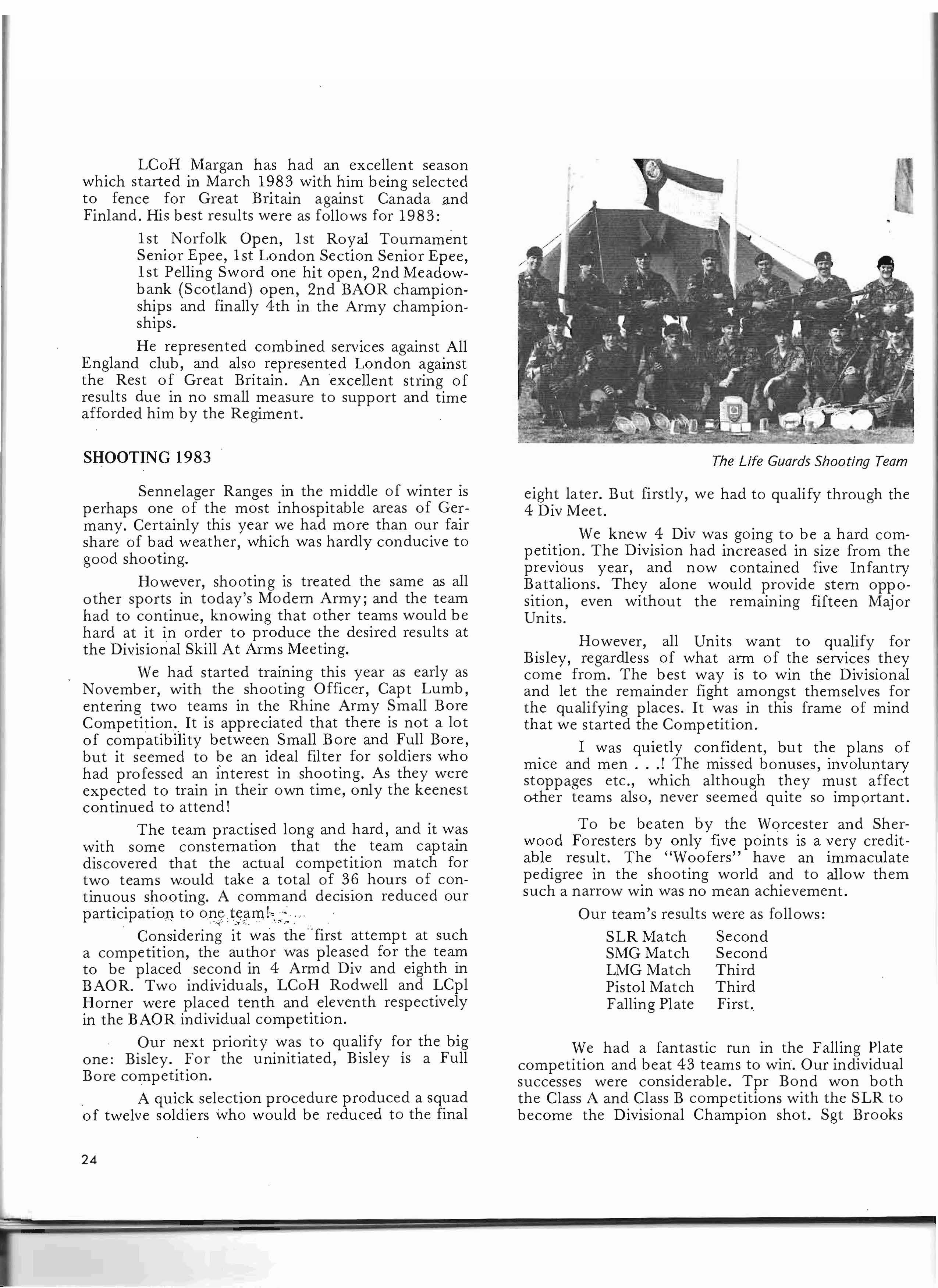
Life
eight later. But firstly, we had to qualify through the 4 Div Meet.
We knew 4 Div was going to be a hard competition. The Division had increased in size from the previous year, and now contained five Infantry Battalions. They alone would provide stern opposition, even without the remaining fifteen Major Units.
However, all Units want to qualify for Bisley, regardless of what arm of the services they come from. The best way is to win the Divisional and let the remainder fight amongst themselves for the qualifying places. It was in this frame of mind that we started the Competition.
I was quietly confident, but the plans of mice and men ... ! The missed bonuses, involuntary stoppages etc., which although they must affect other teams also, never seemed quite so important.
To be beaten by the Worcester and Sherwood Foresters by only five points is a very creditable result. The "Woofers" have an immaculate pedigree in the shooting world and to allow them such a narrow win was no mean achievement.
Our team's results were as follows:
SLR Match Second
SMG Match Second
LMG Match Third
Pistol Match Third Falling Plate First.
We had a fantastic run in the Falling Plate competition and beat 43 teams to win. Our individual successes were considerable. Tpr Bond won both the Class A and Class B competitions with the SLR to become the Divisional Champion shot. Sgt Brooks
was runner up in the Class A SLR competition. He did better in the SMG competition - he won, and so we had another Divisional Champion. Not to be outdone, Tprs Reynolds and Bright, who will have more success at Bisley, became the Divisional Champions on the LMG pairs.
So, with five individuals in the Divisional top 20, on the SLR we were satisfied that we had just failed to a better team on the day.
And so to Pirbright, where we were once again hosted by the Guards Depot for our Bisley training. Pirbright is an ideal location for very obvious reasons. The only disconcerting feature is the inevitable sharing with the 'big boys' of the shooting world.
It was apparent from the beginning that both the Welsh Guards and 1 Battalion Grenadier Guards teams were going to do well in the competitions. Events were to prove this to be true.
It is also disconcerting to find that such teams rarely drop from a maximum on individual shoots! But then that just proves that practice makes perfect. Well, perhaps nothing is ever perfect, but there can be no denying that shooting is all about practice and concentration.
Shooting at Bisley is no different from other sports, in that it. is of great importance to peak at the correct time. Our team, in retrospect, peaked too early. It was apparent to the team captain that we had reached a crest, and were running into the inevitable bad patch.
With a week to go before the start of the only course open was to continue and attempt to fire through it; but, as so often happens, fate took a hand. As a result of an accident involving civilian interests, the range was closed for five days prior to the competition. So we were left with our 'low' as the first rounds were fired, but all was not lost. We did fire below fonn, but then how much of this was due to the situation outlined or to nerves, is not certain.
The team still put up a very commendable result. Our SLR shooti,ng results we knew we were capal:ile-';of, but ·even so we were below fonn. We still managed to stay in the top third of all the competitions and produced some good individual scores.
Tpr Reynolds had the agony of waiting for two days to see if any of the 720 competitors would beat his score in The Whittaker Trophy. With only a couple of hours to go the inevitable happened when a Grenadier scored 49 out of a possible 50. Reynolds was not the slightest perturbed in the shoot off. His score of 41 took the Trophy and so our first Bisley Trophy had been won.
Tpr Bond was not so fortunate. He also became involved in a shoot off in the B Class for the Henry Whitehead Cup, but just failed to take the Gold. The Silver, however, was a fine effort.
So two Life Guardsmen were involved in the final Gold position in two of the individual competitions of Bisley: one won and the other came second. We could not have asked for a better start -a gold and a silver.
The SMG had proved to be our downfall last year and we had spent many hours of practice to ensure that we would not be found wanting this year. All to no avail - if anything, our results were worse this year than last with this weapon that is fast becoming our 'bogie'. Our results in practice were as good as most, but on the day they bore little relation to those achieved in training. Strange, but if anyone reading this can offer a reason why, I would be delighted to hear from them!
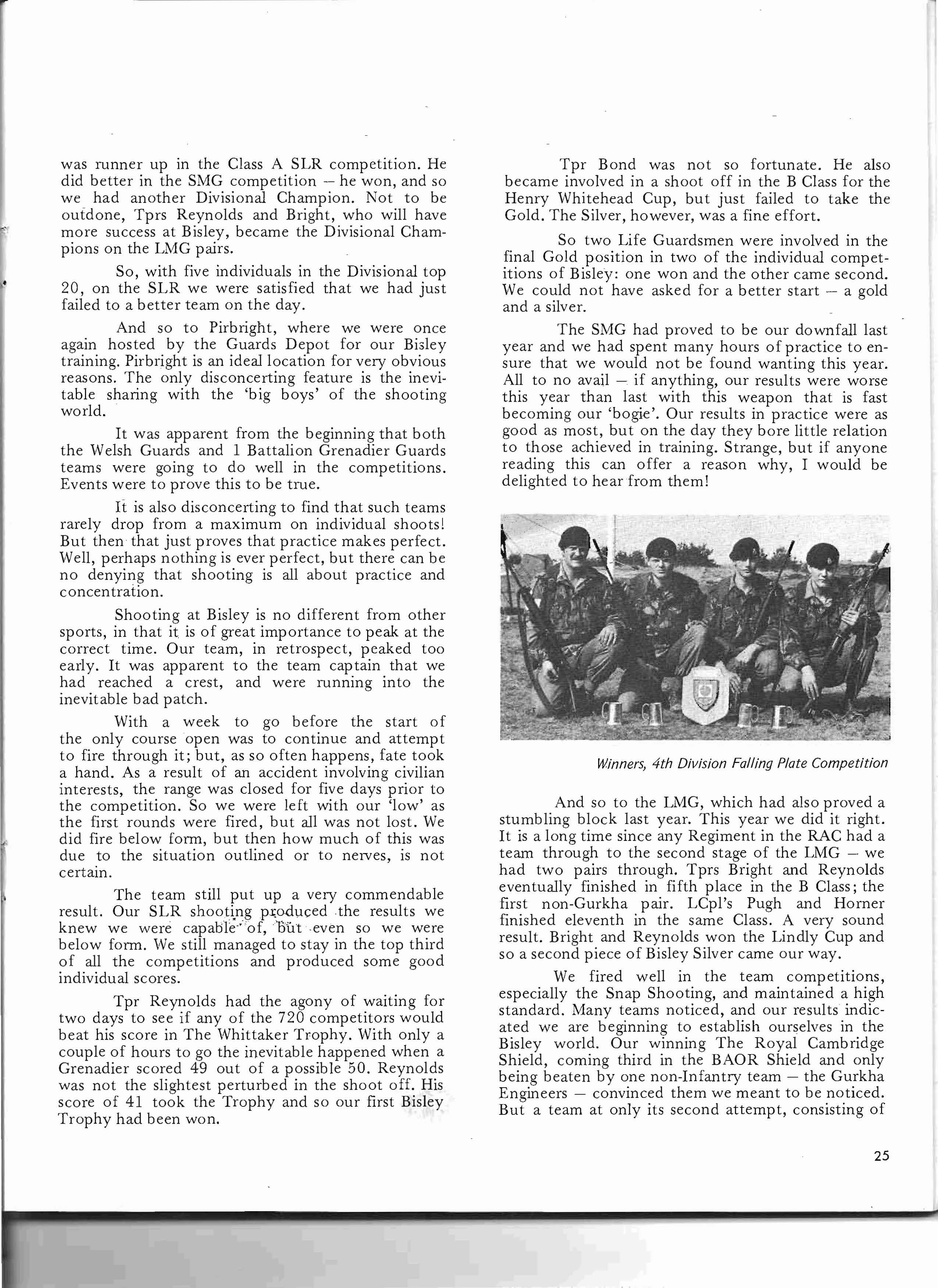
And so to the LMG, which had also proved a stumbling block last year. This year we did it right. It is a long time since any Regiment in the RAC had a team through to the second stage of the LMG - we had two pairs through. Tprs Bright and Reynolds eventually finished in fifth place in the B Class; the first non-Gurkha pair. LCpl's Pugh and Homer finished eleventh in the same Class. A very sound result. Bright and Reynolds won the Lindly Cup and so a second piece of Bisley Silver came our way.
We fired well in the team competitions, especially the Snap Shooting, and maintained a high standard. Many teams noticed, and our results indicated we are beginning to establish ourselves in the Bisley world. Our winning The Royal Cambridge Shield, coming third in the BAOR Shield and only being beaten by one non-Infantry team - the Gurkha Engineers - convinced them we meant to be noticed. But a team at only its second attempt, consisting of
7 B Class shots, all under twenty-one - one of whom being a Bisley Champion, another a runner-up must be on its way. Certainly the 41 teams we beat, of which 21 were In fantry Battalions, think so!
1983 saw a far more energetic tennis season than normal. A fine start was made in the first round of the 4 Armd Div Championships with an emphatic 7-0 victory over 13/18 Hussars. However, we were knocked out by the eventual winners, 28 Amphibious Engineer Regiment, in the next round. Undeterred, the Regiment sent a very strong team to the BAOR Tennis Championships, which achieved some very promising results.
Major Stewart and Lt Ellis reached the Quarter finals of the Regimental doubles, Lt Ellis and Lt Fraser reached the Quarter finals of the Open doubles, and Lt Ellis reached the Semi finals of the Under 25 Men's Singles. With a little more practice, the Regiment can confidently look forward to a very successful season next year.
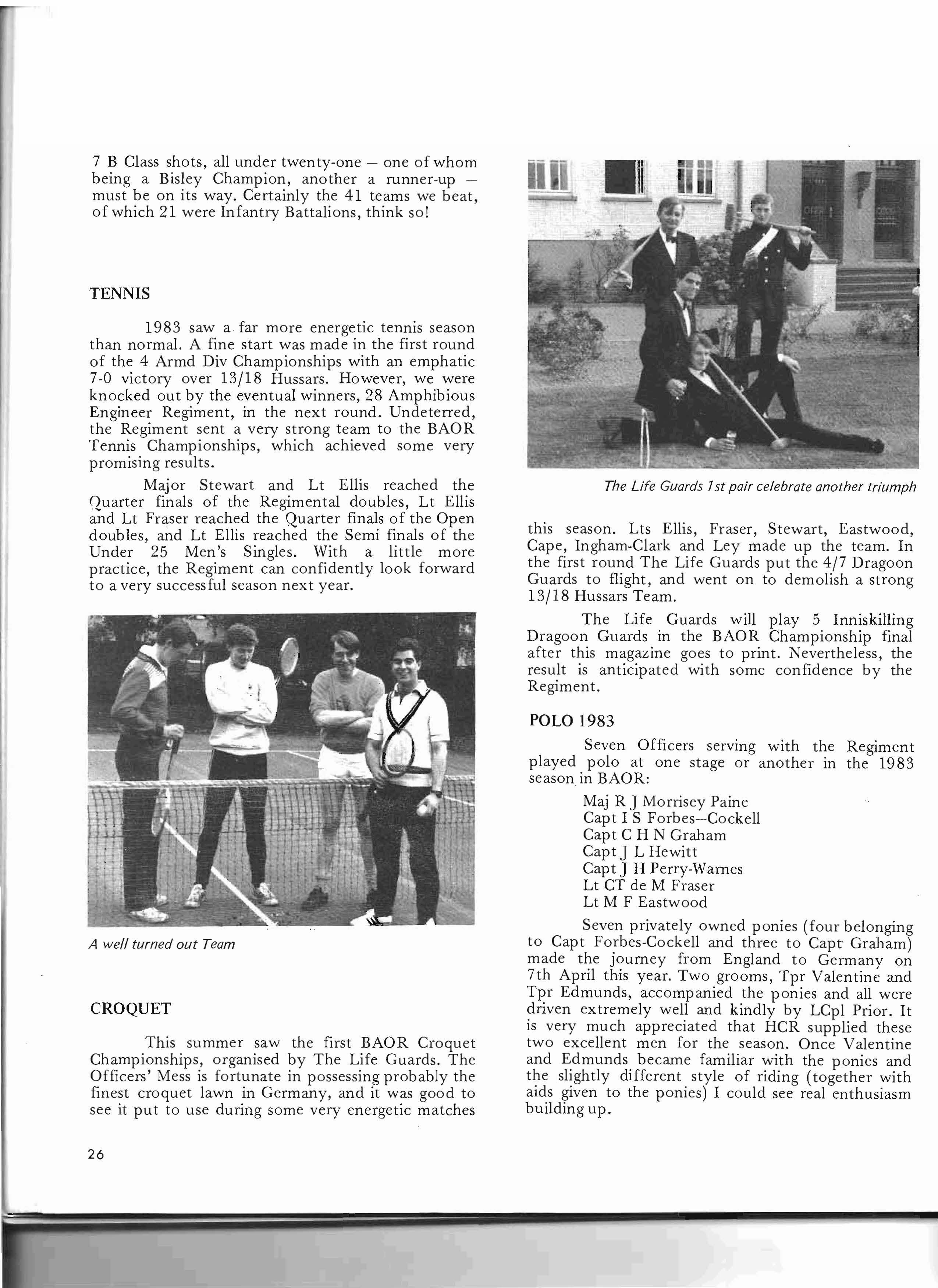
This summer saw the first BAOR Croquet Championships, organised by The Life Guards. The Officers' Mess is fortunate in possessing probably the finest croquet lawn in Germany, and it was good to see it put to use during some very energetic matches
The Life Guards 7st pair celebrate another triumph
this season. Lts Ellis, Fraser, Stewart, Eastwood, Cape, Ingham-Clark and Ley made up the team. In the first round The Life Guards put the 4/7 Dragoon Guards to flight, and went on to demolish a strong 13/18 Hussars Team.
The Life Guards will play 5 Inniskilling Dragoon Guards in the BAOR Championship final after this magazine goes to print. Nevertheless, the result is anticipated with some confidence by the Regiment.
Seven Officers serving with the Regiment played polo at one stage or another in the 1983 season in BAOR:
Maj R J Morrisey Paine
Capt I S Forbes-Cockell
Capt C H N Graham
Capt J L Hewitt
Capt J H Perry-Warnes
Lt CT de M Fraser
Lt M F Eastwood
Seven privately owned ponies (four belonging to Capt Forbes-Cockell and three to Capt Graham) made the journey from England to Germanv on 7th April this year. Two grooms, Tpr and Tpr Edmunds, accompanied the ponies and all were driven extremely well and kindly by LCpl Prior. It is very much appreciated that HCR supplied these two excellent men for the season. Once Valentine and Edmunds became familiar with the ponies and the slightly different style of riding (together with aids given to the ponies) I could see real enthusiasm building up.
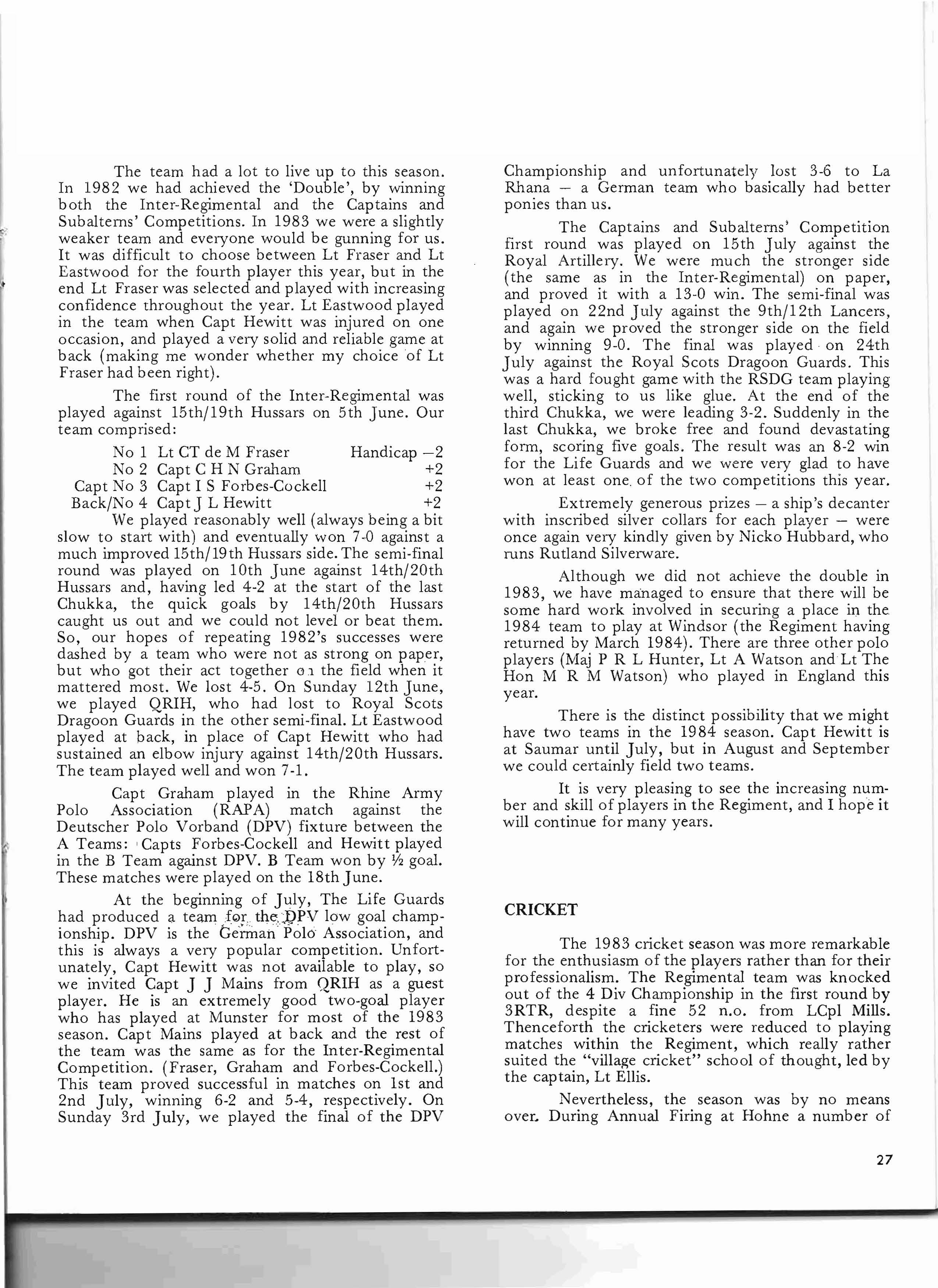
The team had a lot to live up to this season. In 1982 we had achieved the 'Double', by winning both the Inter-Regimental and the Captains and Subalterns' Competitions. In 1983 we were a slightly weaker team and everyone would be gunning for us. It was difficult to choose between Lt Fraser and Lt Eastwood for the fourth player this year, but in the end Lt Fraser was selected and played with increasing confidence throughout the year. Lt Eastwood played in the team when Capt Hewitt was injured on one occasion, and played a very solid and reliable game at back (making me wonder whether my choice of Lt Fraser had been right).
The first round of the Inter-Regimental was played against 15th/19th Hussars on 5th June. Our team comprised:
No 1 Lt CT de M Fraser Handicap -2
No 2 Capt CHN Graham +2
Capt No 3 Capt I S Forbes-Cockell +2
Back/No 4 CaptJ L Hewitt +2
We played reasonably well (always being a bit slow to start with) and eventually won 7-0 against a much improved 15th/19th Hussars side. The semi-final round was played on 10th June against 14th/20th Hussars and, having led 4-2 at the start of the last Chukka, the quick goals by 14th/20th Hussars caught us out and we could not level or beat them. So, our hopes of repeating 1982's successes were dashed by a team who were not as strong on paper, but who got their act together en the field when it mattered most. We lost 4-5. On Sunday 12th June, we played QRIH, who had lost to Royal Scots Dragoon Guards in the other semi-final. Lt Eastwood played at back, in place of Capt Hewitt who had sustained an elbow injury against 14th/20th Hussars. The team played well and won 7 -1.
Capt Graham played in the Rhine Army Polo Association (RAP A) match against the Deutscher Polo Vorband (DPV) fixture between the A Teams: 'Capts Forbes-Cockell and Hewitt played in the B Team against DPV. B Team won by Y2 goal. These matches were played on the 18th June.
At the beginning of July, The Life Guards had produced a team fQr, low goal championship. DPV is the German Polo Association, and this is always a very popular competition. Unfortunately, Capt Hewitt was not available to play, so we invited Capt J J Mains from QRIH as a guest player. He is an extremely good two-goal player who has played at Munster for most of the 1983 season. Capt Mains played at back and the rest of the team was the same as for the Inter-Regimental Competition. (Fraser, Graham and Forbes-Cockell.) This team proved successful in matches on 1st and 2nd July, winning 6-2 and 5-4, respectively. On Sunday 3rd July, we played the final of the DPV
Championship and unfortunately lost 3-6 to La Rhana -a German team who basically had better ponies than us.
The Captains and Subalterns' Competition first round was played on 15th July against the Royal Artillery. We were much the stronger side (the same as in the Inter-Regimental) on paper, and proved it with a 13-0 win. The semi-final was played on 22nd July against the 9th/12th Lancers, and again we proved the stronger side on the field by winning 9-0. The final was played on 24th July against the Royal Scots Dragoon Guards. This was a hard fought game with the RSDG team playing well, sticking to us like glue. At the end of the third Chukka, we were leading 3-2. Suddenly in the last Chukka, we broke free and found devastating form, scoring five goals. The result was an 8-2 win for the Life Guards and we were very glad to have won at least one. of the two competitions this year.
Extremely generous prizes -a ship's decanter with inscribed silver collars for each player - were once again very kindly given by Nicko Hubbard, who runs Rutland Silverware.
Although we did not achieve the double in 1983, we have managed to ensure that there will be some hard work involved in securing a place in the 1984 team to play at Windsor (the Regiment having returned by March 1984). There are three other polo players (Maj P R L Hunter, Lt A Watson and Lt The Hon M R M Watson) who played in England this year.
There is the distinct possibility that we might have two teams in the 1984 season. Capt Hewitt is at Saumar until July, but in August and September we could certainly field two teams.
It is very pleasing to see the increasing number and skill of players in the Regiment, and I hope it will continue for many years.
The 1983 cricket season was more remarkable for the enthusiasm of the players rather than for their professionalism. The Regimental team was knocked out of the 4 Div Championship in the first round by 3RTR, despite a fine 52 n.o. from LCpl Mills. Thenceforth the cricketers were reduced to playing matches within the Regiment, which really rather suited the "village cricket" school of thought, led by the captain, Lt Ellis.
Nevertheless, the season was by no means over. During Annual Firing at Hohne a number of
LCpl Sprague - a thoroughly professional cricketer
inter-Squadron matches were played on a very rugged pitch, which made Lt Kisielewski-Dunbar's bowling even more frightening than usual. 'A' Squadron emerged as the unbeaten winners, with CoH Douglas distinguishing himself with a fine display of the dying art of true leg-spin bowling. The highlight of the season was the Officers vs. NCOs match-notable for its spirit of fair play on the field and some erratic scoring off it. The Officers (cunningly captained by the Commanding Officer) narrowly defeated the NCOs under the RCM (who clearly had not seen a cricket bat for some years, and who certainly didn't see a cricket ball during his short but eventful innings). A most enjoyable season.
by Capt. Boldero
As we sit amongst the packing cases in Detmold, it is sad to think that we have had our last win ter's skiing, on this tour, in Bavaria. However, cast your mind back to last year, about mid-September.
It was then {that mystical group of decision makers)t'di:llsed :tl1aLour military commitments were too great to be able to run our own Snow Queen hut, as we have for the past 2 years. Thus we plugged ourselves into the system and bid for all available places with other huts.
This proved most successful, causing the minimum administrative burden, and yet still giving the maximum opportunity to the soldiers. The exact number to get away for the fortnightly courses now escapes me, but it was in the region of 60-70 soldiers. They all enjoyed themselves, and were instructed in both Langlauf or cross-country skiing,
as well as the ever-popular downhill skiing. Thankfully there were few injuries and everyone returned refreshed from their experiences.
Meanwhile, my attention was turned to the racing scene, for which the planning started just a little earlier. For those innocent readers digesting the Acorn in front of a log fire, it is hard to comprehend the difficulties and vast expense required to train a team of beginners to a standard at which we would reasonable expect results.
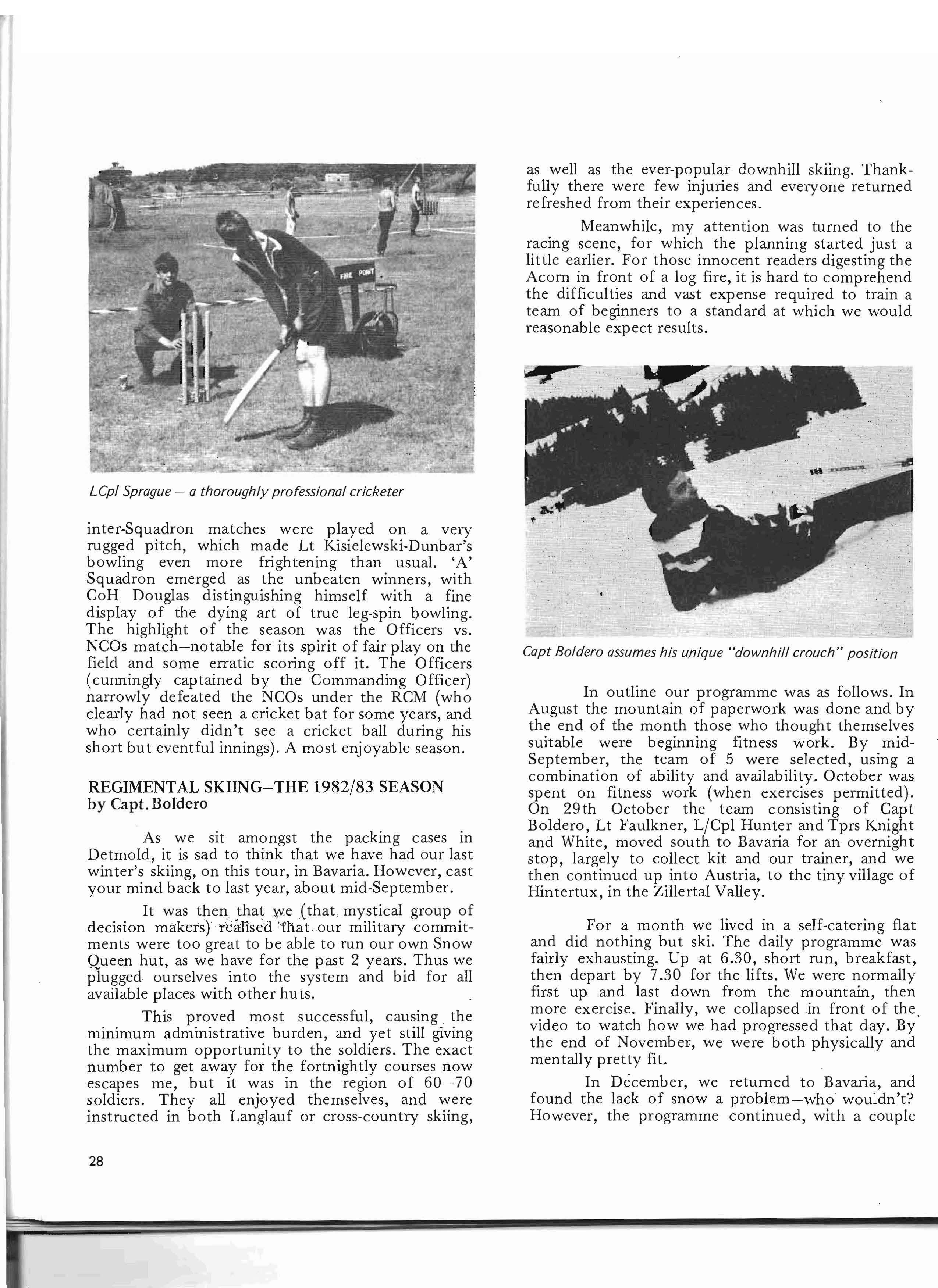
Capt Boldero assumes his unique "downhill crouch" position
In outline our programme was as follows. In August the mountain of paperwork was done and by the end of the month those who thought themselves suitable were beginning fitness work. By midSeptember, the team of 5 were selected, using a combination of ability and availability. October was spent on fitness work (When exercises permitted). On 29th October the team consisting of Capt Boldero, Lt Faulkner, L/Cpl Hunter and Tprs Knight and White, moved south to Bavaria for an overnight stop, largely to collect kit and our trainer, and we then continued up into Austria, to the tiny village of Hintertux, in the Zillertal Valley.
For a month we lived in a self-catering flat and did nothing but ski. The daily programme was fairly exhausting. Up at 6.30, short run, breakfast, then depart by 7.30 for the lifts. We were normally first up and last down from the mountain, then more exercise. Finally, we collapsed in front of the, video to watch how we had progressed that day. By the end of November, we were both physically and mentally pretty fit.
In December, we returned to Bavaria, and found the lack of snow a problem-who wouldn't? However, the programme continued, with a couple
of days' rest being allowed over Christmas, then into January and up to Ischgl for the races.
The initial seedings were not favourable, but the effect of this was to make us all the more determined. P.erhaps the easiest way to indicate our success is by the number of places gained during the race meeting. There were about 120 starters, and our seedings were in the 70's and up. By the end of the week, everyone (bar me) had gained at least 30 places and the average was 47. This was a most creditable perfonnance for the first year's racing. Sadly, the team did not qualify to take part in the Army races, but Lt Faulkner competed as an individual.
I am, perhaps, the wrong person to talk about injuries, but statistics show that out of the 3 years we have been skiing in Bavaria, a total of 387 soldiers have skied and not one has broken a bone-so to conclude this season I chose the Downhill practice session to do some acrobatics which resulted in breaking not one but two bones in my leg-c'est la vie! !
To conclude. Although the lack of snow was irritating, we managed to work round it (so to speak). However, both the Snow Queeners and the racers owe a very large debt of thanks to the behind the scenes people and for fear of sounding corny "without whom " Thanks!
Ten members of the Life Guards' Sub Aqua Club took part in a Diving Expedition to the Island of Elba from 23rd April-10th May 1983. Under the inspired instruction of CoH Wise and SCpl Read, the novice divers amongst us-a sizeable proportionwere able to gain experience in open water, while
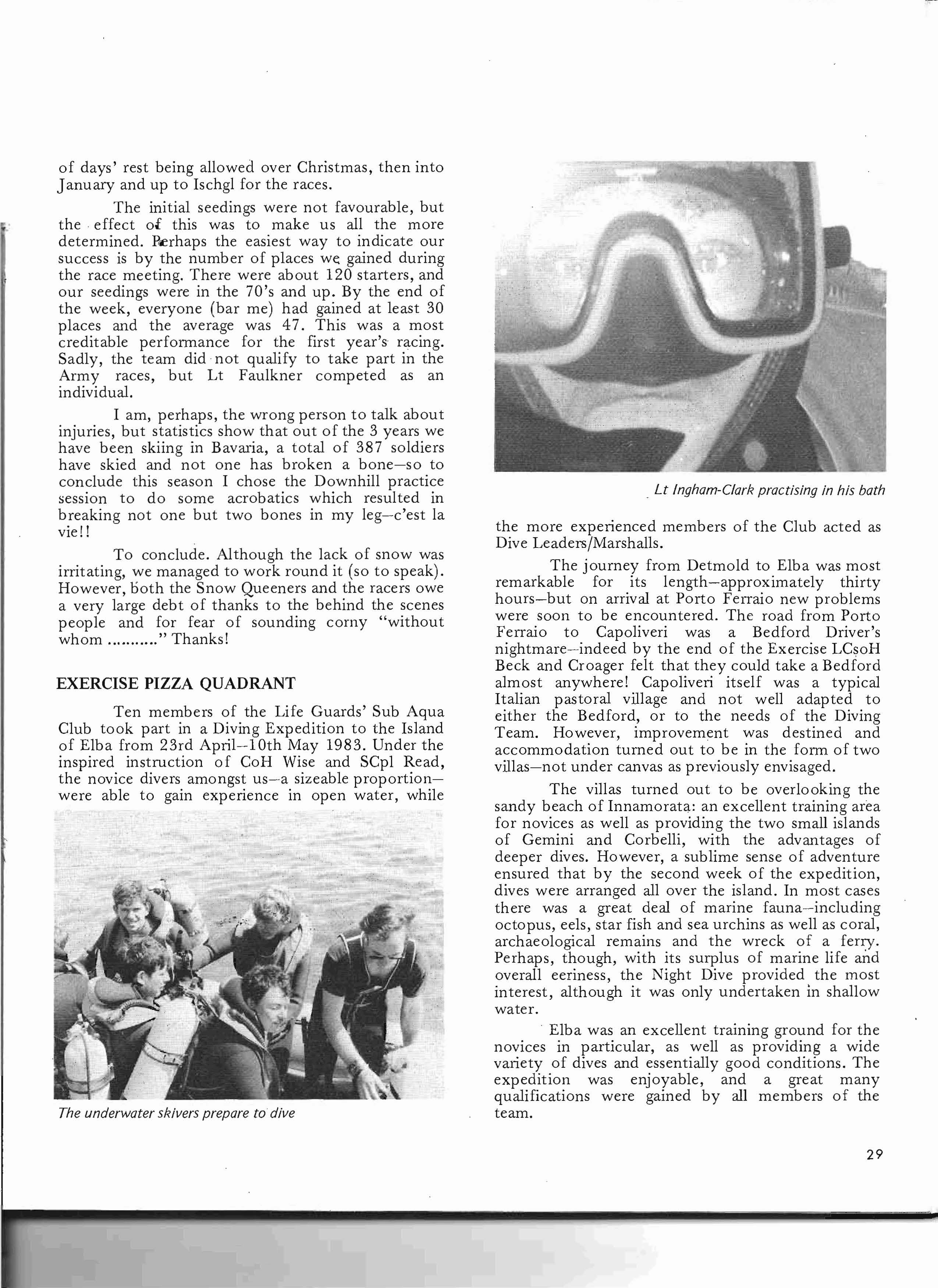
Lt Ingham-C1ark practising in his bath
the more experienced members of the Club acted as Dive Leaders/Marshalls.
The journey from Detmold to Elba was most remarkable for its length-approximately thirty hours-but on arrival at Porto Ferraio new problems were soon to be encountered. The road from Porto Ferraio to Capoliveri was a Bedford Driver's nightmare-indeed by the end of the Exercise LCsoH Beck and Croager felt that they could take a Bedford almost anywhere! Capoliveri itself was a typical Italian pastoral village and not well adapted to either the Bedford, or to the needs of the Diving Team. However, improvement was destined and accommodation turned out to be in the fonn of two villas-not under canvas as previously envisaged.
The villas turned out to be overlooking the sandy beach of Innamorata: an excellent training area for novices as well as providing the two small islands of Gemini and Corbelli, with the advantages of deeper dives. However, a sublime sense of adventure ensured that by the second week of the expedition, dives were arranged all over the island. In most cases there was a great deal of marine fauna-including octopus, eels, star fish and sea urchins as well as coral, archaeological remains and the wreck of a ferry. Perhaps, though, with its surplus of marine life and overall eeriness, the Night Dive provided the most interest, although it was only undertaken in shallow water.
Elba was an excellent training ground for the novices in particular, as well as providing a wide variety of dives and essentially good conditions. The expedition was enjoyable, and a great many qualifications were gained by all members of the team.
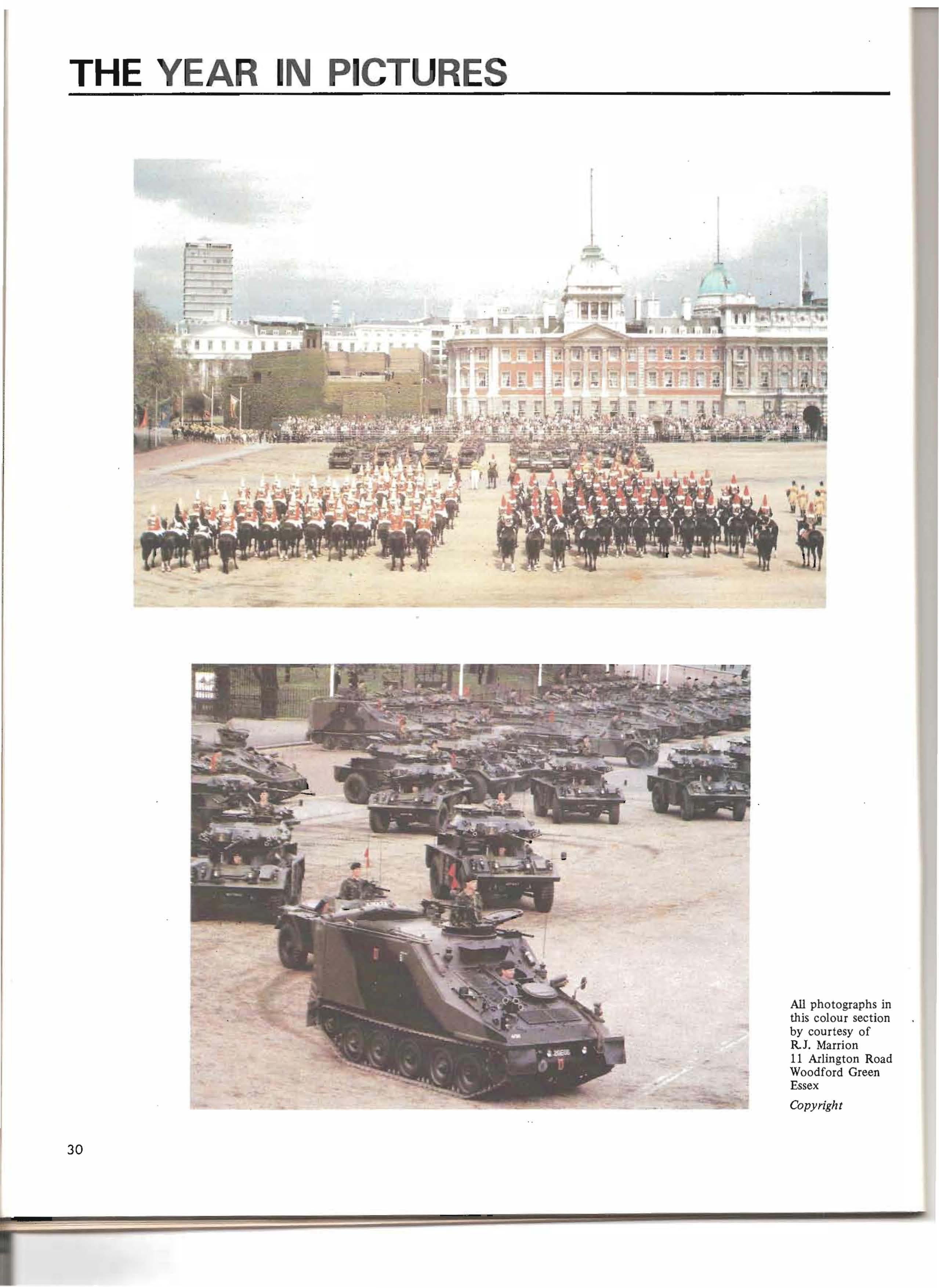
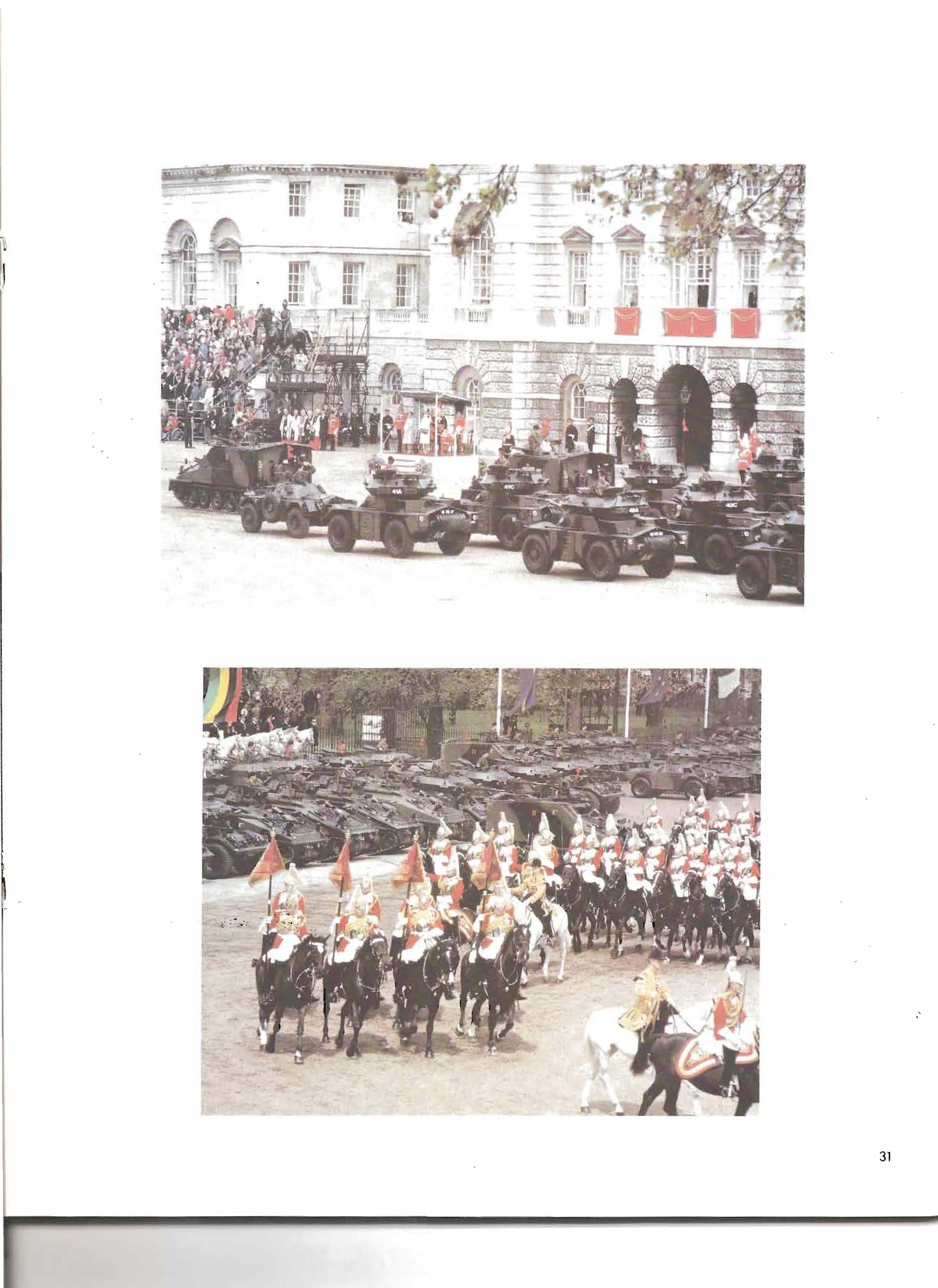
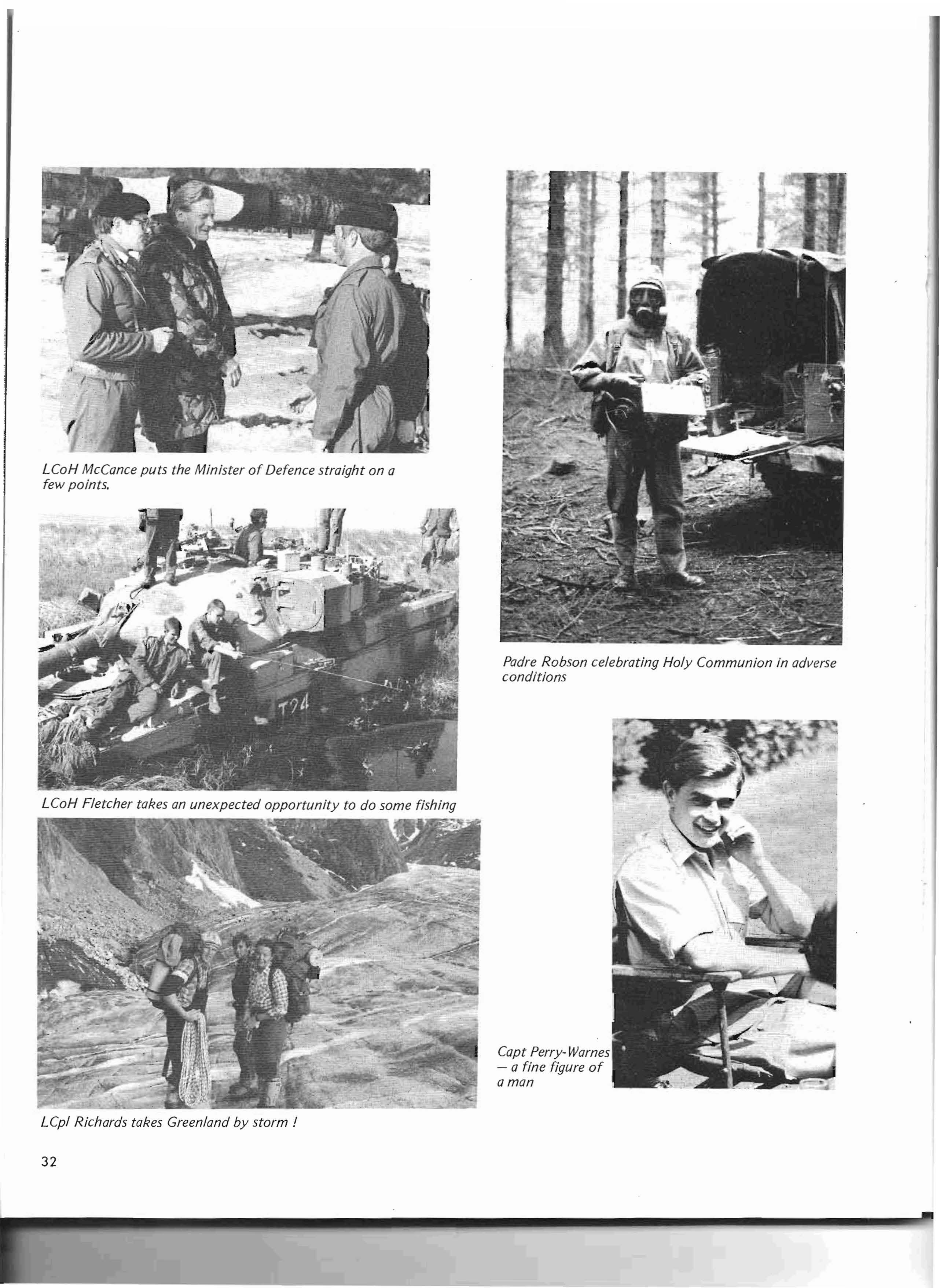
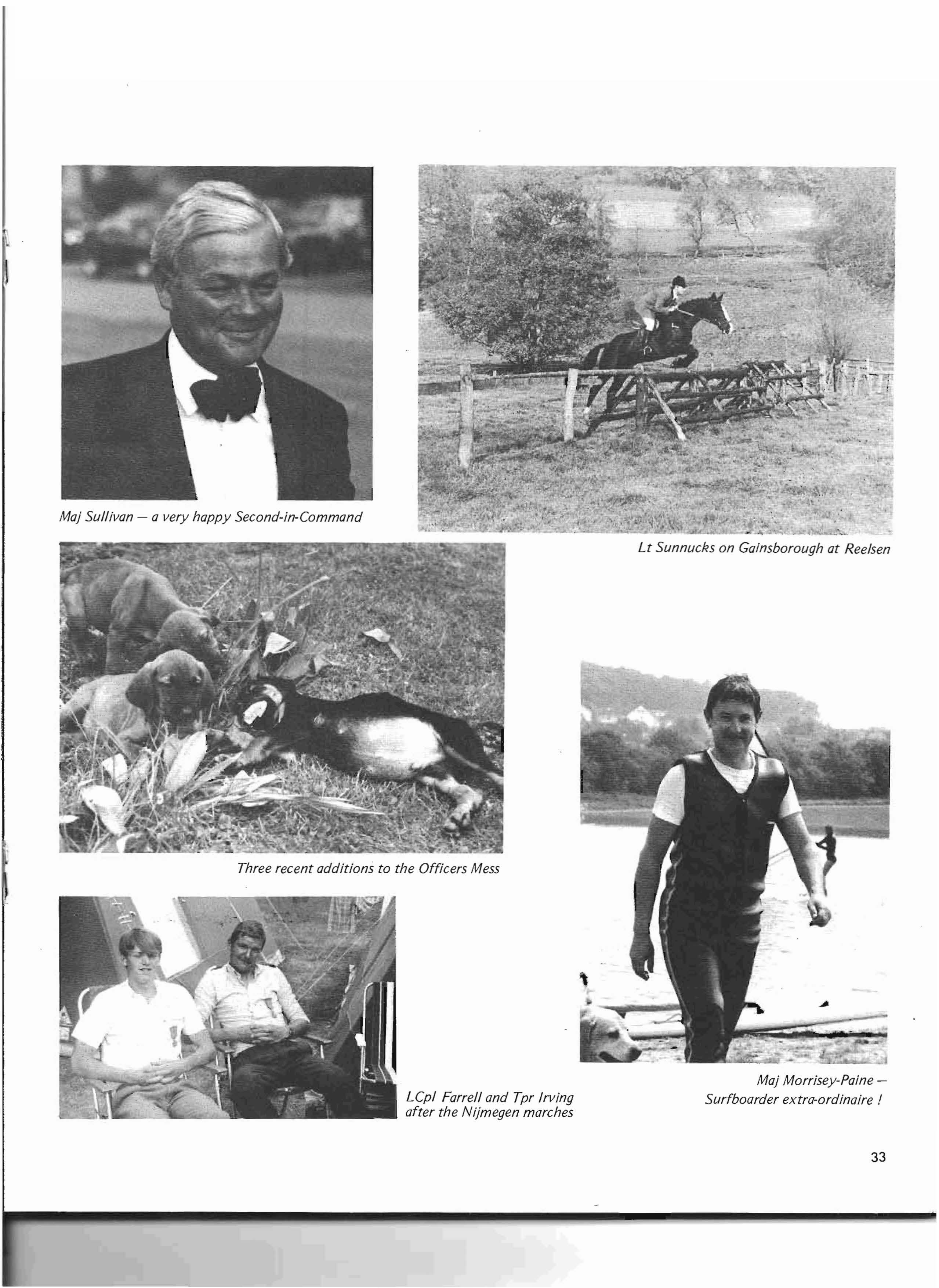
The new R. C. M. - well and truly braced up
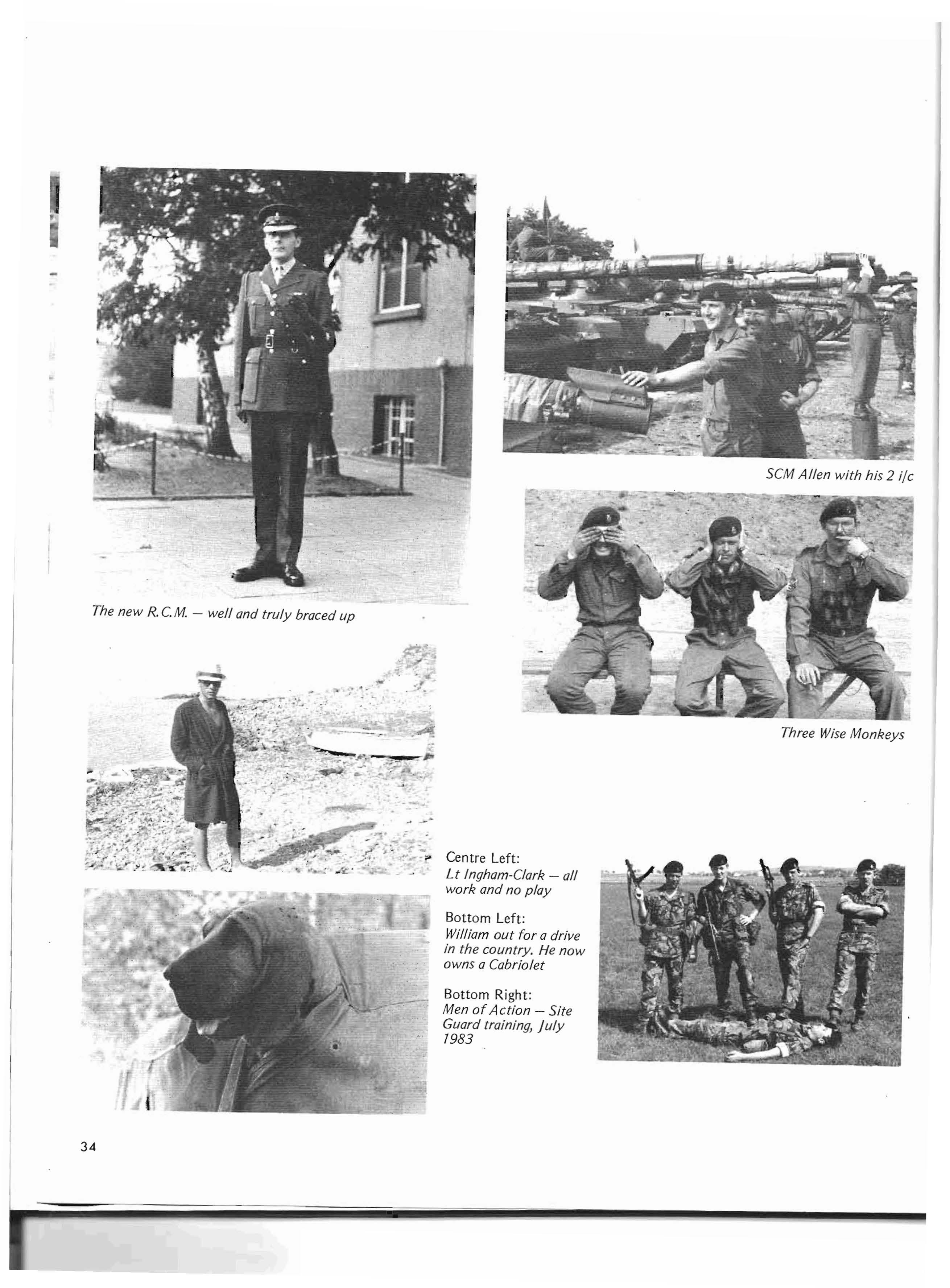
Centre Left: Lt Ingham-C/ark - all work and no play
Bottom Left: Wil/iam out for a drive in the country. He now owns a Cabriolet
Bottom Right: Men of Action - Site Guard training, july 7983
The Regiment again this year took part in the BAOR Pentathlon Championships. Our plans differed this year, and due to block leave we could devote a full month to training, rather than the usual two weeks. This we believed would give us a better chance of success, as it brought us more into line with the opposition.
We spread our load between the different competitions, with LCpl Norgrove entered for the Individual Pentathlon and three teams for the Te trathlon.
The first day was devoted to the fencing phase, where, due to LCoH Margan and his excellent coaching, all three teams came out well placed. Day two did not go so well. We knew that our weakest section was swimming, though we had hoped to do better than we did. At the end of the swimming we had lost our good placings which gave us more to do on the final day.
Day three comprised of the Riding, Shooting and Cross Country phases. Due to an excellent round in the riding, it soon became clear that LCpl N orgrove would win the Individual Pentathlon, which I am glad to say he went on to do by the massive margin of 800 points.
In the team events, we managed to win back some of the previous day's losses. LCoH Margan came second in the Individual Tetrathlon and the 'A' team finished second in the team event.
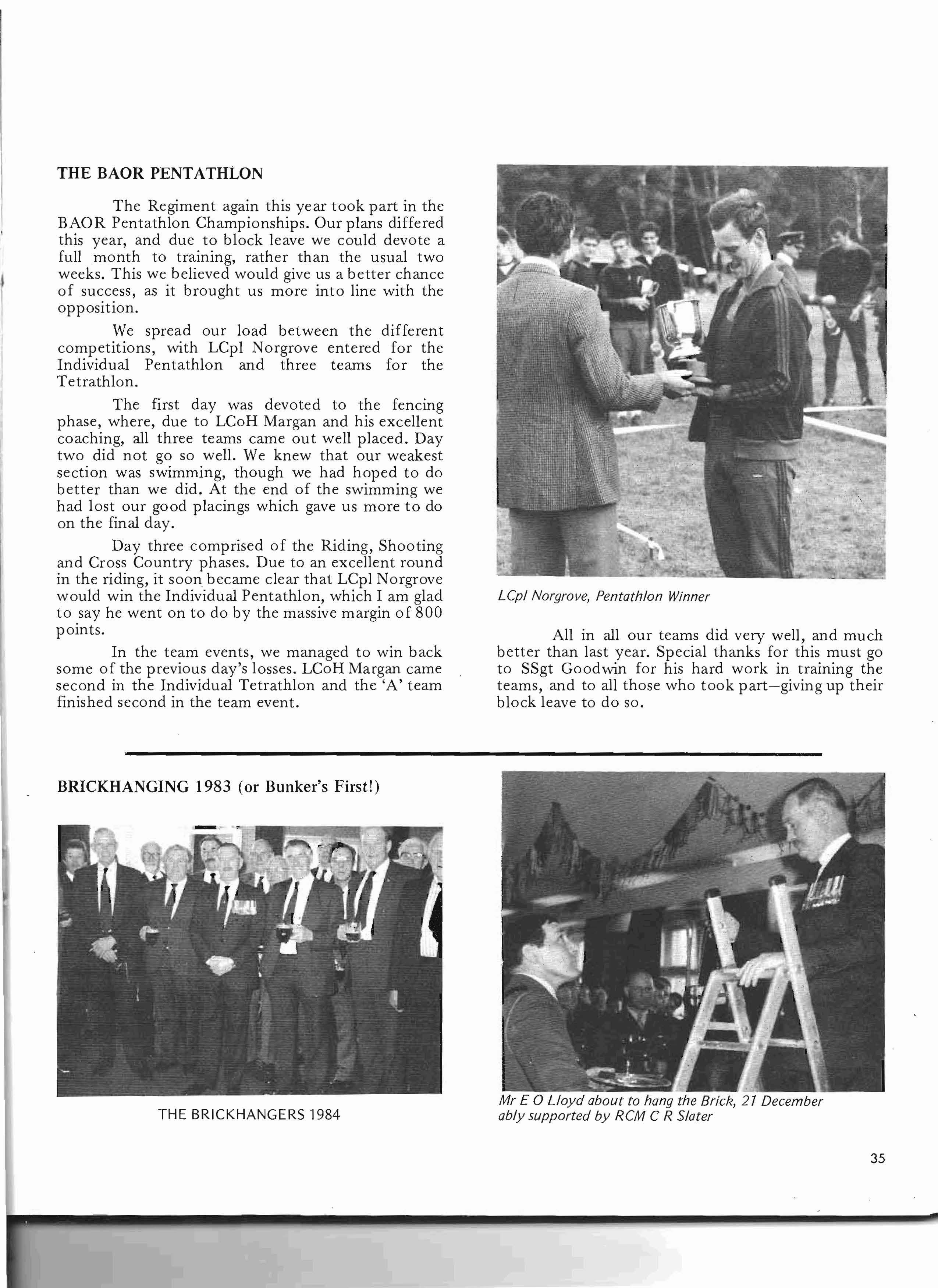
All in all our teams did very well, and much better than last year. Special thanks for this must go to SSgt Goodwin for his hard work in training the teams, and to all those who took part-giving up their block leave to do so.
The departure of Capt Darley to civilian life, and Maj Morrisey-Paine to London as Regimental Adjutant, signalled the end of an era for the Weser Vale. Capt Darley, involved on and off for five years with the hunt, has stamped his personality on the Pack by breeding most of the hounds hunting now, and recording his many worthy deeds in a file which will be invaluable to his successors. One of the new entries has been christened 'Darley' and already exhibits two of the traits by which his namesake will be rememberede-independence and pugilism.
Maj Morrisey-Paine's principal achievement on behalf of the hunt was to orchestrate the rebuilding of the Kennels. His efforts have been an unqualified success and, on behalf of the twelve couple of hounds who inhabit them and Tpr Gynane who maintains them, I would like to thank him. He hunted hounds occasionally, and always whipped-in with panache.
A young, inexperienced pack of nine and a half couple started the 1982/83 season in November slightly erratically, but they always showed promise. The temptations of succulent venison on Sennelager too often proved more attrative than a runner's smelly sock. However, as the season continued, things improved and when the hounds mature, hopefully they will steady down and show consistent rather than intermittent excellence.
Lt Sunnucks carried the Horn on Caroline, Lt Hopkins whipped-in on Falstaff and Capt Darley on the mighty Dinder, together with Maj Goodhew on his young horse William, took it in turns to play Fieldmaster. The highlight of the season was at
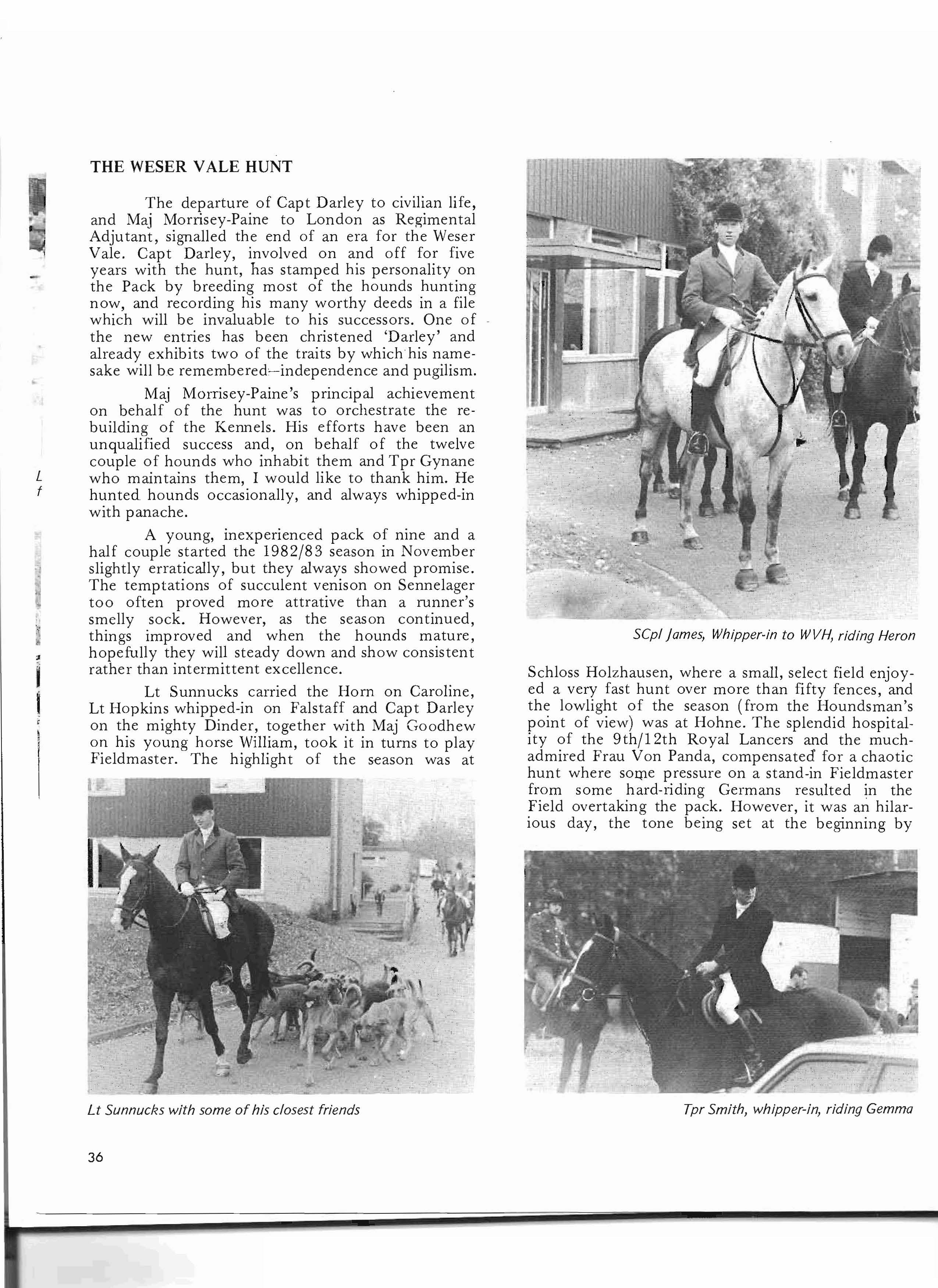
Schloss Holzhausen, where a small, select field enjoyed a very fast hunt over more than fifty fences, and the lowlight of the season (from the Houndsman's point of view) was at Hohne. The splendid hospitality of the 9th/12th Royal Lancers and the muchadmired Frau Von Panda, compensated for a chaotic hunt where sOllle pressure on a stand-in Fieldmaster from some hard-riding Germans resulted in the Field overtaking the pack. However, it was an hilarious day, the tone being set at the beginning by
Maj Morrisey-Paine's headlong dive into a ploughed field - observed by fifty mounted followers and over seventy foot followers.
The Hunt Ball, beautifully organised by Maj Anderson - with the most notable help of Capt Boldero, Capt Hewitt and Lt Hopkins - was a tremendous success, and raised enough money to complete the main project of the year, the longawaited kennel rebuild. The Corps Commander, Lt Gen Sir Martin Farndale KCB, accepted the invitation to conduct the opening ceremony in July, and afterwards met many of the subscribers and farmers who support the hunt.
The successful breeding of two litters of puppies, the ever popular parades of hounds at the Rhine Army Horse Show, and the Hunter Trial completed what was a very full summer programme. Lt Fraser designed an excellent Hunter Trial course and was the overall organiser of a much enjoyed day. Appropriately, he won the Restricted Novice on a promising young horse, Gainsborough, whilst .LCpl Hammet took the Novice on Gunman. Another popular win was that of regular hunt subscriber, Brigadier Anseli on Spartan Valley. Extremely generous sponsorship for the event was provided by O'Girke's Travel Agency, Mandrake Insurance Brokers, Wiese Department Stores, GB Traders. Target Life Insurance, and Divi.
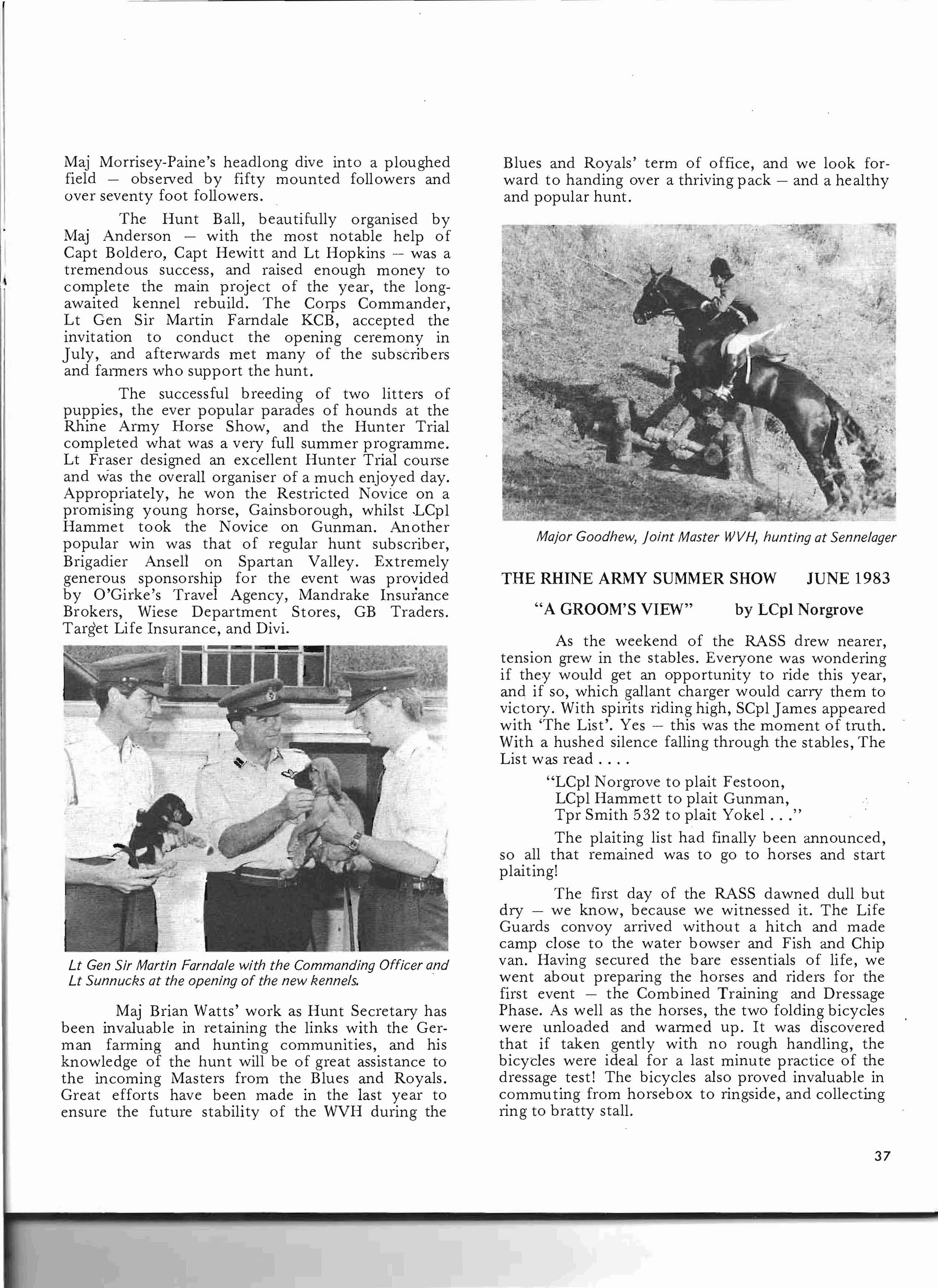
Lt Gen Sir Martin Farndale with the Commanding Officer and Lt Sunnucks at the opening of the new kennels.
Maj Brian Watts' work as Hunt Secretary has been invaluable in retaining the links with the German farming and hunting communities, and his knowledge of the hunt will be of great assistance to the incoming Masters from the Blues and Royals. Great efforts have been made in the last year to ensure the future stability of the WVH during the
Blues and Royals' term of office, and we look forward to handing over a thriving pack - and a healthy and popular hunt.
"A
by LCpl Norgrove
As the weekend of the RASS drew nearer, tension grew in the stables. Everyone was wondering if they would get an opportunity to ride this year, and if so, which gallant charger would carry them to victory. With spirits riding high, SCpl J ames appeared with 'The List'. Yes - this was the moment of truth. With a hushed silence falling through the stables, The List was read ....
"LCpl Norgrove to plait Festoon, LCpl Hammett to plait Gunman, Tpr Smith 532 to plait Yokel ... "
The plaiting list had finally been announced, so all that remained was to go to horses and start plaiting!
The first day of the RASS dawned dull but dry - we know, because we witnessed it. The Life Guards convoy arrived withou t a hitch and made camp close to the water bowser and Fish and Chip van. Having secured the bare essentials of life, we went about preparing the horses and riders for the first event - the Combined Training and Dressage Phase. As well as the horses, the two folding bicycles were unloaded and warmed up. It was discovered that if taken gently with no rough handling, the bicycles were ideal for a last minute practice of the dressage test! The bicycles also proved invaluable in commuting from horsebox to ringside, and collecting ring to bratty stall.
While the more serious events were going on, Tpr 'Smudge' Smith 532 discovered the Mechanical Bull. In true Cavalry style, Smudge Smith mounted the raging beast and succeeded in clocking up the best time of the day, which remained unbeaten not only for the day, but also for all three days of the RASS. This achievement won him DM 2500 worth of entertainments, which he plans to sell to the highest bidder.
There were some fascinating shows of organised time wasting. At the end of the, Dressage Phase of the Combined Training, the two dressage rings were dismantled and· the boards carefully stacked to one side of the ring. After several minu tes discussion, the arena party were despatched to prepare the ring for the next event - the Prix Caprilli. We now saw how quickly a dressage ring can be laid out using the same carefully stacked boards from the event before!
By the end of the first day, the weather had decided to give us what we wanted and it rained. But although damp, our spirits were high with a matching pair of rosettes and DM90 towards the horses' summer holiday.
On the second day we played our 'trump cards'. We arrived at Bad Lippspringe complete with eleven horses and the Regiment's 200 year old carriage. The first event of the day was Tent Pegging, with the four members of the The Life Guards team giving the other teams a run for their money. The main problem our team had to face was that all the opponents were mounted on fast and agile polo ponies. But the skill of the Life Guards and the ability of their noble HCR mounts proved too much for the rest of the field, and we came away with a selection of prizes.
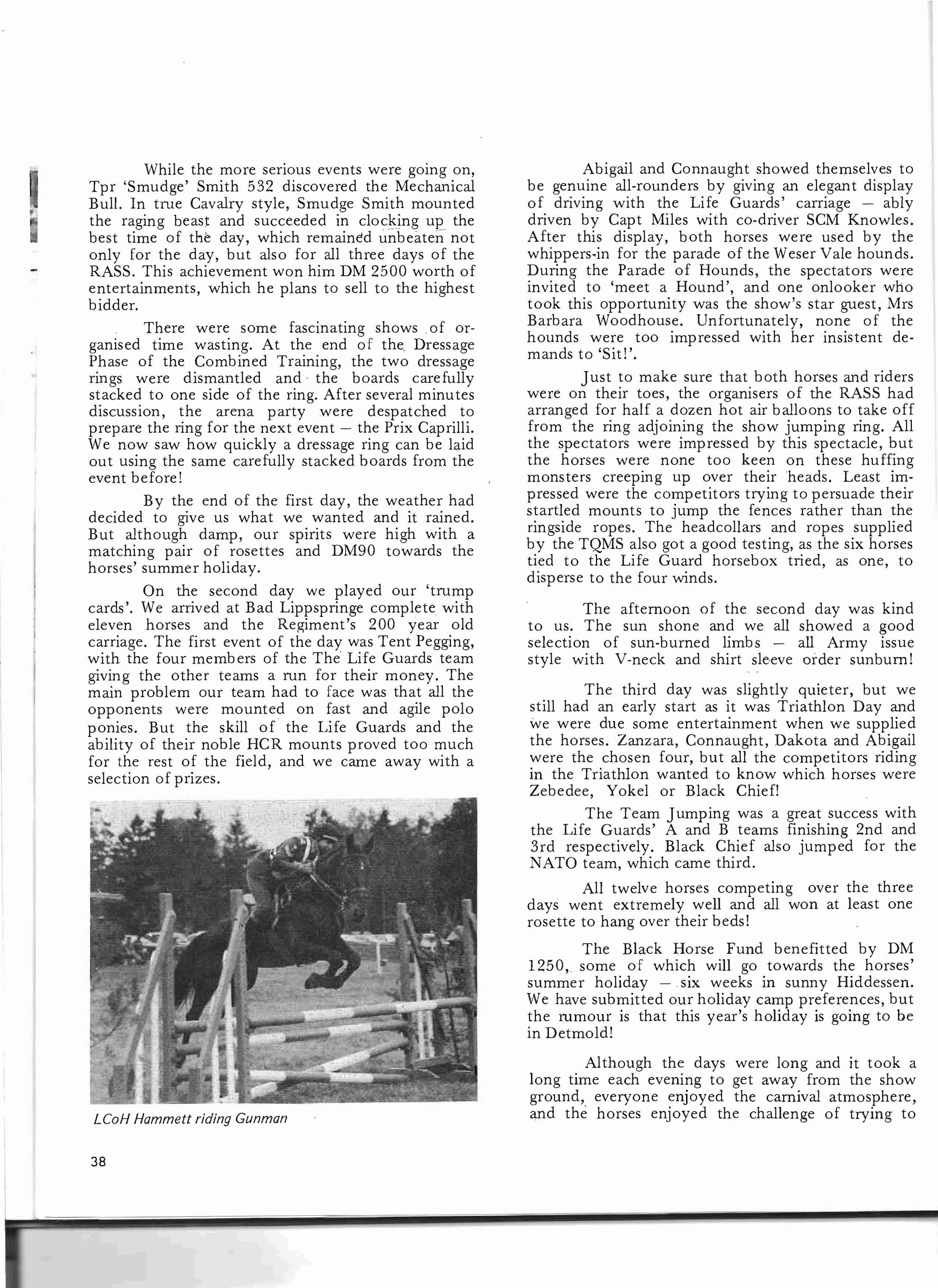
Abigail and Connaught showed themselves to be genuine all-rounders by giving an elegant display of driving with the Life Guards' carriage - ably driven by Capt Miles with co-driver SCM Knowles. After this display, both horses were used by the whippers-in for the parade of the Weser Vale hounds. During the Parade of Hounds, the spectators were invited to 'meet a Hound', and one onlooker who took this opportunity was the show's star guest, Mrs Barbara Woodhouse. Unfortunately, none of the hounds were too impressed with her insistent demands to 'Sit!'.
Just to make sure that both horses and riders were on their toes, the organisers of the RASS had arranged for half a dozen hot air balloons to take off from the ring adjoining the show jumping ring. All the spectators were impressed by this spectacle, but the horses were none too keen on these huffing monsters creeping up over their heads. Least impressed were the competitors trying to persuade their startled mounts to jump the fences rather than the ringside ropes. The headcollars and ropes supplied by the TQMS also got a good testing, as the six horses tied to the Life Guard horsebox tried, as one, to disperse to the four winds.
The afternoon of the second day was kind to us. The sun shone and we all showed a good selection of sun-burned limbs - all Army issue style with V-neck and shirt sleeve order sunburn!
The third day was slightly quieter, but we still had an early start as it was Triathlon Day and we were due some entertainment when we supplied the horses. Zanzara, Connaught, Dakota and Abigail were the chosen four, but all the competitors riding in the Triathlon wanted to know which horses were Zebedee, Yokel or Black Chief!
The Team Jumping was a great success with the Life Guards' A and B teams finishing 2nd and 3rd respectively. Black Chief also jumped for the NATO team, which came third.
All twelve horses competing over the three days went extremely well and all won at least one rosette to hang over their beds!
The Black Horse Fund benefitted by DM 1250, some of which will go towards the horses' summer holiday -. six weeks in sunny Hiddessen. We have submitted our holiday camp preferences, but the rumour is that this year's holiday is going to be in Detmold!
Although the days were long and it took a long time each evening to get away from the show ground,. everyone enjoyed the carnival atmosphere, and the horses enjoyed the challenge of trying to
reach the grass around the horseboxes. In addition all our horses had gone well, and particularly pleasing was the fact that the novice horses had shown such an improvement over the year, culminating in the Show. Caroline (Lt Sunnucks), Gunman (LCpl Hammett) and Festoon (LCpl Norgrove) all did well and will be worth keeping an eye on next year.
It seems no time at all since writing the Stables Notes for last year, and yet another twelve months have gone by. Once again the Stables Troop have adapted themselves to the large variety of demands placed upon them, and the blacks have again proved their versatility.
There has, however, been a fair turnover of grooms and whilst SCpl J ames, LCoH Hembling, LCpl Norgrove and Tpr Smith still form the 'Old Guard', new arrivals have included LCpl Hammett (from the riding staff at HCR), Tprs Smith, Clipston and Rathbone.
The year began with a very open Hunting Season when the snow only finally managed to stop us hunting just after Christmas. Until then, the only limitation to the number of horses out had been our transport capacity. The blacks completed 115 days' hunting between them.
Last winter we kept indoor shows to a minimum by running only one, which was a great success. However, there were indoor shows every weekend run by other Regiments in different parts of Germany which unfortunately tended to clash with hunting and as a result, were not well attended from Detmold.
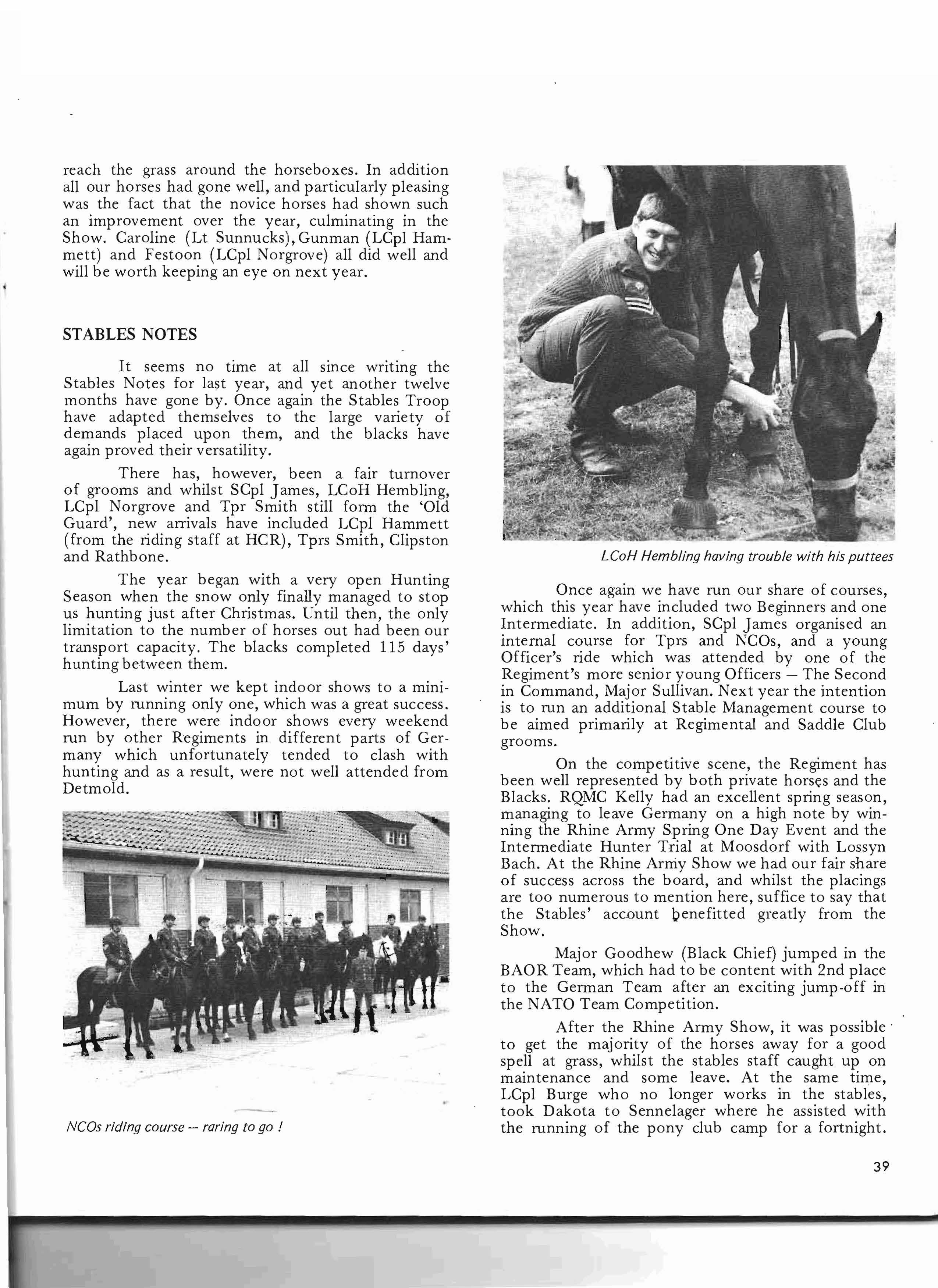
Once again we have run our share of courses, which this year have included two Beginners and one Intermediate. In addition, SCpl James organised an internal course for Tprs and NCOs, and a young Officer's ride which was attended by one of the Regiment's more senior young Officers - The Second in Command, Major SuIlivan. Next year the intention is to run an additional Stable Management course to be aimed primarily at Regimental and Saddle Club grooms.
On the competitive scene, the Regiment has been well represented by both private horses and the Blacks. RQMC Kelly had an excellent spring season, managing to leave Germany on a high note by winning the Rhine Army Spring One Day Event and the Intermediate Hunter Trial at Moosdorf with Lossyn Bach. At the Rhine Army Show we had our fair share of success across the board, and whilst the placings are too numerous to mention here, suffice to say that the Stables' account benefitted greatly from the Show.
Major Goodhew (Black Chief) jumped in the BAOR Team, which had to be content with 2nd place to the German Team after an exciting jump-off in the NATO Team Competition.
After the Rhine Army Show, it was possible' to get the majority of the horses away for a good spell at grass, whilst the stables staff caught up on maintenance and some leave. At the same time, LCpl Burge who no longer works in the stables, took Dakota to Sennelager where he assisted with the running of the pony club camp for a fortnight.
This was considered a great success by the organisers who are grateful to have some assistance from Detmold each year.
A new event in BAOR this year was the Verden Team Chase, organised by Major Symends, and involved an extremely twisting course sited on and around the Verden race course. The competition attracted a large number of entries and was won by
A new event in BAOR this year was the Verden Team Chase, organised by Major Symends, and involved an extremely twisting cours'e sited on and around the Verden race course. The competition attracted a large number of entries and was won by the Life Guards Team comprising Dinder (SCpl lames), Lossyn Bach (SCM Kelly) , and Yokel (Tpr Smith). The second team chase to be held was run by 17/21 Lancers and this again was won by The Life Guards Team made up this time of Falstaff (Lt Fraser), Dinder (SCpl lames), Gunman (LCpl Hammett) and Caroline (Tpr Smith).
The second running of the Verden Team Chase is planned for November and we hope to be able to send two teams this time.
The Autumn Hunter Trials have brought more success to the stables with Gainsborough (Lt Fraser), Heron (SCpl lames), Gunman (LCpl Hammett) and Gemma (Tpr Smith) all showing promise and being placed regularly. At the Weser Vale Hunter Trial, it was particularly gratifying for the course builder, Mr Fraser, to win the Restricted Novice with Gainsborough and for LCpl Hammett to win the Novice with Gunman. The course here was much enjoyed by most competitors and the work this' year had been done by SCpl] ames with Tprs Clipston and Gynane.
The Autumn Hunter Trial season came to an end with the Rhine Army event held at Moosdorf,
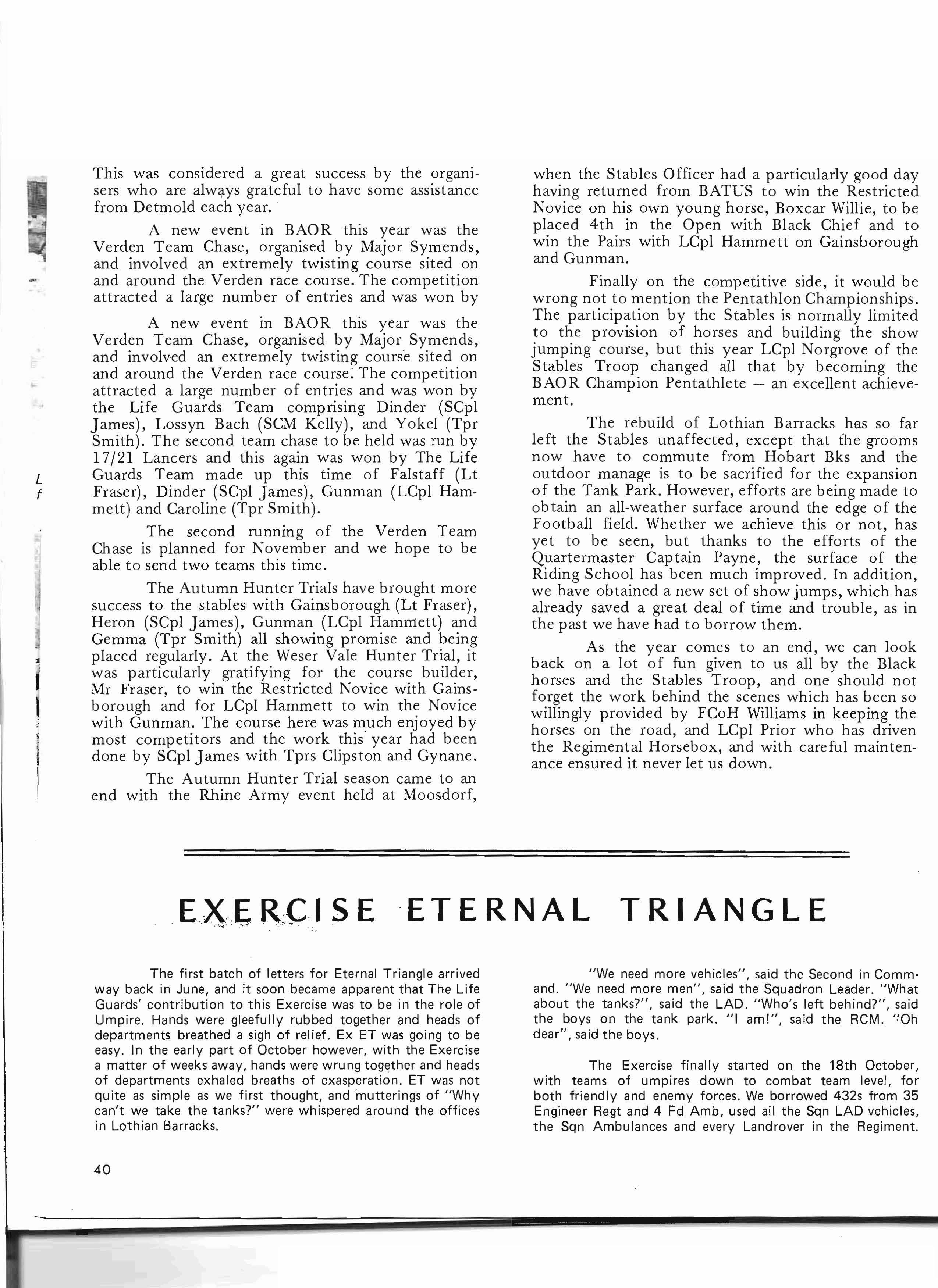
when the Stables Officer had a particularly good day having returned from BATUS to win the Restricted Novice on his own young horse, Boxcar Willie, to be placed 4th in the Open with Black Chief and to win the Pairs with LCpl Hammett on Gainsborough and Gunman.
Finally on the competitive side, it would be wrong not to mention the Pentathlon Championships. The participation by the Stables is normally limited to the provision of horses and building the show jumping course, but this year LCpl Norgrove of the Stables Troop changed all that by becoming the BAOR Champion Pentathlete - an excellent achievement.
The rebuild of Lothian Barracks has so far left the Stables unaffected, except that the grooms now have to commute from Hobart Bks and the outdoor manage is to be sacrified for the expansion of the Tank Park. However, efforts are being made to obtain an all-weather surface around the edge of the Football field. Whether we achieve this or not, has yet to be seen, but thanks to the efforts of the Quartermaster Captain Payne, the surface of the Riding School has been much improved. In addition, we have obtained a new set of show jumps, which has already saved a great deal of time and trouble, as in the past we have had to borrow them.
As the year comes to an end., we can look back on a lot of fun given to us all by the Black horses and the Stables Troop, and one should not forget the work behind the scenes which has been so willingly provided by FCoH Williams in keeping the horses on the road, and LCpl Prior who has driven the Regimental Horsebox, and with careful maintenance ensured it never let us down.
The first batch of letters for Eternal Triangle arrived way back in June, and it soon became apparent that The Life Guards' contribution to this Exercise was to be in the role of Umpire. Hands were gleefully rubbed together and heads of departments breathed a sigh of rei ief. Ex ET was going to be easy. In the early part of October however, with the Exercise a matter of weeks away, hands were wru ng and heads of departments exhaled breaths of exasperation. ET was not quite as simple as we first thought, and 'mutterings of "Why can't we take the tanks?" were whispered around the offices in Lothian Barracks.
"We need more vehicles", said the Second in Command. "We need more men", said the Squadron Leader. "What about the tanks?", said the LAD. "Who's left behind?", said the boys on the tank park. "I am!", said the RCM. 'tOh dear", said the boys.
The Exercise finally started on the 18th October, with teams of umpires down to combat team level, for both friendly and enemy forces. We borrowed 432s from 35 Engineer Regt and 4 Fd Amb, used all the Sqn LAD vehicles, the Sqn Ambulances and every Landrover in the Regiment.
Suitably equipped and keen to get on, we set about our task of umpiring the Ex ET.
The first week was spent preparing for the major exercise which was due to start on 24th October. Communications were checked, and by the end of the first week we were well prepared to meet up with our respective players.
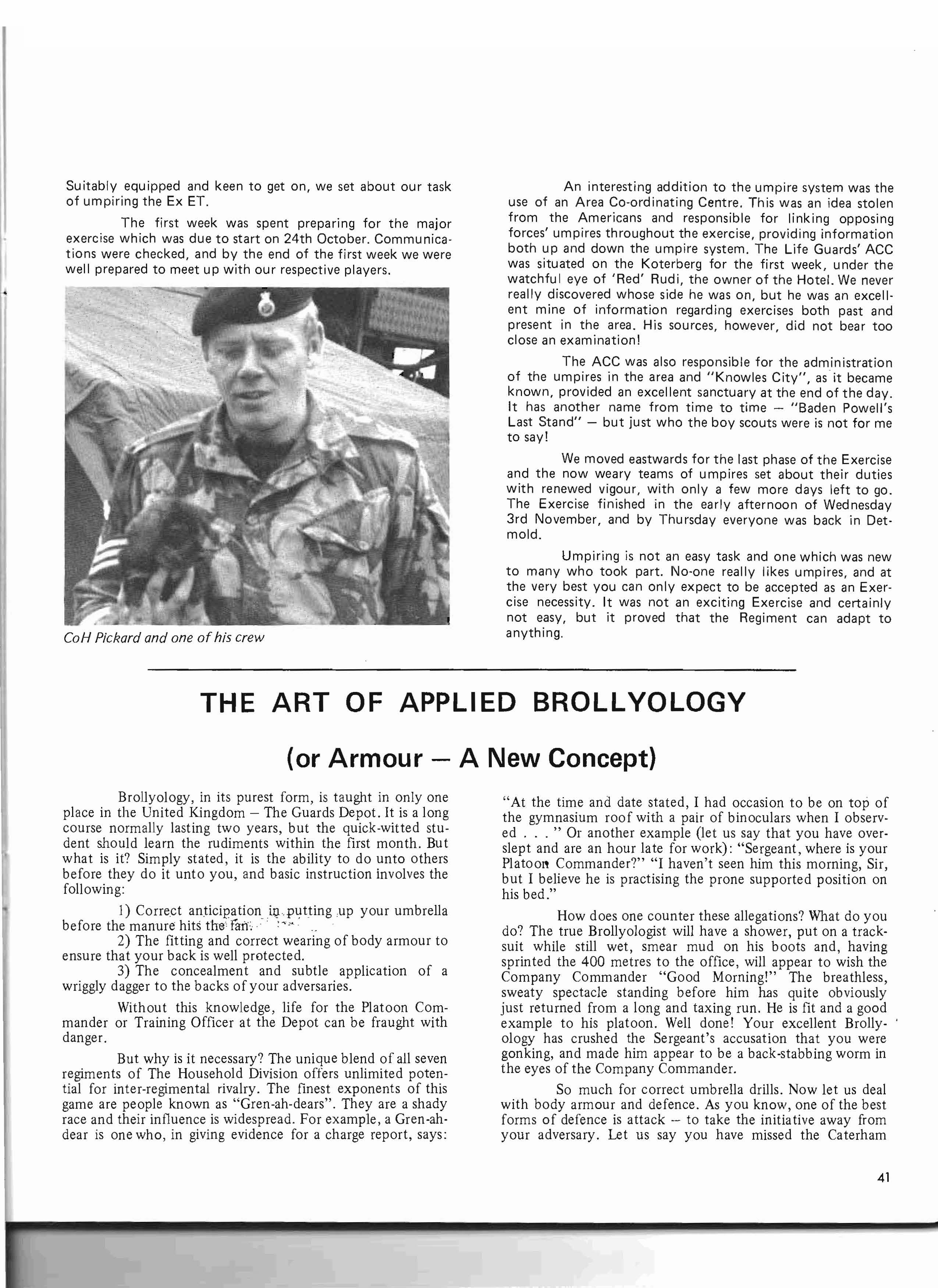
An interesting addition to the umpire system was the use of an Area Co-ordinating Centre. This was an idea stolen from the Americans and responsible for linking opposing forces' umpires throughout the exercise, providing information both up and down the umpire system. The Life Guards' ACC was situated on the Koterberg for the first week, under the watchful eye of 'Red' Rudi, the owner of the Hotel. We never really discovered whose side he was on, but he was an excellent mine of information regarding exercises both past and present in the area. His sources, however, did not bear too close an exam ination!
The ACC was also responsible for the administration of the umpires in the area and "Knowles City", as'it became known, provided an excellent sanctuary at the end of the day. It has another name from time to time - "Baden Powell's Last Stand" - but just who the boy scouts were is not for me to say!
We moved eastwards for the last phase of the Exercise and the now weary teams of umpires set about their duties with renewed vigour, with only a few more days left to go. The Exercise finished in the early afternoon of Wednesday 3rd November, and by Thu rsday everyone was back in Detmold.
Umpiring is not an easy task and one which was new to many who took part. No-one really likes umpires, and at the very best you can only expect to be accepted as an Exercise necessity. It was not an exciting Exercise and certainly not easy, but it proved that the Regiment can adapt to anything.
Brollyology, in its purest form, is taught in only one place in the United J(jngdom - The Guards Depot. It is a long course normally lasting two years, but the quick-witted student should learn the rudiments within the first month. But what is it? Simply stated, it is the ability to do unto others before they do it unto you, and basic instruction involves the following:
1) Correct iQ,p\lttingup your umbrella before the manure hits the fall'. :
2) The fitting and COrrect wearing of body armour to ensure that your back is well protected.
3) The concealment and subtle application of a wriggly dagger to the backs of your adversaries.
Without this knowledge, life for the Platoon Commander or Training Officer at the Depot can be fraught with danger.
But why is it necessary? The unique blend of all seven regiments of The Household Division offers unlimited potential for inter-regimental rivalry. The finest exponents of this game are people known as "Gren-ah-dears". They are a shady race and their influence is widespread. For example, a Gren-ahdear is one who, in giVing evidence for a charge report, says:
"At the time and date stated, I had occasion to be on top of the gymnasium roof with a pair of binoculars when I observed " Or another example (let us say that you have overslept and are an hour late for work): "Sergeant, where is your Platoon Commander?" "I haven't seen him this morning, Sir, but I believe he is practising the prone supported position on his bed."
How does one counter these allegations? What do you do? The true Brollyologist will have a shower, put on a tracksuit while still wet, smear mud on his boots and, having sprinted the 400 metres to the office, will appear to wish the Company Commander "Good Morning!" The breathless, sweaty spectacle standing before him has quite obviously just returned from a long and taxing run. He is fit and a good example to his platoon. Well done! Your excellent Brollyology has crushed the Sergeant's accusation that you were gonking, and made him appear to be a back-stabbing worm in the eyes of the Company Commander.
So much for correct umbrella drills. Now let us deal with body armour and defence. As you know, one of the best forms of defence is attack - to take the initiative away from your adversary. Let us say you have missed the Caterham
Company Church Sunday and you know that the Company Commander will want to know why. Your plea that a dirty weekend in Chipping Sodbury was more important will not meet with much sympathy. Your course of action is simple. On first seeing him on Monday morning, greet him with a cheery but conspiratorial smile: "Hello Valentine - did you have a good weekend? I noticed that you weren't at church on Sunday (little laugh). Oh, but of course, you're not a Catholic, are you?"
Whether or not you are a Catholic is immaterial. What is important is that he is not, and therefore wouldn't have gone to the same church as you anyway. Thus he is on the defensive - not you. You, by implication, were going to confession while he had the dirty weekend. Well done againanother good ploy.
In extreme cases, a more aggressive approach is useful: "Why didn't you go on the eight mile endurance run with your platoon?" "Are you real? Do you seriously think I would do something like that, eh? Where do you come from no, I mean which bloody planet? The last person"to speak to me like that is still on the drip. You'd better be careful or else a few of my friends will come and have a game with you. Got it? Good!"
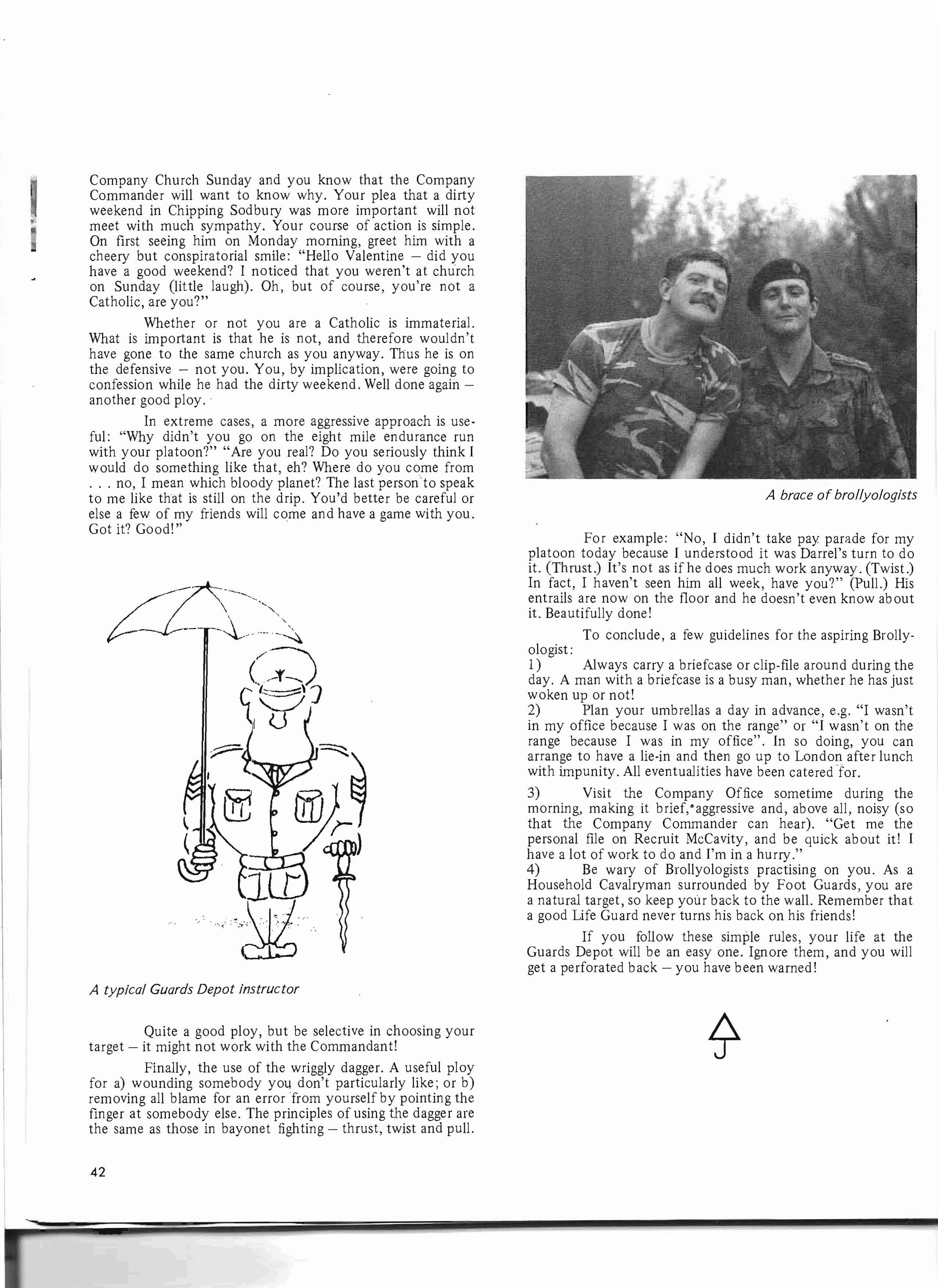
A brace of brollyologists
For example: "No, I didn't take pay par2.de for my platoon today because I understood it was Darrel's turn to do it. (Thrust.) It's not as if he does much work anyway. (Twist.) In fact, I haven't seen him all week, have you?" (Pull.) His entrails are now on the floor and he doesn't even know about it. Beautifully done!
To conclude, a few guidelines for the aspiring Brollyologist:
1) Always carry a briefcase or clip-file around during the day. A man with a briefcase is a busy man, whether he has just woken up or not!
2) Plan your umbrellas a day in advance, e.g. "I wasn't in my office because I was on the range" or "I wasn't on the range because I was in my office". In so doing, you can arrange to have a lie-in and then go up to London after lunch with impunity. All eventualities have been catered -for.
3) Visit the Company Office sometime during the morning, making it brief,eaggressive and, above all, noisy (so that the Company Commander can hear). "Get me the personal file on Recruit McCavity, and be quick about it! I have a lot of work to do and I'm in a hurry."
4) Be wary of Brollyologists practising on you. As a Household Cavalryman surrounded by Foot Guards, you are a natural target, so keep your back to the wall. Remember that a good Life Guard never turns his back on his friends!
If you follow these simple rules, your life at the Guards Depot will be an easy one. Ignore them, and you will get a perforated back - you have been warned!
A typical Guards Depot instructor
Quite a good ploy, but be selective in choosing your target - it might not work with the Commandant!
Finally, the use of the wriggly dagger. A useful ploy for a) wounding somebody you don't particularly like; or b) removing all blame for an error from yourself by pointing the finger at somebody else. The principles of using the dagger are the same as those in bayonet fighting - thrust, twist and pull.
For the second year running, The Life Guards provided a Mounted Border Patrol in fulfilment of our commitment to periodically patrol a section of the Inner German Border. Lt Ellis, CoH Hickman, LCoH Evans, LCoH Tinkler and Trooper Smith took part in this very enjoyable duty, with LCoH Godley, LCpl Moore and Tpr Locke providing the Admin back up. We spent two days in the most glorious weather patroll ing the Border between Helmstedt and Goslar, a particularly beautiful stretch of countryside, spoiled of)ly by the imposing sight of the Iron Curtain itself. We were entertained most hospitably by 2 RTR in Wolfenbuttel during. our stay on the Border.
A special mention must go to FSO I1I Tom Jones, our guide along the Border, who is a less than experienced horseman, but nevertheless spent a whole day in the saddle. On the second day of the patrol, he felt the effects of this valiant effort and retired to his Landrover.
This was a very interesting Exercise, which I suspect provided as much entertainment for the East German Border Guards as it did for us. It is hoped that the Blues and Royals continue with mounted patrols in coming years and turn this Exercise into a regular event.
A Squadron Team HQ Squadron Team
2Lt Ley
LCpl Moore
LCpl Coles
Tprs Douglas
Le-Han
O'Sullivan
Walker
White
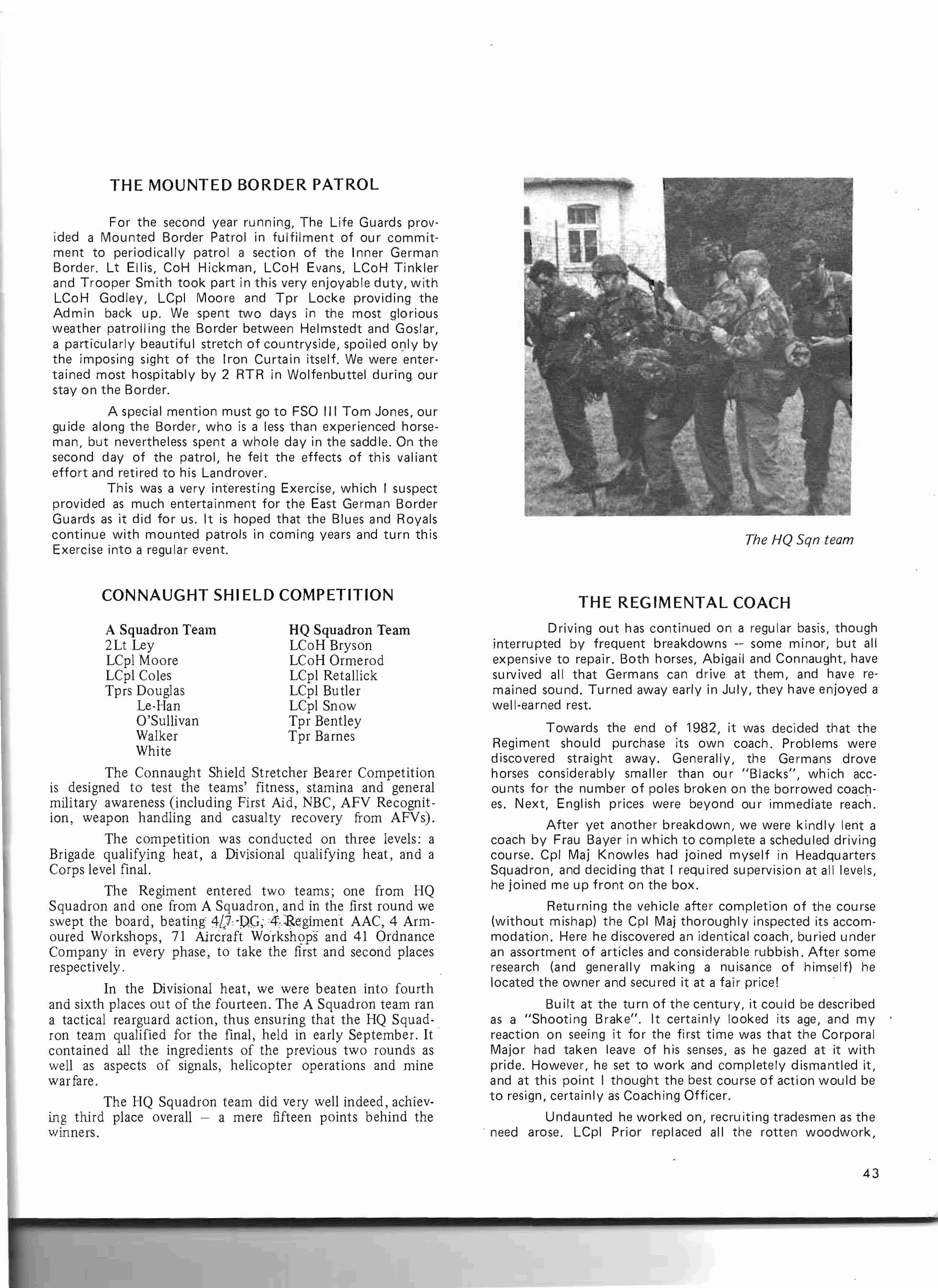
LCoH Bryson
LCoH Ormerod
LCpl Retallick
LCpl Butler
LCplSnow
Tpr Bentley
Tpr Barnes
The Connaught Shield Stretcher Bearer Competition is designed to test the teams' fitness, stamina and general military awareness (including First Aid, NBC, AFV Recognition, weapon handling and casualty recovery from AFVs).
The competition was conducted on three levels: a Brigade qualifying heat, a Divisional qualifying heat, and a Corps level final.
The Regiment entered two teams; one from HQ Squadron and one from A Squadron, and in the first round we swept the board, beating 41):-l)y;4':::Regiment AAC, 4 Armoured Workshops, 71 Aircraft WQrksh()ps and 41 Ordnance Company in every phase, to take the first and second places respectively.
In the Divisional heat, we were beaten into fourth and sixth places out of the fourteen. The A Squadron team ran a tactical rearguard action, thus ensuring that the HQ Squadron team qualified for the final, held in early September. It contained all the ingredients of the previous two rounds as well as aspects of signals, helicopter operations and mine warfare.
The HQ Squadron team did very well indeed, achieving third place overall -a mere fifteen points behind the winners.
Driving out has continued on a regular basis, though interrupted by frequent breakdowns - some minor, but all expensive to repair. Both horses, Abigail and Connaught, have survived all that Germans can drive at them, and have remained sound. Turned away early in July, they have enjoyed a well-earned rest.
Towards the end of 1982, it was decided that the Regiment should purchase its own coach. Problems were discovered straight away. Generally, the Germans drove horses considerably smaller than our "Blacks", which accounts for the number of poles broken on the borrowed coaches. Next, English prices were beyond our immediate reach.
After yet another breakdown, we were kindly lent a coach by Frau Bayer in which to complete a scheduled driving course. Cpl Maj Knowles had joined myself in Headquarters Squadron, and deciding that I required supervision at all levels, he joined me up front on the box.
Returning the vehicle after completion of the course (without mishap) the Cpl Maj thoroughly inspected its accommodation. Here he discovered an identical coach, buried under an assortment of articles and considerable rubbish. After some research (and generally making a nuisance of himself) he located the owner and secured it at a fair price!
Built at the turn of the century, it could be described as a "Shooting Brake". It certainly looked its age, and my reaction on seeing it for the first time was that the Corporal Major had taken leave of his senses, as he gazed at it with pride. However, he set to work and completely dismantled it, and at this point I thought the best course of action would be to resign, certainly as Coaching Officer.
Undaunted he worked on, recruiting tradesmen as the need arose. LCpl Prior replaced all the rotten woodwork,
German friends were responsible for the metal - most importantly the mudguards and steps. Mrs Margaret Knowles and LCpl Mills replaced and greatly improved the upholstery. Corporal Major Knowles did something as well, mainly in a supervisory capacity.
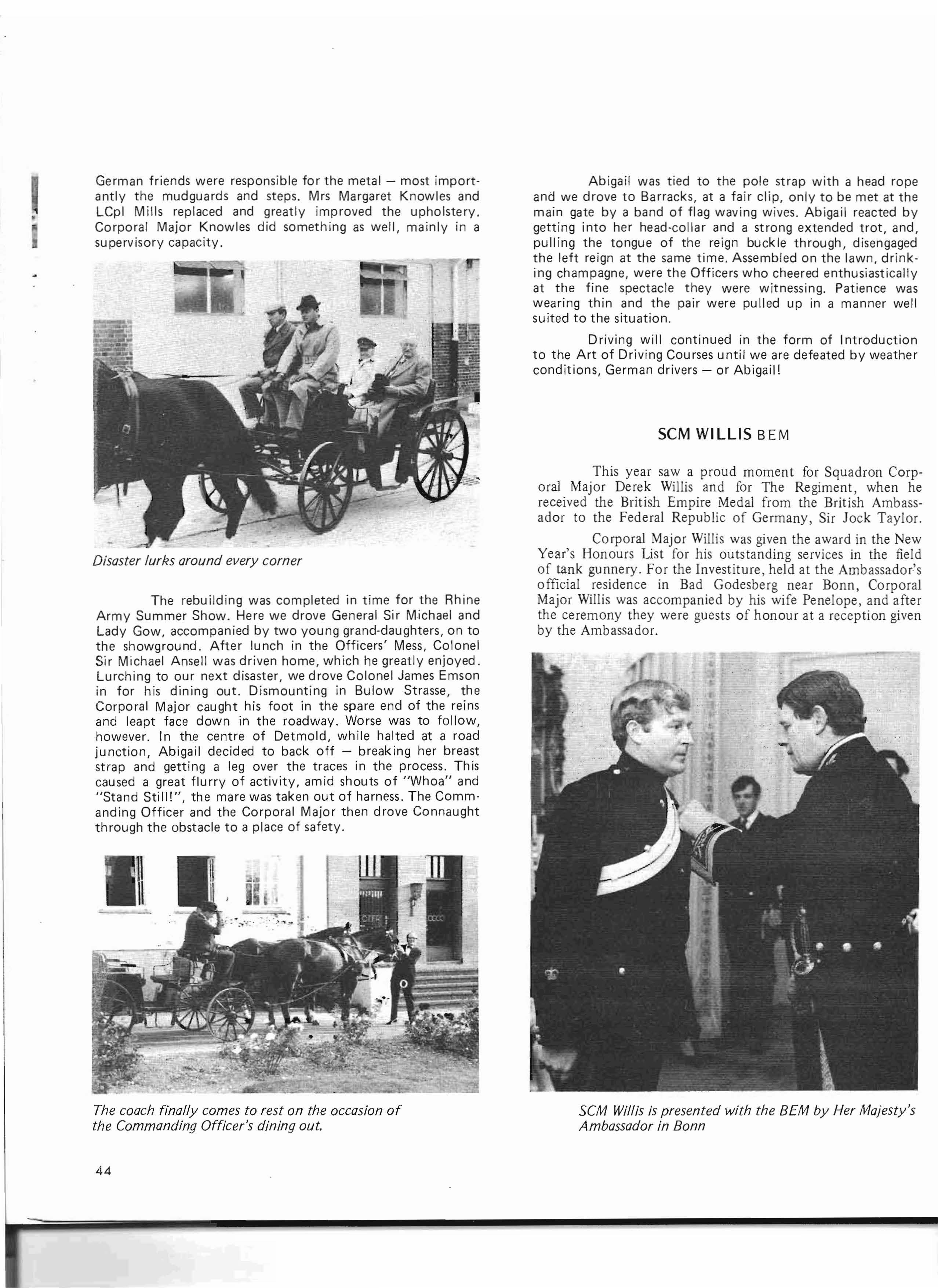
The rebuilding was completed in time for the Rhine Army Summer Show. Here we drove General Sir Michael and Lady Gow, accompanied by two young grand-daughters, on to the showground. After lunch in the Officers' Mess, Colonel Sir Michael Ansell was driven home, which he greatly enjoyed. Lurching to our next disaster, we drove Colonel James Emson in for his dining out. Dismounting in Bulow Strasse, the Corporal Major caught his foot in the spare end of the reins and leapt face down in the roadway. Worse was to follow, however. In the centre of Detmold, while halted at a road junction, Abigail decided to back off - breaking her breast strap and getting a leg over the traces in the process. This caused a great flurry of activity, amid shouts of "Whoa" and "Stand Still!", the mare was taken out of harness. The Commanding Officer and the Corporal Major then drove Connaught through the obstacle to a place of safety.
Abigail was tied to the pole strap with a head rope and we drove to Barracks, at a fair clip, only to be met at the main gate by a band of flag waving wives. Abigail reacted by getting into her head-collar and a strong extended trot, and, pulling the tongue of the reign buckle through, disengaged the left reign at the same time. Assembled on the lawn, drink· ing champagne, were the Officers who cheered enthusiastically at the fine spectacle they were witnessing. Patience was wearing thin and the pair were pulled up in a manner well suited to the situation.
Driving will continued in the form of Introduction to the Art of Driving Courses until we are defeated by weather conditions, German drivers - or Abigail!
This year saw a proud moment for Squadron Corporal Major Derek Willis and for The Regiment, when he received the British Empire Medal from the British Ambass· ador to the Federal Republic of Germany, Sir Jock Taylor.
Corporal Major Willis was given the award in the New Year's Honours List for his outstanding services in the field of tank gunnery. For the Investiture, held at the Ambassador's official residence in Bad Godesberg near Bonn, Corporal Major Willis was accompanied by his wife Penelope, and after the ceremony they were guests of honour at a reception given by the Ambassador.
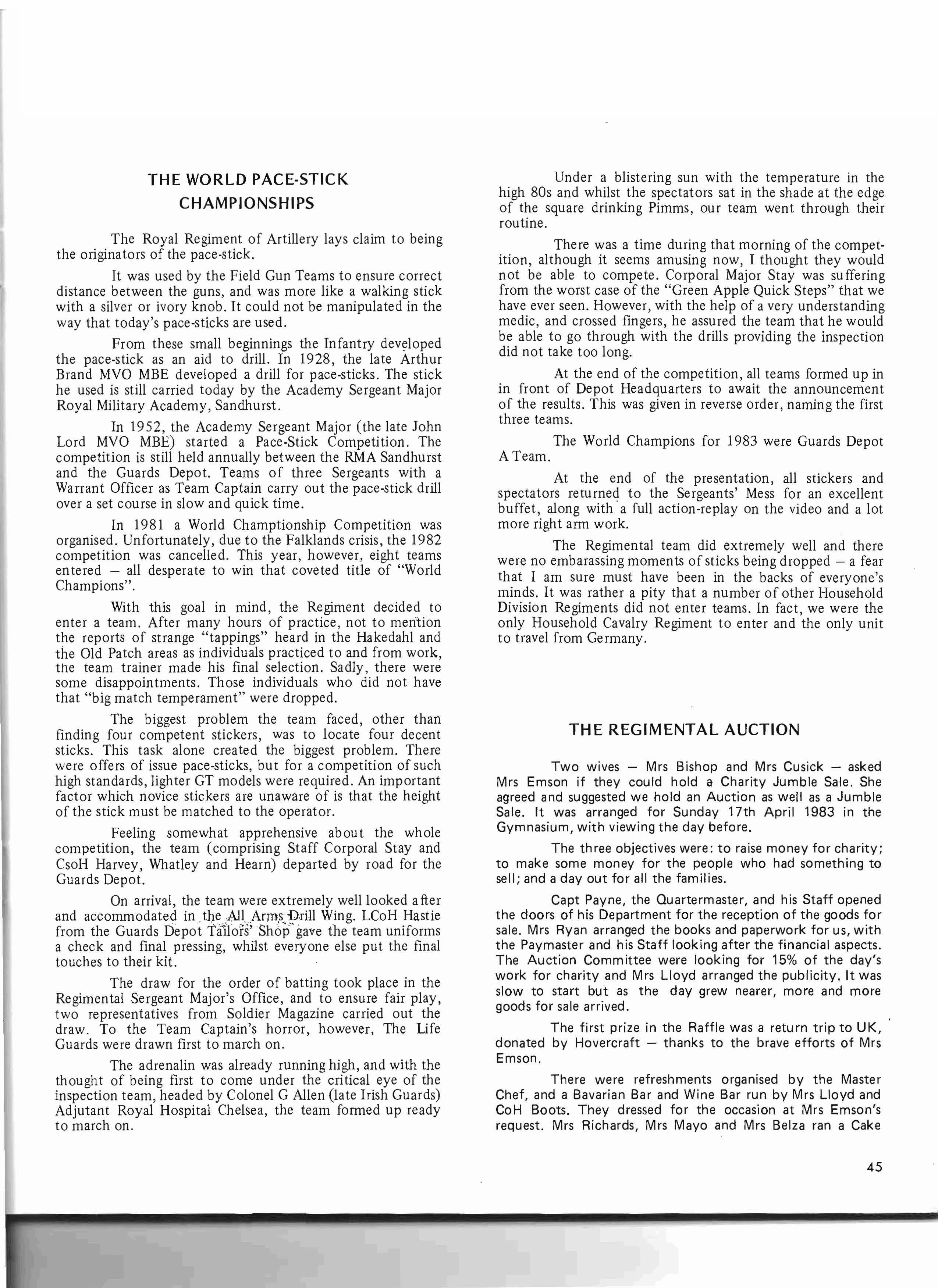
The Royal Regiment of Artillery lays claim to being the originators of the pace-stick.
It was used by the Field Gun Teams to ensure correct distance between the guns, and was more like a walking stick with a silver or ivory knob. It could not be manipulated in the way that today's pace-sticks are used.
From these small beginnings the In fantry the pace-stick as an aid to drill. In 1928, the late Arthur Brand MVO MBE developed a drill for pace-sticks. The stick he used is still carried today by the Academy Sergeant Major Royal Military Academy, Sandhurst.
In 1952, the Academy Sergeant Major (the late John Lord MVO MBE) started a Pace-Stick Competition. The competition is still held annually between the RMA Sandhurst and the Guards Depot. Teams of three Sergeants with a Warrant Officer as Team Captain carry out the pace-stick drill over a set course in slow and quick time.
In 1981 a World Champtionship Competition was organised. Unfortunately, due to the Falklands crisis, the 1982 competition was cancelled. This year, however, eight teams en tered - all desperate to win that coveted title of "World Champions"
With this goal in mind, the Regiment decided to enter a team. After many hours of practice, not to mention the reports of strange "tappings" heard in the Hakedahl and the Old Patch areas as individuals practiced to and from work, the team trainer made his final selection. Sadly, there were some disappointments. Those individuals who did not have that "big match temperament" were dropped.
The biggest problem the team faced, other than finding four competent stickers, was to locate four decent sticks. This task alone created the biggest problem. There were offers of issue pace-sticks, but for a competition of such high standards, lighter GT models were required. An important factor which novice stickers are unaware of is that the height of the stick must be matched to the operator.
Feeling somewhat apprehensive ab ou t the whole competition, the team (comprising Staff Corporal Stay and CsoH Harvey, Whatley and Hearn) departed by road for the Guards Depot.
On arrival, the team were extremely well looked a fier and accommodated in, Wing. LCoH Hastie from the Guards Depot Tiillo-rs' Shop-gave the team uniforms a check and final pressing, whilst everyone else put the final touches to their kit.
The draw for the order of batting took place in the Regimental Sergeant Major's Office, and to ensure fair play, two representatives from Soldier Magazine carried out the draw. To the Team Captain's horror, however, The Life Guards were drawn first to march on.
The adrenalin was already running high, and with the thought of being first to come under the critical eye of the inspection team, headed by Colonel G Allen (late Irish Guards) Adjutant Royal Hospital Chelsea, the team formed up ready to march on.
Under a blistering sun with the temperature in the high 80s and whilst the spectators sat in the shade at the edge of the square drinking Pimms, our team went through their routine.
There was a time during that morning of the competition, although it seems amusing now, I thought they would not be able to compete. Corporal Major Stay was suffering from the worst case of the "Green Apple Quick Steps" that we have ever seen. However, with the help of a very understanding medic, and crossed fingers, he assured the team that he would be able to go through with the drills providing the inspection did not take too long.
At the end of the competition, all teams formed up in in front of Depot Headquarters to await the announcement of the results. This was given in reverse order, naming the first three teams.
The World Champions for 1983 were Guards Depot A Team.
At the end of the presentation, all stickers and spectators returned to the Sergeants' Mess for an excellent buffet, along with a full action-replay on the video and a lot more right arm work.
The Regimental team did extremely well and there were no embarassing moments of sticks being dropped -a fear that I am sure must have been in the backs of everyone's minds. It was rather a pity that a number of other Household Division Regiments did not enter teams. In fact, we were the only Household Cavalry Regiment to enter and the only unit to travel from Germany.
Two wives - Mrs Bishop and Mrs Cusick - asked Mrs Emson if they could hold a Charity Jumble Sale. She agreed and suggested we hold an Auction as well as a Jumble Sale. It was arranged for Sunday 17th April 1983 in the Gymnasium, with viewing the day before.
The three objectives were: to raise money for charity; to make some money for the people who had something to sell; and a day out for all the families.
Capt Payne, the Quartermaster, and his Staff opened the doors of his Department for the reception of the goods for sale. Mrs Ryan arranged the books and paperwork for us, with the Paymaster and his Staff looking after the financial aspects. The Auction Committee were looking for 15% of the day's work for charity and Mrs L10yd arranged the publicity, It was slow to start but as the day grew nearer, more and more goods for sale arrived.
The first prize in the Raffle was a return trip to UK, donated by Hovercraft - thanks to the brave efforts of Mrs Emson.
There were refreshments organised by the Master Chef, and a Bavarian Bar and Wine Bar run by Mrs L10yd and CoH Boots. They dressed for the occasion at Mrs Emson's request. Mrs Richards, Mrs Mayo and Mrs Belza ran a Cake
and Tea Stall, and Mrs Bishop and Mrs Cusick had a room full of jumble. We had 60 items to auction, ranging from a dishwasher, a 3-piece suite, coffee tables. and a bicycle to countless pairs of skis. There were also 3 cars/caravans and a large truck.
The Auctioneers were Captain Boldero, WOI (now Lt) Leighton and the RQMC W02 Daysmith, who worked very hard all day. The first lot was put up at 1300 and the last lot at 1800 hours. I would like to say thank you to the RQMC W02 Uoyd and SCpl Hugman for all the work they did behind the scenes. At the end of the day, we raised DM2800 which was spent on equipment for the Garrison Medical Centre and some badly needed swings, slides and climbing frames for our Kindergarten. The remaining money - £345 - was sent to BLESMA.
I must say a special thank you to the Adjutant, Capt Holliday, for the kind donation of his marbles. It's not every day that someone gives you these to auction.
Finally, thank you to everyone who helped to make the day such an outstanding success, and to Colonel Emson for his encouragement and support.
After three weeks' 'Basic Infantry Training' at The Royal Military Academy, Sandhurst, I felt slightly uneasy joining a Cavalry Regiment. However, worries were soon to be dispelled and I was dispatched to Bavaria on Exercise Snow Queen to learn how to ski.
By the time I returned to my station at Detmold, I felt that I was beginning to fit into the Army system and this was immediately tested with two weeks' pre-Canada training on Soltau. I fulfilled the role of Ambulance Commander,
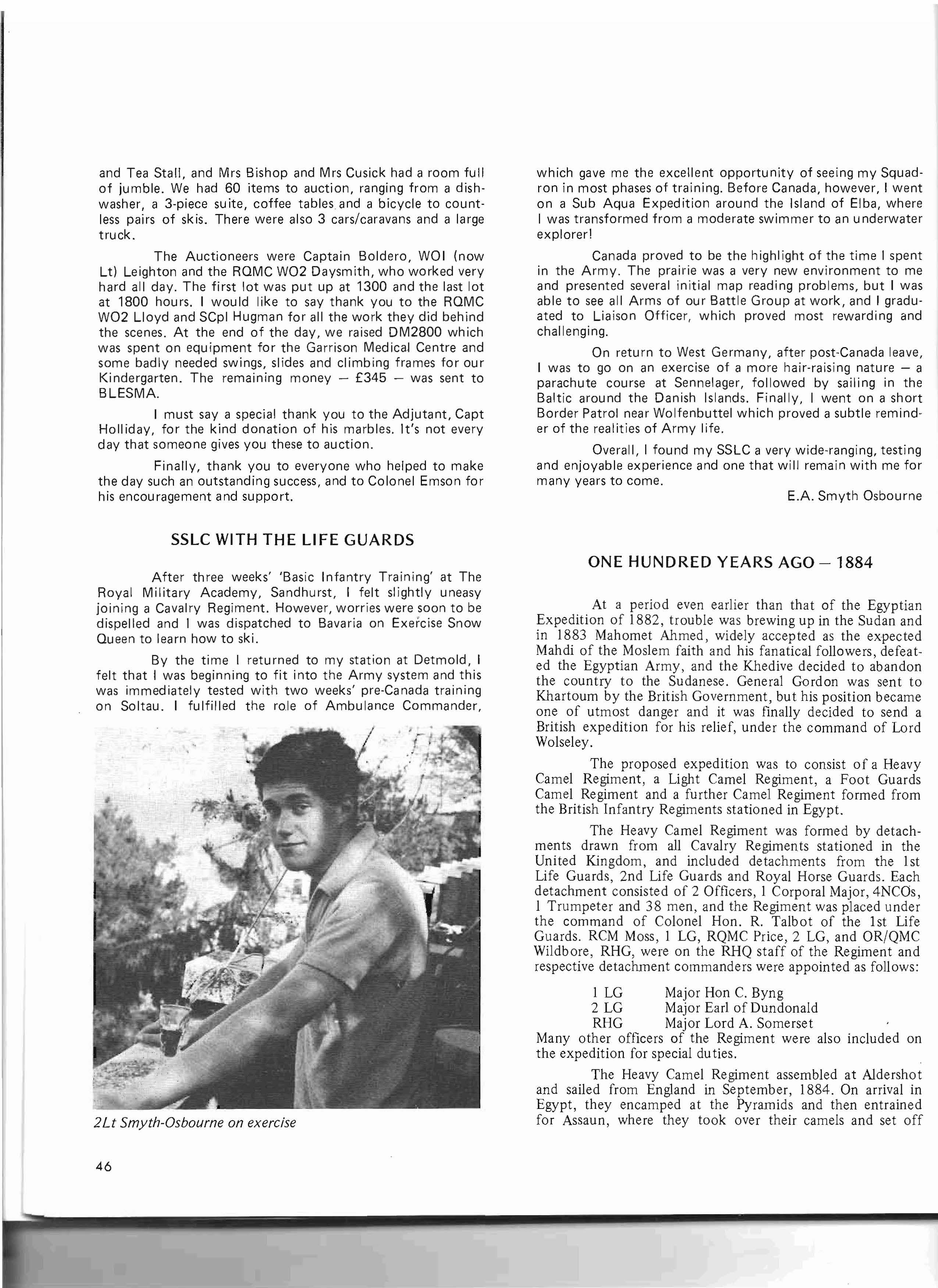
which gave me the excellent opportunity of seeing my Squadron in most phases of training. Before Canada, however, I went on a Sub Aqua Expedition around the Island of Elba, where I was transformed from a moderate swimmer to an underwater explorer!
Canada proved to be the highlight of the time I spent in the Army. The prairie was a very new environment to me and presented several initial map reading problems, but I was able to see all Arms of our Battle Group at work, and I graduated to Liaison Officer, which proved most rewarding and challenging.
On return to West Germany, after post-Canada leave, I was to go on an exercise of a more hair-raising nature -a parachute course at Sennelager, followed by sailing in the Baltic around the Danish Islands. Finally, I went on a short Border Patrol near Wolfenbuttel which proved a subtle reminder of the realities of Army life.
Overall, I found my SSLC a very wide-ranging, testing and enjoyable experience and one that will remain with me for many years to come.
E.A. Smyth Osbourne
At a period even earlier than that of the Egyptian Expedition of 1882, trouble was brewing up in the Sudan and in 1883 Mahomet Ahmed, widely accepted as the expected Mahdi of the Moslem faith and his fanatical followers, defeated the Egyptian Army, and the Khedive decided to abandon the country to the Sudanese. General Gardon was sent to Khartoum by the British Government, but his position became one of utmost danger and it was finally decided to send a British expedition for his relief, under the command of Lord Wolseley.
The proposed expedition was to consist of a Heavy Camel Regiment, a Light Camel Regiment, a Foot Guards Camel Regiment and a further Camel Regiment formed from the British Infantry Regiments stationed in Egypt.
The Heavy Camel Regiment was formed by detachments drawn from all Cavalry Regiments stationed in the United Kingdom, and included detachments from the 1st Life Guards, 2nd Life Guards and Royal Horse Guards. Each detachment consisted of 2 Officers, 1 Corporal Major, 4NCOs, I Trumpeter and 38 men, and the Regiment was placed under the command of Colonel Hon. R. Talbot of the 1st Life Guards. RCM Moss, 1 LG, RQMC Price, 2 LG, and OR/QMC Wildbore, RHG, were on the RHQ staff of the Regiment and respective detachment commanders were appointed as follows:
1 LG Major Hon C. Byng
2 LG Major Earl of Dundonald
RHG Major Lord A. Somerset
Many other officers of the Regiment were also included on the expedition for special du ties.
The Heavy Camel Regiment assembled at Aldershot and sailed from England in September, 1884. On arrival in Egypt, they encamped at the Pyramids and then entrained for Assaun, where they took over their camels and set off
by boat up the Nile. Howevl<.r, progress was slow and it was decided to make a dash acroSS the desert, so they set off on a journey of 150 miles without tents or baggage. All went well until they reached the wells at Abu Klea on 17th January 1885, where they encountered a large force of Arabs. The British force formed the traditional "Square" and fierce fighting took place against an enemy, estimated to number 16,000. The enemy force sustained losses of over 1,100 and the British force had 74 killed and 94 wounded. After the battle, British force moved on, and two days later again sighted the Nile", but had to fight their way to the banks. On 28th January, news was received that Khartoum had been taken by the Mahdi 2 days previously, and that General Gordon had.been killed. Further encounters with the dervishes took place, but in May 1885 the British Government decided to evacuate the Sudan and to leave the Sudanese to their own devices until 1898, when Lord Kitchener and his force avenged the death of General Gordon.
The Heavy Camel Regiment returned to Alexandria and on 3rd July embarked, arriving off Cowes on 14th July where they were inspected and welcomed home by Her Majesty Queen Victoria, prior to entraining for London where they were greeted by the Duke of Cambridge. The Household Cavalry detachments were then inspected by the Prince of Wales at Regents Park Barracks prior to rejoining their respective Regiments. Two months later, the 2nd Life Guard detachment serving at Windsor had the supreme distinction of having campaign medals affixed to their tunics by their beloved Sovereign.
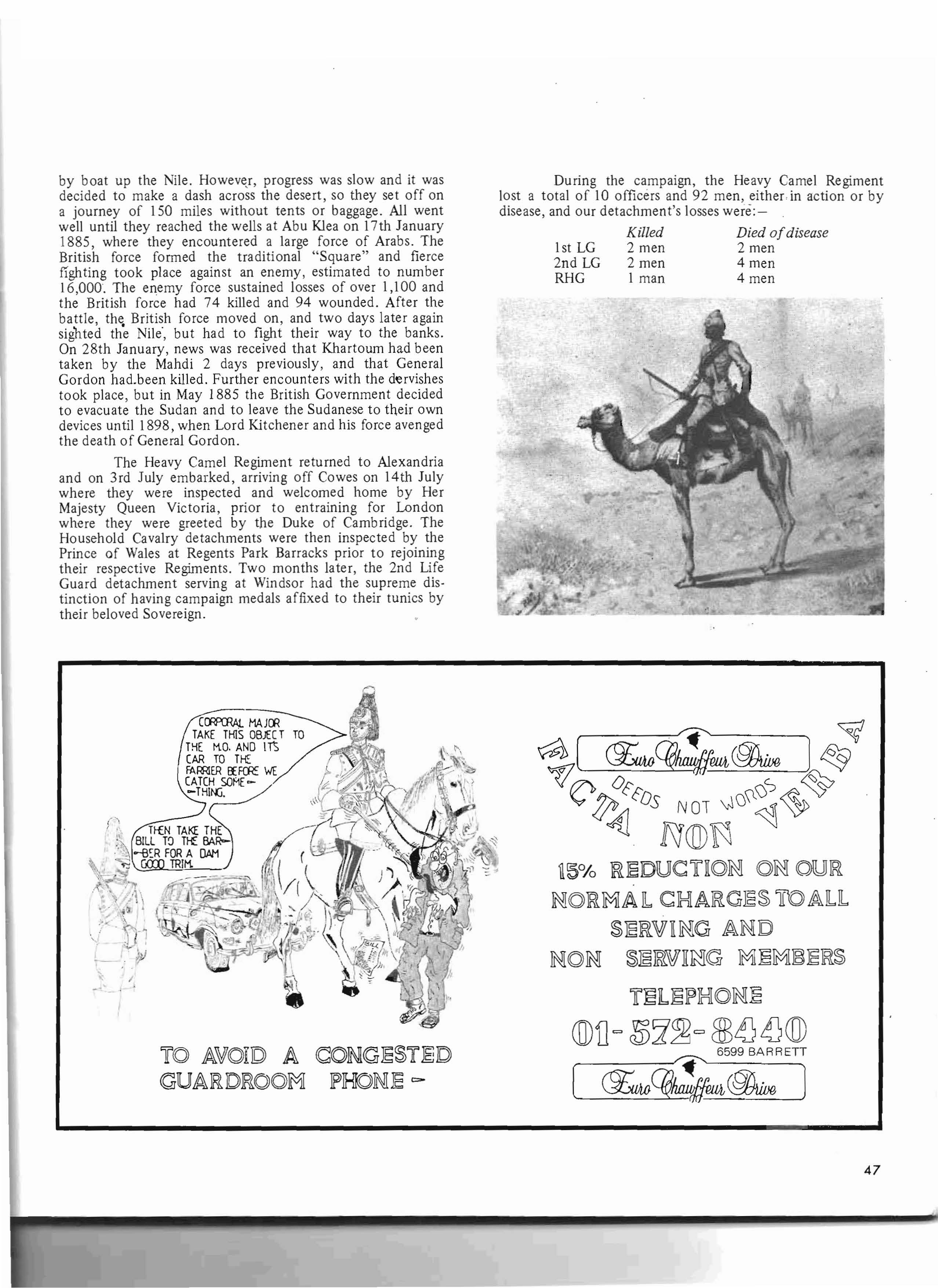
During the campaign, the Heavy Camel Regiment lost a total of 10 officers and 92 men, either, in action or by disease, and our detachment's losses were:
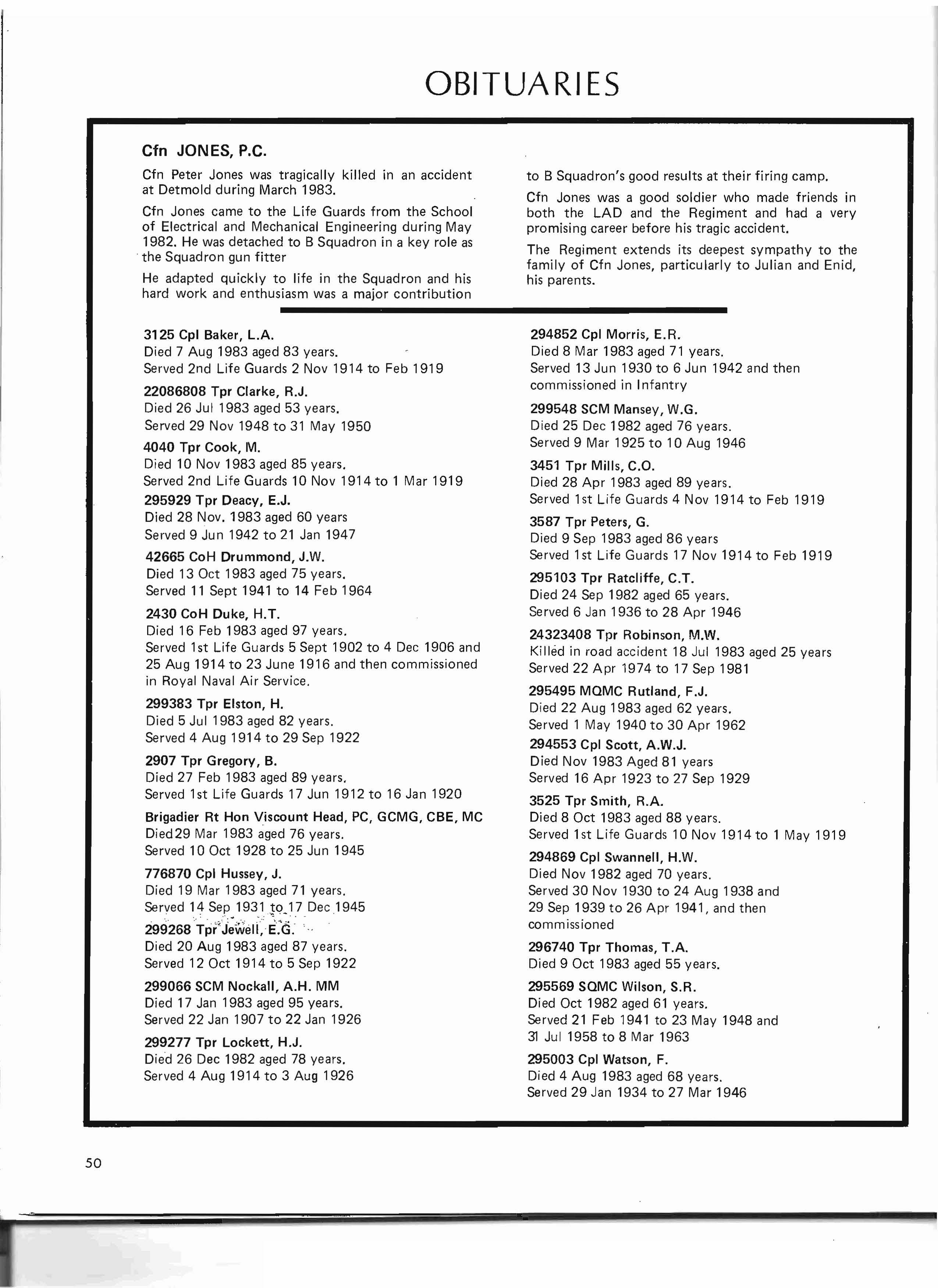
Cfn Peter Jones was tragically killed in an accident at Detmold during March 1983.
Cfn Jones came to the Life Guards from the School of Electrical and Mechanical Engineering during May 1982. He was detached to B Squadron in a key role as . the Squadron gun fitter
He adapted quickly to life in the Squadron and his hard work and enthusiasm was a major contribution
3125 Cpl Baker, L.A.
Died 7 Aug 1983 aged 83 years.
Served 2nd Life Guards 2 Nov 1914 to Feb 1919
22086808 Tpr Clarke, R.J.
Died 26 Jul 1983 aged 53 years.
Served 29 Nov 1948 to 31 May 1950
4040 Tpr Cook, M.
Died 10 Nov 1983 aged 85 years.
Served 2nd Life Guards 10 Nov 1914 to 1 Mar 1919
295929 Tpr Deacy, E.J.
Died 28 Nov. 1983 aged 60 years
Served 9 Jun 1942 to 21 Jan 1947
42665 CoH Drummond, J.W.
Died 13 Gct 1983 aged 75 years.
Served 11 Sept 1941 to 14 Feb 1964
2430 CoH Duke, H.T.
Died 16 Feb 1983 aged 97 years.
Served 1st Life Guards 5 Sept 1902 to 4 Dec 1906 and 25 Aug 1914 to 23 June 1916 and then commissioned in Royal Naval Air Service.
299383 Tpr Elston, H.
Died 5 Jul 1983 aged 82 years.
Served 4 Aug 1914 to 29 Sep 1922
2907 Tpr Gregory, B.
Died 27 Feb 1983 aged 89 years.
Served 1st Life Guards 17 Jun 1912 to 16 Jan 1920
Brigadier Rt Hon Viscount Head, PC, GCMG, CBE, MC
Died29 Mar 1983 aged 76 years.
Served 10 Gct 1928 to 25 Jun 1945
776870 Cpl Hussey, J.
Died 19 Mar 1983 aged 71 years.
Served 14 Sep 1931!oJ7 Dec1945
Died 20 Aug 1983 aged 87 years.
Served 12 Gct 1914 to 5 Sep 1922
299066 SCM Nockall, A.H. MM
Died 17 Jan 1983 aged 95 years.
Served 22 Jan 1907 to 22 Jan 1926
299277 Tpr Lockett, H .J.
Died 26 Dec 1982 aged 78 years.
Served 4 Aug 1914 to 3 Aug 1926
to B Squadron's good results at their firing camp.
Cfn Jones was a good soldier who made friends in both the LAD and the Regiment and had a very promising career before his tragic accident.
The Regiment extends its deepest sympathy to the family of Cfn Jones, particularly to Julian and Enid, his parents.
294852 Cpl Morris, E.R.
Died 8 Mar 1983 aged 71 years.
Served 13 Jun 1930 to 6 Jun 1942 and then commissioned in Infantry
299548 SCM Mansey, W.G.
Died 25 Dec 1982 aged 76 years.
Served 9 Mar 1925 to 10 Aug 1946
3451 Tpr Mills, C.O.
Died 28 Apr 1983 aged 89 years.
Served 1st Life Guards 4 Nov 1914 to Feb 1919
3587 Tpr Peters, G.
Died 9 Sep 1983 aged 86 years
Served 1st Life Guards 17 Nov 1914 to Feb 1919
295103 Tpr Ratcliffe, C.T.
Died 24 Sep 1982 aged 65 years.
Served 6 Jan 1936 to 28 Apr 1946
24323408 Tpr Robinson, M.W.
Killed in road accident 18 Jul 1983 aged 25 years
Served 22Apr 1974 to 17Sep 1981
295495 MOMC Rutland, F.J.
Died 22 Aug 1983 aged 62 years.
Served 1 May 1940 to 30 Apr 1962
294553 Cpl Scott, A.W.J.
Died Nov 1983 Aged 81 years
Served 16Apr 1923to27Sep 1929
3525 Tpr Smith, R.A.
Died 8 Gct 1983 aged 88 years.
Served 1st Life Guards 10 Nov 1914to 1 May 1919
294869 Cpl Swannell, H.W.
Died Nov 1982 aged 70 years.
Served 30 Nov 1930 to 24 Aug 1938 and 29 Sep 1939 to 26 Apr 1941, and then comm iss ioned
296740 Tpr Thomas, T.A.
Died 9 Gct 1983 aged 55 years.
295569 SOMC Wilson, S.R.
Died Gct 1982 aged 61 years.
Served 21 Feb 1941 to 23 May 1948 and
31 Jul1958to8Mar 1963
295003 Cpl Watson, F.
Died 4 Aug 1983 aged 68 years.
Served 29 Jan 1934 to 27 Mar 1946
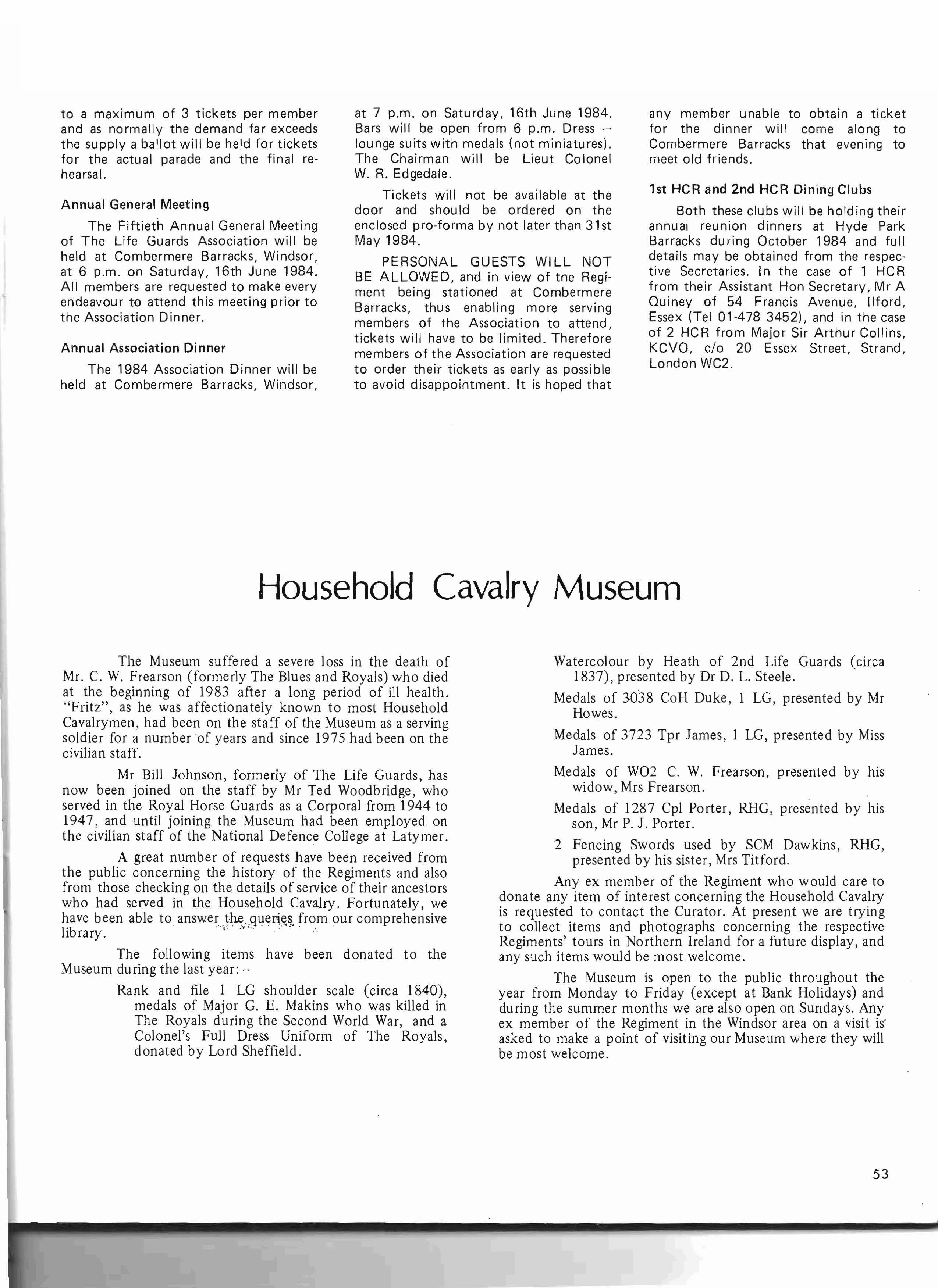
The Museum suffered a severe loss in the death of Watercolour by Heath of 2nd Life Guards (circa Mr. C. W. Frearson (formerly The Blues and Royals) who died 1837), presented by Dr D. L. Steele. at the beginning of 1983 after a long period of ill health.
Medals of 3D38 CoH Duke, 1 LG, presented by Mr "Fritz", as he was affectionately known to most Household Howes. Cavalrymen, had been on the staff of the Museum as a serving soldier for a number of years and since 1975 had been on the
Medals of 3723 Tpr James, 1 LG, presented by Miss civilian staff. James.
Medals of W02 C. W. Frearson, presented by his now been joined on the staff by Mr Ted Woodbridge, who
Mr Bill Johnson, formerly of The Life Guards, has widow, Mrs Frearson. served in the Royal Horse Guards as a Corporal from 1944 to
Medals of 1287 Cpl Porter, RHG, presented by his 1947, and until joining the Museum had been employed on son, Mr P. J. Porter. the civilian staff of the National Defence College at Latymer.
2 Fencing Swords used by SCM Dawkins, RHG,
A great number of requests have been received from presented by his sister, Mrs Titford. the public concerning the history of the Regiments and also
Any ex member of the Regiment who would care to from those checking on the, details of service of their ancestors donate any item of interest concerning the Household Cavalry who had served in the Household Cavalry. Fortunately, we is requested to contact the Curator. At present we are trying have been able to answer from our comprehensive library.' ..''' to collect items and photographs concerning the respective Regiments' tours in Northern Ireland for a future display, and
The following items have been donated to the any such items would be most welcome. Museum during the last year:
The Museum is open to the public throughou t the Rank and file 1 LG shoulder scale (circa 1840), year from Monday to Friday (except at Bank Holidays) and medals of Major G. E. Makins who was killed in during the summer months we are also open on Sundays. Any The Royals during the Second World War, and a ex member of the Regiment in the Windsor area on a visit is' Colonel's Full Dress Uniform of The Royals, asked to make a point of visiting our Museum where they will donated by Lord Sheffield. be most welcome.
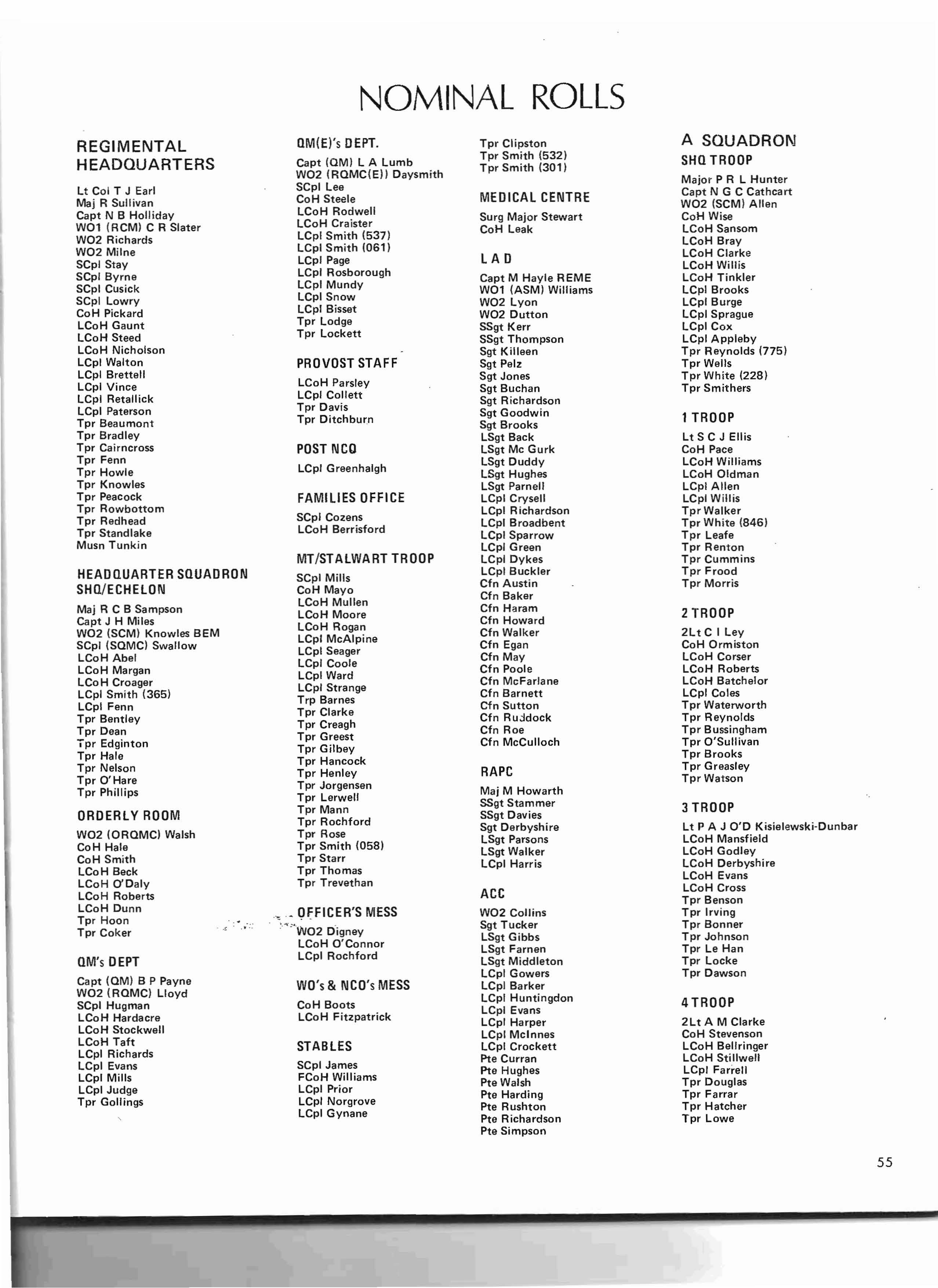
Lt Col TJ Earl
Maj R Sullivan
Capt N B Holliday
W01 (RCM) C R Slater
W02 Richards
W02 Milne
SCpl Stay
SCpl Byrne
SCpl Cusick
SCpl Lowry
CoH Pickard
LCoH Gaunt
LCoH Steed
LCoH Nicholson
LCpl Walton
LCpl Brettell
LCpl Vince
LCpl Retallick
LCpl Paterson
Tpr Beaumont
Tpr Bradley
T pr Ca irncross
Tpr Fenn
Tpr Howle
Tpr Knowles
Tpr Peacock
Tpr Rowbottom
Tpr Redhead
Tpr Standlake
Musn Tunkin
HEAD QUARTER SQUADRON SHQ/ECHELON
Maj R C B Sampson
Capt J H Miles
W02 (SCM) Knowlas BEM
SCpl (SOMC) Swallow
LCoH Abel
LCoH Margan
LCo H Croager
LCpl Smith (365)
LCpl Fenn
Tpr Bentley
Tpr Dean
'pr Edginton
Tpr Hale
Tpr Nelson
Tpr O'Hare
Tpr Phillips
ORDERLY ROOM
W02 (OROMC) Walsh
CoH Hale
CoH Smith
LCoH Beck
LCoH O'Daly
LCoH Roberts
LCoH Dunn
Tpr Hoon
Tpr Coker
QM's DEPT
Capt (OM) BP Payne
W02 (RaMC) L10yd
SCpl Hugman
LCoH Hardacre
LCoH Stockwell
LCoH Taft
LCpl Richards
LCpl Evans
LCpl Mills
LCpl Judge
Tpr Gollings
QM(El's DEPT.
Capt (OM) LA Lumb
W02 (ROMC(E» Daysmith
SCpl Lee
CoH Steele
LCoH Rodwell
LCoH Craister
LCpl Smith (537)
LCpl Smith (061)
LCpl Page
LCpl Rosborough
LCpl Mundy
LCplSnow
LCpl Bisset
Tpr Lodge
Tpr Lockett
PROVOST STAFF
LCoH Parsley
LCpl Collett
Tpr Davis
Tpr Ditchbur.n
POST NCO
LCpl Greenhalgh
FAMILIES OFFICE
SCpl Cozens
LCoH Berristord
MT/STALWART TROOP
SCpl Mills
CoH Mayo
LCoH Mullen
LCoH Moore
LCoH Rogan
LCpl McAlpine
LCpl Seager
LCpl Coole
LCpl Ward
LCpl Strange
Trp Barnes
Tpr Clarke
Tpr Creagh
Tpr Greest
Tpr Gilbey
Tpr Hancock
Tpr Henley
Tpr Jorgensen
Tpr Lerwell
Tpr Mann
Tpr Rochtord
Tpr Rose
Tpr Smith (058)
Tpr Starr
Tpr Thomas
Tpr Trevethan
"'_ MESS
'W02 D'igney
LCoH O'Connor
LCpl Rochtord
WO's & NCO's MESS
CoH Boots
LCoH Fitzpatrick
SCpl James
FCoH Williams
LCpl Prior
LCpl Norgrove
LCpl Gynane
Tpr Clipston
Tpr Smith (532)
Tpr Smith (301)
MEDICAL CENTRE
Surg Major Stewart
CoH Leak
LAD
Ca pt M Hayle REME
W01 (ASM) Williams
W02 Lyon
W02Dutton
SSgt Kerr
SSgt Thompson
Sgt Killeen
Sgt Pelz
Sgt Jones
Sgt Buchan
Sgt R ichardson
Sgt Goodwin
Sgt Brooks
LSgt Back
LSgt Mc Gurk
LSgt Duddy
LSgt Hughes
LSgt Parnell
LCpl Crysell
LCpl Richardson
LCpl Broadbent
LCpl Sparrow
LCpl Green
LCpl Dykes
LCpl Buckler
Ctn Austin
Ctn Baker
Ctn Haram
Ctn Howard
Ctn Walker
Ctn Egan
Ctn May
Ctn Poole
Ctn McFarlane
Ctn Barnett
Cfn Sutton
Ctn RuJdock
Ctn Roe
Ctn McCulloch
Maj M Howarth
SSgt Stammer
SSgt Davies
Sgt Derbyshire
LSgt Parsons
LSgt Walker
LCpl Harris
ACC
W02 Coli ins
Sgt Tucker
LSgt Gibbs
LSgt Farnen
LSgt Middleton
LCpl Gowers
LCpl Barker
LCpl Huntingdon
LCpl Evans
LCpl Harper
LCpl Mclnnes
LCpl Crockett
Pte Curran
Pte Hughes
Pte Walsh
Pte Harding
Pte Rushton
Pte R icha rdso n
Pte Simpson
SHQ TROOP
Major P R L Hunter
Capt N G C Cathcart
W02 (SCMI Alien
CoH Wise
LCoH Sansom
LCoH Bray
LCoH Clarke
LCoH Willis
LCoH Tinkler
LCpl Brooks
LCpl Burge
LCpl Sprague
LCplCox
LCpl Appleby
Tpr Reynolds (775)
Tpr Wells
Tpr White (228)
Tpr Smithers
1 TROOP
Lt SCJ Ellis
CoH Pace
LCoH Williams
LCoH Oldman
LCpl Alien
LCpl Willis
TprWalker
Tpr White (846)
Tpr Leate
Tpr Renton
Tpr Cummins
Tpr Frood
Tpr Morris
2 TROOP
2LtC I Ley
CoH Ormiston
LCoH Corser
LCoH Roberts
LCoH Batchelor
LCpl Coles
Tpr Waterworth
Tpr Reynolds
Tpr Bussingham
Tpr O'Sullivan
Tpr Brooks
Tpr G reasley
Tpr Watson
3 TROOP
Lt P A J 0'0 Kisielewski-Dunbar
LCoH Manstield
LCoH Godley
LCoH Derbyshire
LCoH Evans
LCoH Cross
Tpr Benson
Tpr Irving
Tpr Bonner
Tpr Johnson
Tpr Le Han
Tpr Locke
Tpr Dawson
4TROOP
2Lt A M Clarke
CoH Stevenson
LCoH Bellringer
LCoH Stillwell
LCpl Farrell
Tpr Douglas
Tpr Farrar
Tpr Hatcher
Tpr Lowe
4 TROOP continued
Tpr Key
Tpr Carey
Tpr Warren
Tpr Carter
ECHELON TROOP
SCpl (SOMC) Belza
Co H Robertson
LCoH Wragg
LCoH Stiff
LCpl Moore
Tpr Bishop
Tpr Evans
Tpr Steele
Tpr Adams
Tpr Veomans
Tpr Frost
Tpr Barrett
LAD
SSgt McFarlane
Sgt Loftus
LSgt Bale
LSgt Billington
LSgt Davies
LSgt Medhurst
LCpl Mcllreavy
LCpl Crisp
LCplOldham
LCpl Horne
Cfn Chapman
Cfn Groves
Cfn Rietzler
SHG
IIfllljor The Hon N J Adderley
W02 (SCM) Rennie
CoH Carson
LCpl Hodge
LCpl Tate
LCpl Layzell
LCpl Lynne
LCpl Mallon
LCpl Taylor
LCpl Horner
LCpl Richards
Tpr Fickling
Tpr Howgate
Tpr Jacobi
Tpr Veughan
Tpr Willis
1 TROOP
CoH Gilbert
LCoH Varrow
LCoH Kidd
Tpr Broomfield
Tpr Butterfield
Tpr Carvell
Tpr Core
Tpr Hepple
Tpr Lindsay
Tpr Postance
Tpr Trinder
Tpr Till
2 TROOP
CoH Bagnall
LCoH Lewis
LCoH Jackson
LCoH Ormerod
LCpl Newton
LCpl Round
Tpr Bright
Tpr Brookes
Tpr Holden
Tpr Parsons
Tpr Stanley
Tpr Whittaker
Tpr Welsher
2Lt T Assheton
CoH Whatley
LCoH Liddell
LCoH Dangerfield
LCoH Kelland
LCpl Harrison
Tpr Bray
Tpr Cooling
Tpr Grantham
Tpr Laing
Tpr Nutt
Tpr Weeks
2Lt H A Ingham-Clark
CoH Jordan
LCoH Drennan
LCpl Williams
LCpl Hunter
Tpr Aslop
Tpr Dickinson
Tpr Dodsworth
Tpr Gray
TprJoy
Tpr Power
Tpr Varney
Tpr Woodford
SCpl (SOMC) Cruddace
LCoH Nicklin
LCoH Frampton - RHG/D
LCoH Engiish
LCoH Sharples
LCpl Maksymiw
Tpr Andrews
Tpr Bradie
Tpr Davenport
Tpr Hamill
Tpr Murphy
LAD
SSgt Marshall
Sgt Gilbert
Sgt Milne
Sgt Price
LSgt Rudd
LCpl James
LCpl Cartwright
LCpl Dale
LCpl Maher
LCpl Penberthy
LCpl Relins
Cfn Mason
Cfn Rossiter
Cfn Parker
C SQUADRON SHU
-MajOr C S K Anderson
Captain J H Perry-Warnes
SCM Willis BEM
CoH George
LCoH Bingham
LCoH Blowey
LCpl Webster
LCpl Rogers
LCpl Price
LCpl Willis
Tpr Tinsley
Tpr Bing
Tpr Dodsworth
Tpr Phillips
Tpr Turnic;jge
Tpr R isbridger
Tpr Nugent
Tpr Morris
1 TROOP
Lt J L Sunnucks
CoH Clarke
LCoH Tinsley
LCpl Reid
LCpl Welker
LCpl Miller
Tpr Toft
Tpr Cobb
Tpr Brooke
Tpr Underhay
Tpr Howle
Tpr Smith
2 TROOP
CoH Carter
LCoH Blunt
LCoH Sadler
LCpl Pugh
LCpl Jones
Tpr Squires
Tpr Alien
Tpr Harper
Tpr Corner
Tpr Scorer
Tpr Sandor
3 TROOP
CoH Marshall
LCoH Hawkins
LCoH White
LCpl Cripps
LCpl Taylor
LCpl Barry
Tpr Lambton
Tpr Gilbert
Tpr Keilty
Tpr Fisher
Tpr Hayes
Tpr McMullen
4 TROOP
Lt J W Stewart
LCoH Coe
LCoH Stanworth
LCoH Shone
LCpl Key
Tpr Rowe
Tpr Chap man
Tpr Knight
Tpr Cork
Tpr Mattison
Tpr Fraser
Tpr Clitheroe
ECHELON TROOP
SCpl (SOMC) Redford
LCoH Jones
LCoH Birkett
LCoH Murphy
LCpl Renshaw
LCpl Ford
Tpr Foster
Tpr Milis
Tpr Porter
Tpr Harvey
Tpr Parrington
Tpr Evans
Tpr McLeish
Tpr Chapman
Tpr Hopkins
LAD
SSgt Eagles
Sgt Ball
Sgt Readman
Sgt Barrett
LSgt Farquhar
LSgt Clarke
LSgt West
LCpl Humphreys
LCpl Vates
LCpl Brill
LCpl Kaye
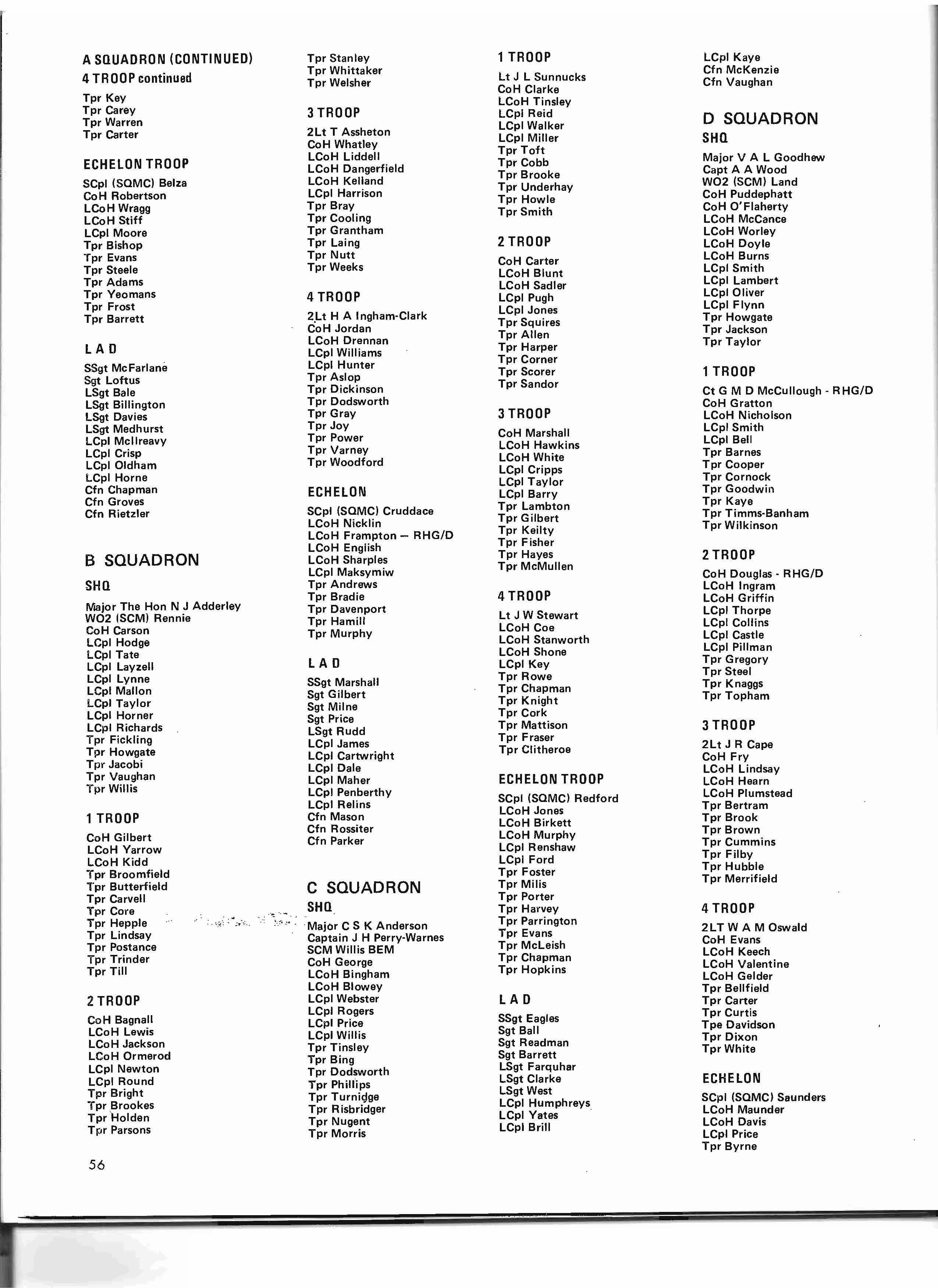
Cfn McKenzie
Cfn Vaughan
SHG
Major V A L Goodhew
Capt A A Wood
W02 (SCM) Land
CoH Puddephatt
CoH O'Flaherty
LCoH McCance
LCoH Worley
LCoH Doyle
LCoH Burns
LCpl Smith
LCpl Lambert
LCplOliver
LCpl Flynn
Tpr Howgate
Tpr Jackson
Tpr Taylor
1 TROOP
Ct GM D McCullough - RHG/D
CoH Gratton
LCoH Nicholson
LCpl Smith
LCpl Bell
Tpr Barnes
Tpr Cooper
Tpr Cornock
Tpr Goodwin
Tpr Kaye
Tpr Timms-Banham
Tpr Wilkinson
2 TROOP
CoH Douglas - RHG/D
LCoH Ingram
LCoH Griffin
LCpl Thorpe
LCpl Coli ins
LCpl Castle
LCpl Pillman
Tpr Gregory
Tpr Steel
Tpr Knaggs
Tpr Topham
3 TROOP
2Lt J R Cape
CoH Fry
LCoH Lindsay
LCoH Hearn
LCoH Plumstead
Tpr Bertram
Tpr Brook
Tpr Brown
Tpr Cummins
Tpr Filby
Tpr Hubble
Tpr Merrifield
4 TROOP
2LTWAMOswald
CoH Evans
LCoH Keech
LCoH Valentine
LCoH Gelder
Tpr Bellfield
Tpr Carter
Tpr Curtis
Tpe Davidson
Tpr Dixon
Tpr White
ECHELON
SCpl (SOMC) Saunders
LCoH Maunder
LCoH Davis
LCpl Price
Tpr Byrne
D SQUADRON (CONTINUED)
Tpr Meggison
Tpr Polley
Tpr Radford
LAD
SSgt Wickett
Sgt Hambersley
Sgt Tongs
LSgt Burrows
LSgt Baines
LSgt Winright
LSgt Phythian
LCpl Brewis
LCpl Burgess
LCpl Bateman
LCpl Thorn
LCpl Burns
Cfn Humble
RHQ
Lt Col C J D'Oyly
Capt H S J Scott
SHQ
F LCoH Jones (att Melton Mowbray)
QM's DEPT.
W02 (RaMC) Kelly
CoH Potts
CoH Shipway
LCoH Castelow
LCoH Cowling
LCoH Hadden
LCoH Thornton
LCpl Goodchild
LCpl Hazelwood
LCpl Lewis
LCpl Stevens
Tpr Archer
Tpr Crousher
Tpr Hartenfield
Tpr Hopewell
Tpr Laithwaite
W02 (OROMC) Etches
CoH Loftus
LCoH Coles
LCoH Davies
LCoH O'Daly
LCpl Harman
LCpl Langworthy
OFFICERS MESS
CoH Sutherland
LCpl Shipton
Tpr Kirkland ,
WO's & NCO's MESS
LCoH Bray
LCpl Corner
Tpr Dugard
Tpr Ellis
Tpr Todd
MT
LCpl Slade
Tpr Everett
Tpr Holland
Tpr Ritchie
Tpr Wibberley
REGIMENTAL PROVOST
CoH Davey
LCpl Huskisson
LCpl Leszczar
LCpl Smith
MED I CALCENTR E
CoH Wolczynski
LCpl Thomas
Tpr Tanner
Lt Col A Jackson
SCpl Burns
CoH Flaherty
LCoH Lewis
LCoH Maxwell
LCpl Thomas
LCpl Waygood
SCpl FLory
CoH Scott
CoH Howard
LCoH Norcombe
LCpl Cole
Tpr Arnold
Tpr Hodder
Tpr Hood
Tpr Hutchison
Tpr Stevenson
Tpr Tabony
Tpr Well er
Tpr Varley
Tpr Doane
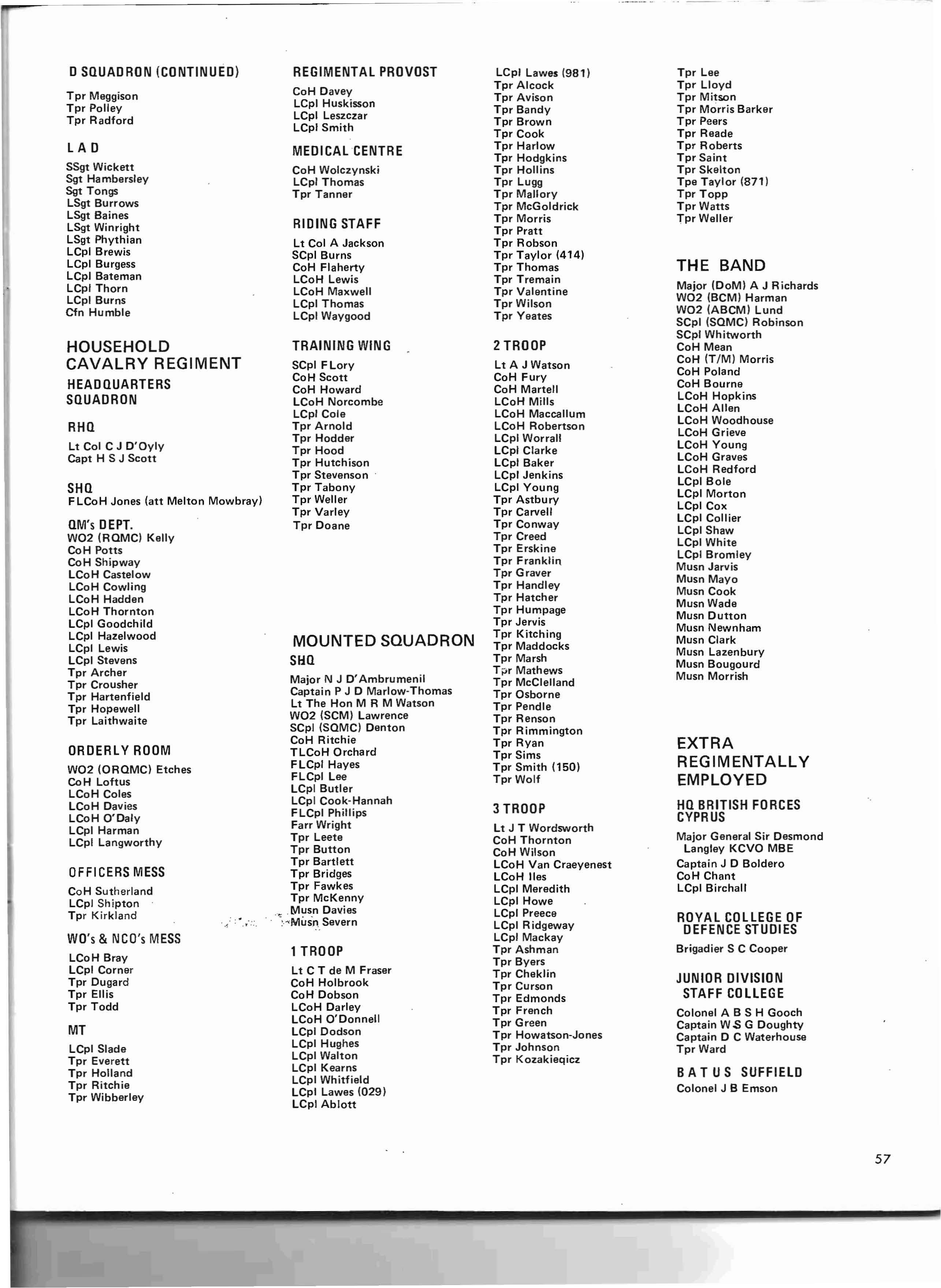
SI::IQ
Major N J D' Ambrumenil
Captain P J D Marlow-Thomas
Lt The Hon M R M Watson
W02 (SCM) Lawrence
SCpl (SOMC) Denton
CoH Ritchie
TLCoH Orchard
FLCpl Hayes
FLCpl Lee
LCpl Butler
LCpl Cook-Hannah
FLCpl Phillips
Farr Wright
Tpr Leete
Tpr Button
Tpr Bartlett
Tpr Bridges
Tpr Fawkes
Tpr McKenny
Musn Dallies Severn
1 TROOP
Lt CT de M Fraser
CoH Holbrook
CoH Dobson
LCoH Darley
LCoH O'Donnel1
LCpl Dodson
LCpl Hughes
LCpl Walton
LCpl Kearns
LCpl Whitfield
LCpl Lawes (029)
LCpl Ablott
LCpl Lawes (981)
Tpr Alcock
Tpr Avison
Tpr Bandy
Tpr Brown
Tpr Cook
Tpr Harlow
Tpr Hodgkins
Tpr Hollins
Tpr Lugg
Tpr Mallory
Tpr McGoldrick
Tpr Morris
Tpr Pratt
Tpr Robson
Tpr Taylor (414)
Tpr Thomas
Tpr Tremain
Tpr Valentine
Tpr Wilson
Tpr Yeates
2 TROOP
Lt A J Watson
CoH Fury
CoH Martell
LCoH Mills
LCoH Maccallum
LCoH Robertson
LCpl Worrall
LCpl Clarke
LCpl Baker
LCpl Jenkins
LCpl Young
Tpr Astbury
Tpr Carvell
Tpr Conway
Tpr Creed
Tpr Erskine
Tpr Franklin
Tpr Graver
Tpr Handley
Tpr Hatcher
Tpr Humpage
Tpr Jervis
Tpr Kitching
Tpr Maddocks
Tpr Marsh
Tin Mathews
Tpr McClelland
Tpr Osborne
Tpr Pendle
Tpr Renson
Tpr Rimmington
Tpr Ryan
Tpr Sims
Tpr Smith (150)
Tpr Wolf
3 TROOP
Lt J T Wordsworth
CoH Thornton
CoH Wilson
LCoH Van Craeyenest
LCoH lies
LCpl Meredith
LCplHowe
LCpl Preece
LCpl R idgeway
LCpl Mackay
Tpr Ashman
Tpr Byers
Tpr Cheklin
Tpr Curson
Tpr Edmonds
Tpr French
Tpr Green
Tpr Howatson-Jones
Tpr Johnson
Tpr Kozakieqicz
Tpr Lee
Tpr L10yd
Tpr Mitson
Tpr Morris Barker
Tpr Peers
Tpr Reade
Tpr Roberts
Tpr Saint
Tpr Skelton
Tpe Taylor (871)
Tpr Topp
Tpr Watts
TprWeller
Major (DoM) A J Richards
W02 (BCM) Harman
W02 (ABCM) Lund
SCpl (SOMC) Robinson
SCpl Whitworth
CoH Mean
CoH (T/M) Morris
CoH Poland
CoH Bourne
LCoH Hopkins
LCoH Alien
LCoH Woodhouse
LCoH Grieve
LCoH Young
LCoH Graves
LCoH Redford
LCpl Bole
LCpl Morton
LCplCox
LCpl Collier
LCpl Shaw
LCpl White
LCpl Bromley
Musn Jarvis
Musn Mayo
Musn Cook
Musn Wade
Musn Dutton
Musn Newnham
Musn Clark
Musn Lazenbury
Musn Bougourd
Musn Morrish
HQ BRITISH FORCES CYPRUS
Major General Sir Desmond
Langley KCVO MBE
Captain J D Boldero
CoH Chant
LCpl Birchall
ROYAL COLLEGE OF DEFENCE STUDIES
Brigadier S C Cooper
JUNIOR DIVISION
STAFF COLLEGE
Colonel A B S H Gooch
Captain W S G Doughty
Captain D C Waterhouse
Tpr Ward
BATUS SUFFIELD
Colonel J B Emson
EMPLOYED (Continued)
MINISTRY OF DEFENCE
PGW(A)
Major C J Simpson Gee
DOAE
Major J R Bayley
MS(SB)
Major A P De Ritter
ROYAL SCHOOL OF ARTILLERY
Major CS Harcourt-Smith
RHO HOUSEHOLD CAVALRY
Major R J Morrisey Paine
W01 (SC) A M Cherrington
CoH McKenzie
CoH Carrington
CoH Kallaste
CoH Dean
CoH Charlett
LCoH O'Neill
LCoH Preston
LCpl McSherry
LCpl Mitchell
LCpl Lanahan
HO 1 ARMOURED DIVISION
Major J W M Ellery
ARMY STAFF COURSE
Major PS W F Falkner
HO 1 INFANTRY BRIGADE
Major S D G Vetch
HO SOUTH EAST DISTRICT
Captain I S Forbes-Cockell
RMAS .
Captain C H N Graham
SCpl Johnston
LCpl Atyer
LCpl Sands
RAC CENTRE
ARMOUR SCHOOL
Captain H D Dyson - LAIC Jan. 84
HO DRAC
W01 Docherty
D & M SCHOOL
SCpl Collins
SCpl Davies
GUNNERY SCHOOL
SCpl Lodge
CoH Thakston
RAC SALES TEAM
CoH Jeram
ATDU
LCoH Keyworth
HO 8 INFANTRY BRIGADE
Lt GG E Stibbe
Lt T J K Faulkner
Lt M F Eastwood
CoH Hichman
CoH Erg
CoH Snowden
CoH Guiney
LCoH Schubert
LCoH Hartie
LCoH Alien
LCoH Smith (588)
LCoH Hoskins
LCoH Parkhurst
LCoH Diggle
LCoH Wilde
LCoH Pringle
LCoH Cumming
LCoH Camp
LCpl Murphy
LCpl McNeill
Tpr Ashton
Tpr Phillpott
Tpr Ogier
Tpr Hall
Tpr Robinson
EXETER UNIVERSITY
2Lt C N Mitford-Slade
CAMBRIDGE UNIVERSITY
2Lt M C van der Lande
StANDREWS UNIVERSITY
2Lt E A Smythe-Osbourne
HO 1 BR CORPS
Major J L Morris
APSG - RYSC Edinburgh
Captain A Kelly
RAVC Training Centre
Captain J L Hewitt
Lt B J McKie
SCpl Sanderson
THE BLUES AND ROYALS
Lt J Leighton
CoH Renton
Tpr Bartlett
Tpr Wrightson
JUNIOR LEADERS REGIMENT RAC
W01 (RCM) J D Knowles
SCpl Jones CoH Windeback CoH McBride CoH McDarmott
MVEE (K)
W01 (RCM) G C G Keeys
W02 Lawson
MVEE (C)
W01 (RCM) RA McGloughlin
W01 (RaMC) D Hutchings
RARDE
W02 Whyte
SULTAN OF OMAN'S LAND FORCES
W02 Mead
SCplCoffey
CoH Wright
RAC GUNNERY WING BAOR
HOUSEHOLD CAVALRY CAREERS OFFICE
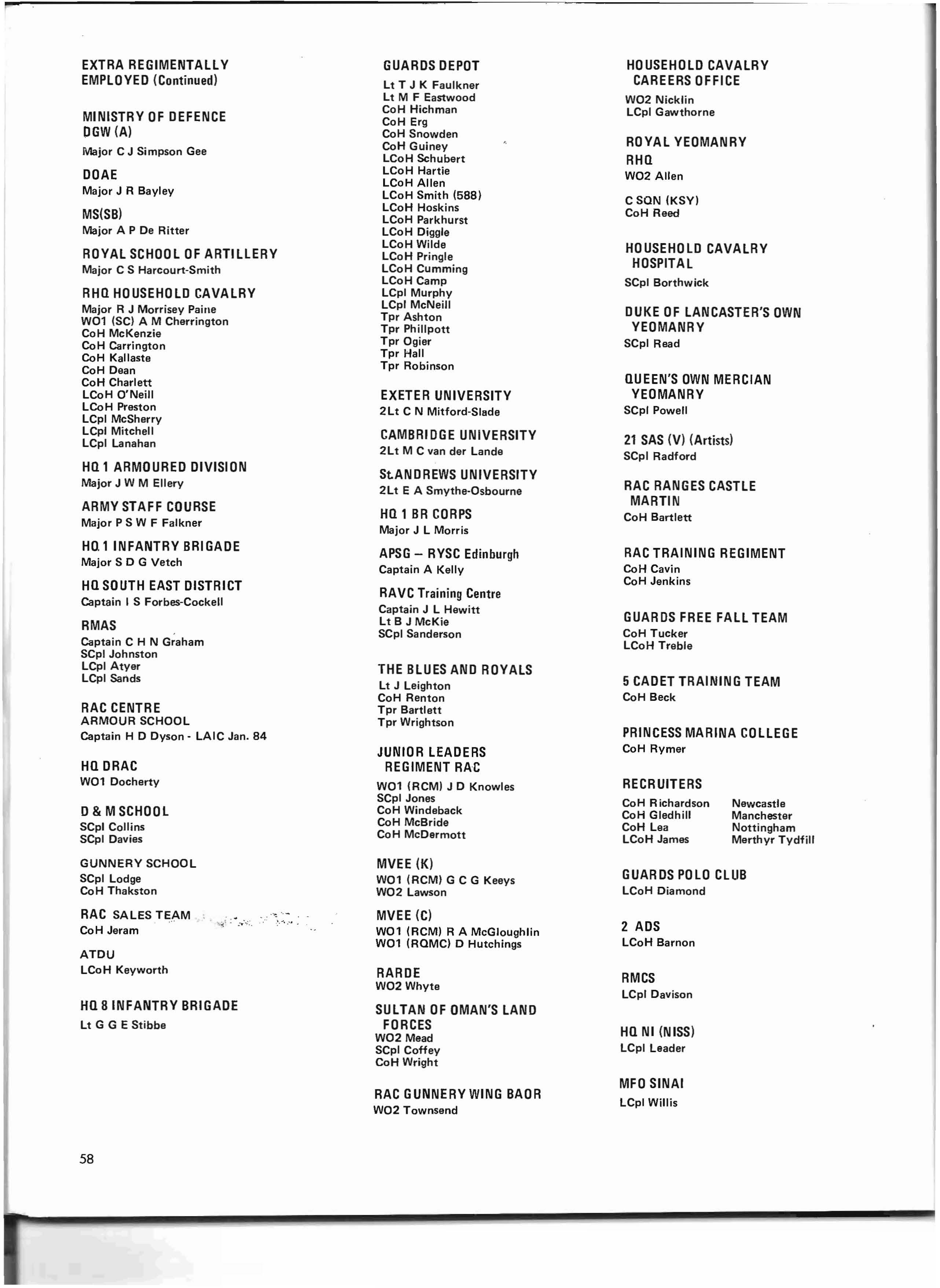
W02 T ownsend
W02 Nicklin
LCpl Gawthorne
ROYAL YEOMANRY
RHO
W02 Alien
CSON (KSY)
CoH Reed
HOUSEHOLD CAVALRY HOSPITAL
SCpl Borthwick
DUKE OF LANCASTER'S OWN YEOMANRY
SCpl Read
OUEEN'S OWN MERCIAN YEOMANRY
SCpl Powell
21 SAS (V) (Artists)
SCpl Radford
RAC RANGES CASTLE
MARTIN
CoH Bartlett
RAC TRAINING REGIMENT
CoH Cavin
CoH Jenkins
GUARDS FREE FALL TEAM
CoH Tucker
LCoH Treble
5 CADET TRAINING TEAM
CoH Beck
PRINCESS MARINA COLLEGE
CoH Rymer
RECRUITERS
CoH R ichardson Newcastle
CoH Gledhill Manchester
CoH Lea Nottingham
LCoH James Merthyr Tydfill
GUARDS POLO CLUB
LCoH Diamond
2 ADS
LCoH Barnon
RMCS
LCpl Davison
HO NI (NISS)
LCpl Leader
MFO SINAI
LCpl Willis